



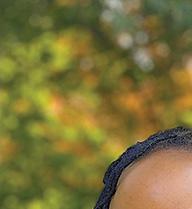
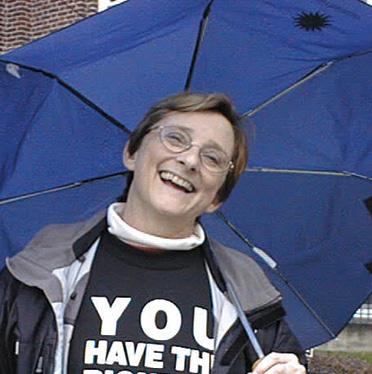
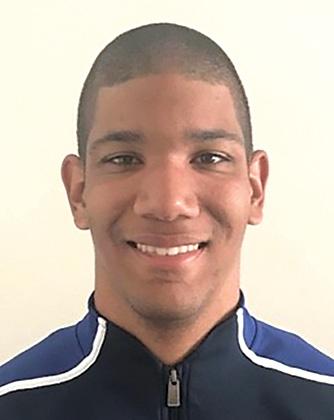
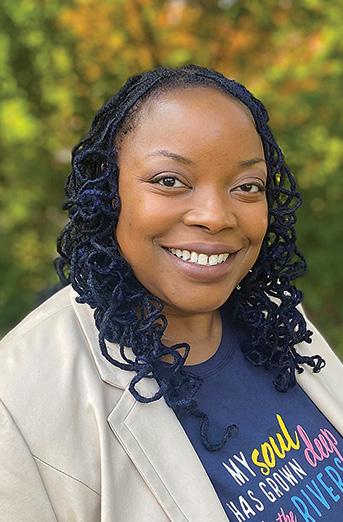
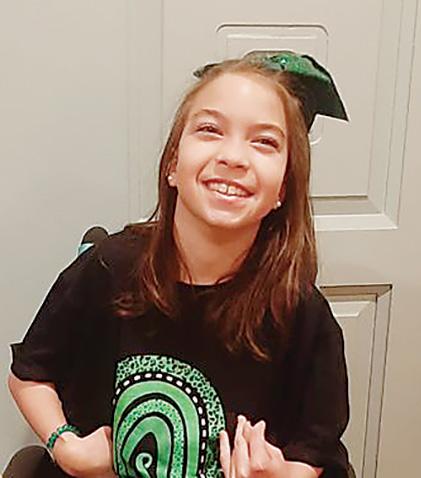
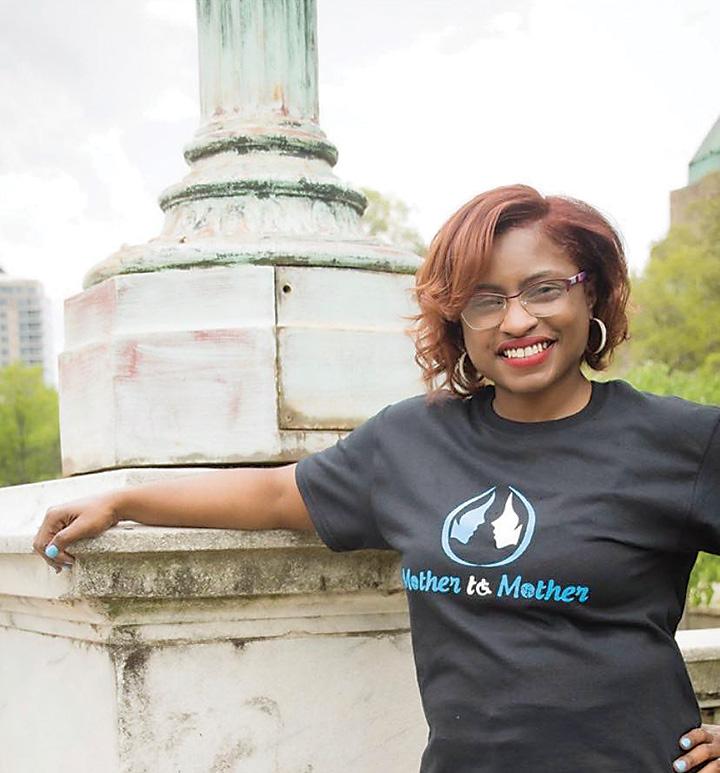
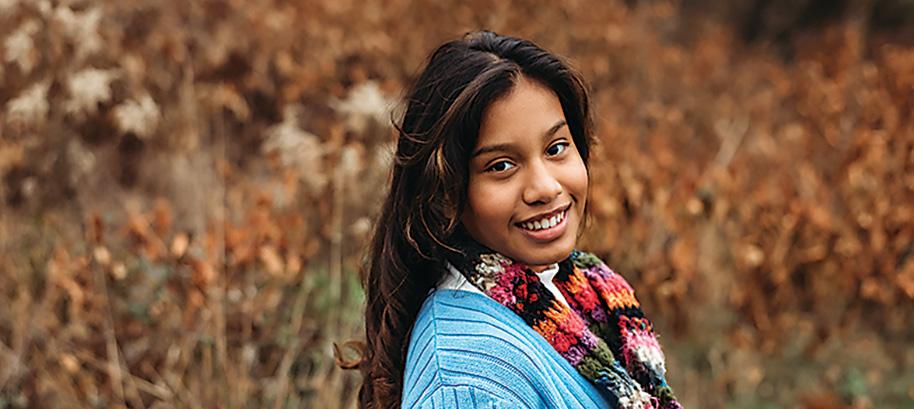

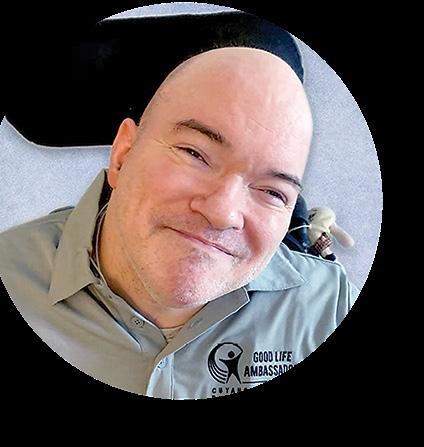
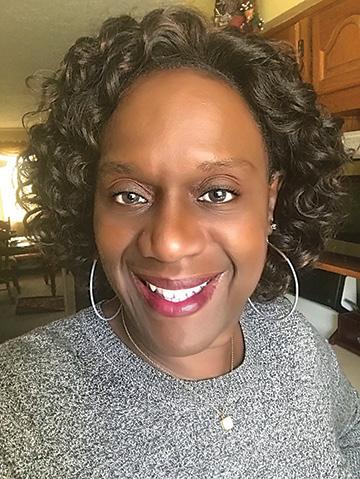
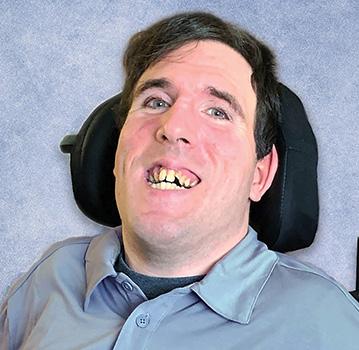
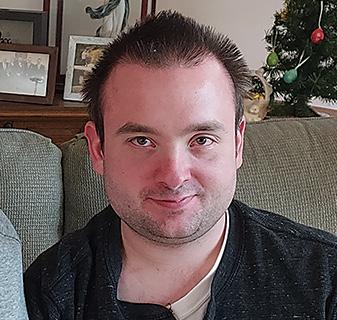
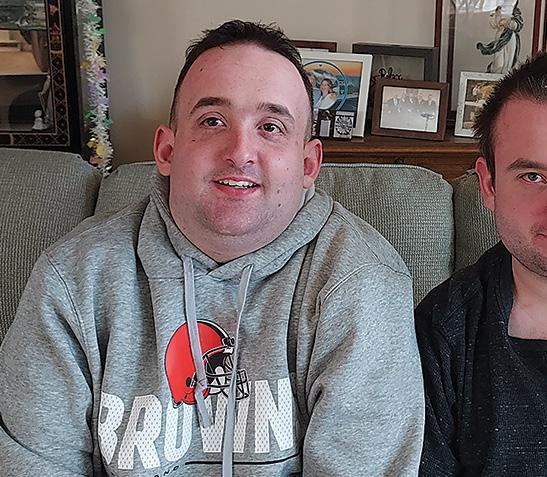
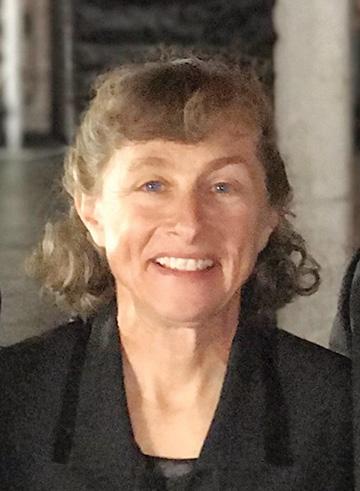
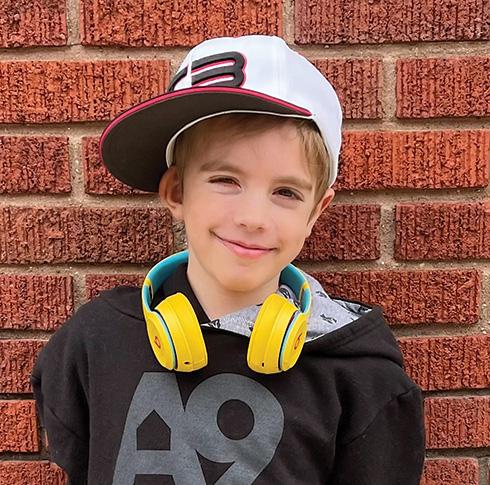
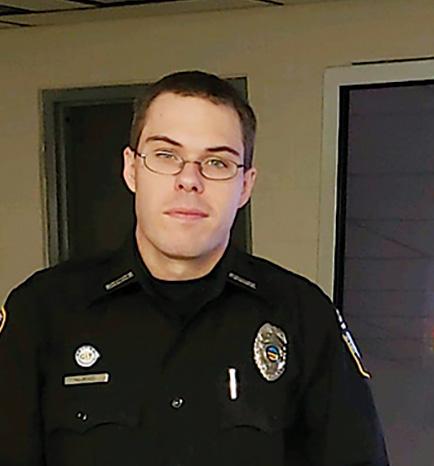
FREE 2022-23 Northeast Ohio Edition BROUGHT TO YOU BY NC J W CLE STRONG WOMEN POWERFUL VOICES Vacationing in Ohio An Accessible Destination Joy of Creating Arts for All A Resource for Individuals with Special Needs and Their Families Celebrating a Decade of Helping the Community YEARS CHAMPIONS Honoring PLUS
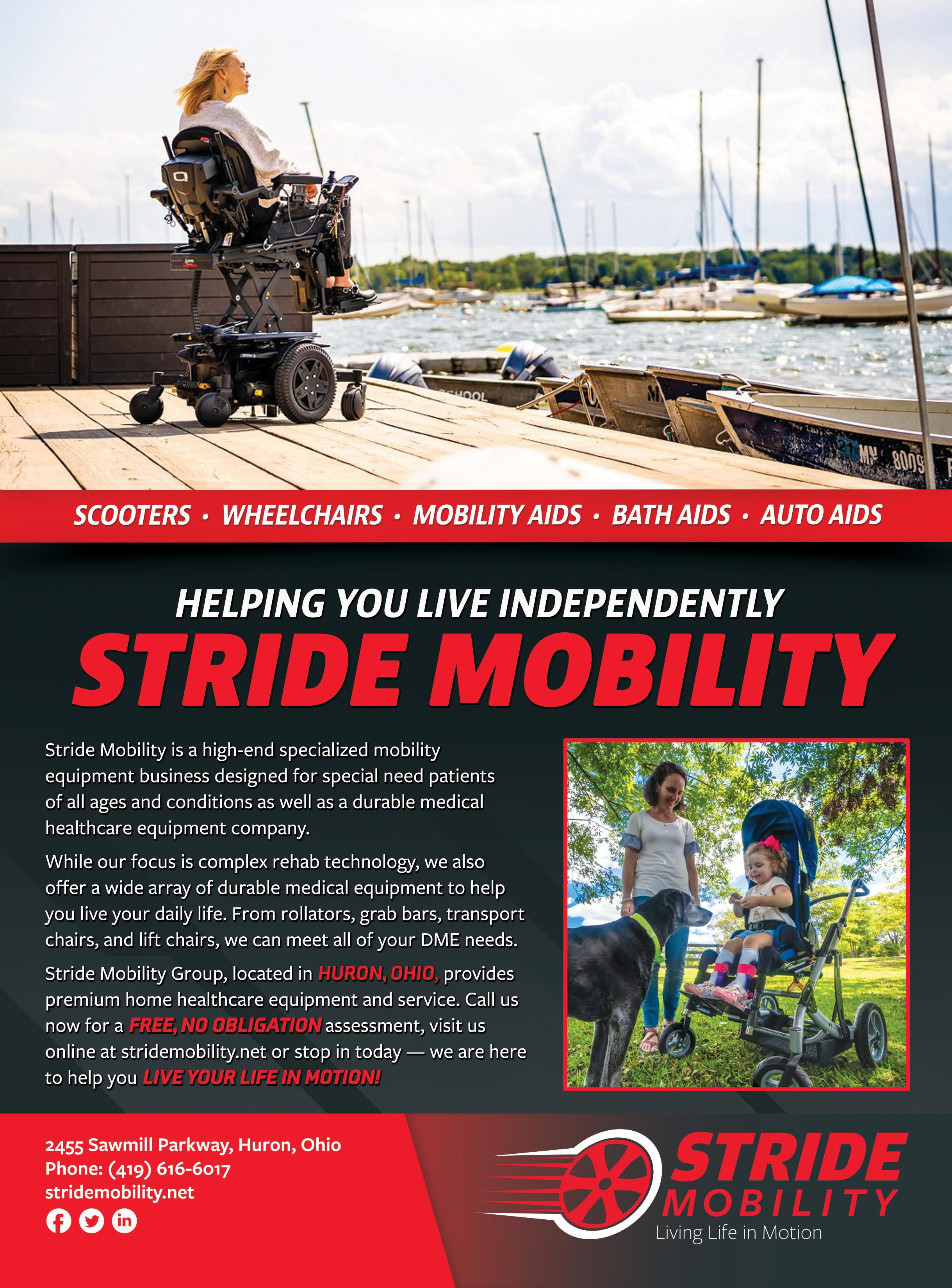
ON THE COVER : CELEBRATION OF 10 YEARS AND HONORING CHAMPIONS.
CELEBRATION OF CHAMPIONS
There was 15 champions honored at the 2022 ceremony. Read their stories and learn why they were honored.
FEATURES
32
LIVESPECIAL.COM
10 YEARS
Learn about how its helped the community of people and families with special needs for the past decade.
DEPARTMENTS
EXECUTIVE DIRECTOR AND PUBLISHER LETTER
04 A glance back and look forward to future.
WORTH NOTING
06 Dyslexia laws change for early intervention, useful gadgets, new playground and get inspired by these special artists. Also, we remember Jeffrey Friedman and his legacy.
PEOPLE TO KNOW
Meet two indivduals who are helping the environment and people with special needs.
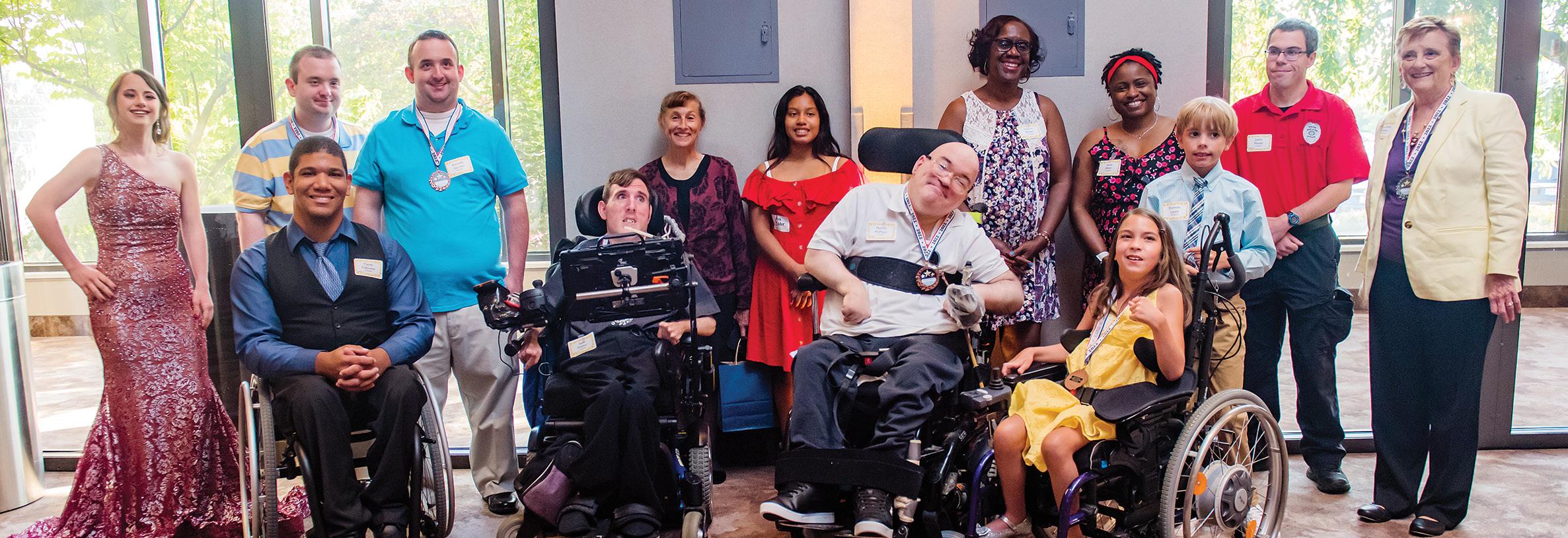
EDUCATION
13 Navigating sensory-friendly performances. Advice on how to celebrate the little wins.
ADVOCACY
Ways to support positive identity.
FAMILY MATTERS
35
OHIO IS AN ACCESSIBLE DESTINATION
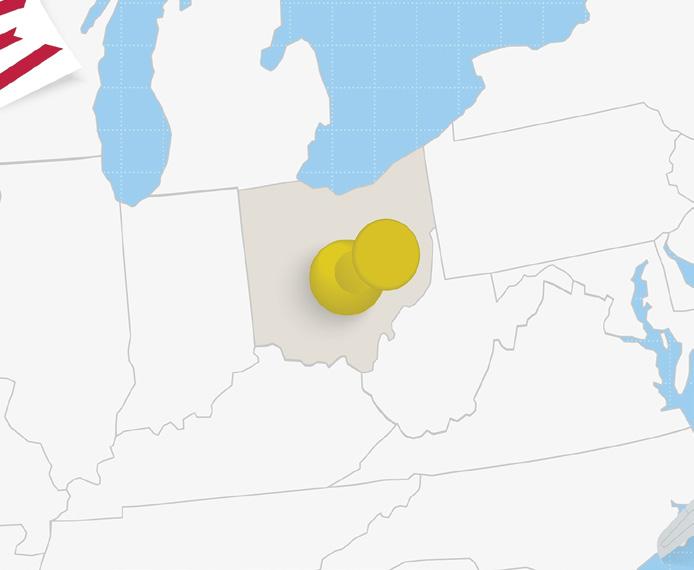
We provide ways to get out-and-about in the state, whether you want to stay for a day or hang out all weekend long.
48
DIRECTORY OF RESOURCES
Find these advertiser listings of resources, support and more!
A story of an autism diagnosis in adulthood. Getting active with adaptive tennis.
TECHNOLOGY
41 Virtual learning for life skills.
50 Find some assistive technology apps.
THERAPIES
12 Ultrasound speech therapy tackles 'R' and 'S' difficulties.
PLANNING
22 After graduation: the path to support.
23 Questions to ask day service providers.
livespecial.com 2022-23 3 2022-2023 Edition 10 JOY OF CREATING The importance of creative arts for people of all abilities. 18 LIFE SKILLS AND JOB TRAINING How adult day program can provide a meaningful place for those with special needs, in job training, skills and social interactions. 24 LIFE TRANSITIONS
Gohn, who was the inspiration for LiveSpecial.com, gains skills and independence in her teen years.
Alana
25 PAGE
PHOTO BY MARIANA EDELMAN
EXECUTIVE DIRECTOR'S NOTE
Dear readers,
Iclearly remember the day, 12 years ago, when NCJW/CLE members Elaine Eisner and Scott Gohn came to us with the idea for LiveSpecial.com.
Their daughter, Alana, had been diagnosed with a number of special needs, and Elaine and Scott were feeling frustrated that it was such a challenge to find all the specialists and services available in Northeast Ohio.
They wanted to see if NCJW/CLE, whose mission is to improve the lives of women, children and families and who has a history of supporting those with special needs, would be interested in creating an online resource guide for the special needs community.
NCJW/CLE said yes.
Over a two-year period, dozens of NCJW/CLE volunteers spent thousands of hours, searching for doctors, therapists, specialists and programs to compile into a spreadsheet that would later become the website we have today, where you can search for and find appropriate providers.

We have heard from so many of you about how LiveSpecial.com has helped connect you with resources on everything from where to go to get tested for adult autism to what local camps have the capabilities to serve youth with special needs.
Today, we are proud to say that LiveSpecial is not just an online resource guide; it is a source of knowledge including educational videos and important information.
And I’m so excited to announce that — 10 years after the official launch of LiveSpecial.com — we are unveiling a new website. We’re calling it LiveSpecial 2.0. The new site is even more user-friendly. A new format and new search function make it even easier to look for providers and services based on needs, diagnoses and age.
With LiveSpecial 2.0, help is really just a click away!
We urge you to check out the new site, livespecial.com, and let us know what you think!
We are grateful for the community of people who have helped us get to this 10year mark. We look forward to seeing what the next 10 years will bring.
With gratitude,
PUBLISHER'S NOTE
Mindi Axner
26055 Emery Road
Warrensville Heights, OH 44128
livespecial.com ncjwcleveland.org
PRESIDENT Dana Trau & Laura Kuntz president@ncjwcleveland.org
EXECUTIVE DIRECTOR
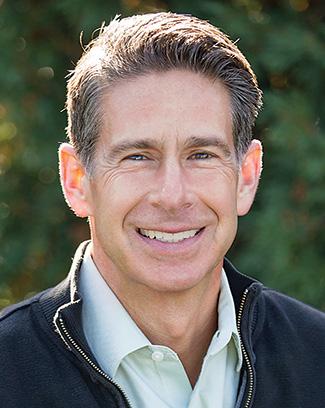
Mindi Axner 216-378-2204 ext. 103 maxner@ncjwcleveland.org
LIVESPECIAL COORDINATOR
Wendy Spitz 216-378-2204 wendy@livespecial.com
LIVESPECIAL ADVISORS
Jennifer Boroff
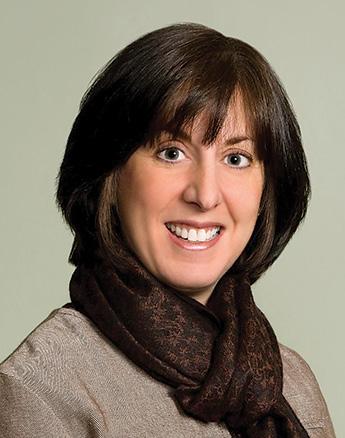
Elaine Eisner
Cindy Glazer
Laura Kuntz
PUBLISHER
Brad Mitchell
EDITOR
Angela Gartner
MANAGING EDITOR
Denise Koeth
ART DIRECTOR
We are so thankful for our partnership with the NCJW/CLE and the ability for this collective team to bring you this 8th annual edition of LiveSpecial. com magazine. In 2015, we got together with the concept of expanding the website into a traditional magazine format with robust content. The idea to create a standalone publication to increase outreach and awareness to the community has been a huge success. Over the years, countless new connections have been made between providers and families through the distribution of the magazine to key locations throughout the region. If your organization or event could benefit from having this magazine available to the individuals and families you reach, please let us know your interest by contacting us at info@livespecial.com.
Learn more about the origin and development of the LiveSpecial.com project over the past 10 years by reading the article on page 32.
Brad Mitchell

Laura Chadwick
CONTRIBUTORS
Lindsey Geiss, Cindy Glazer, Georgia Lattas, Vince Guerrieri, Mike Daugherty, Ginny McCabe
LiveSpecial.com Resource Guide is published by Northeast Ohio Parent Magazine and Mitchell Media LLC PO Box 1088 Hudson, OH 44236 330-822-4011
Copyright 2022 by NCJW/CLE and Northeast Ohio Parent

4 livespecial.com 2022-23
LIVESPECIAL IS MORE THAN JUST A MAGAZINE
It’s a free online resource.
It’s a comprehensive database of providers for your every need.
It’s a go-to guide for individuals with special needs, caretakers and providers in Northeast Ohio
Introducing a New Website!
Carefully curated with user-experience in mind. The website provides:
· Services for temporary or long-term needs
· Educational resources and video gallery
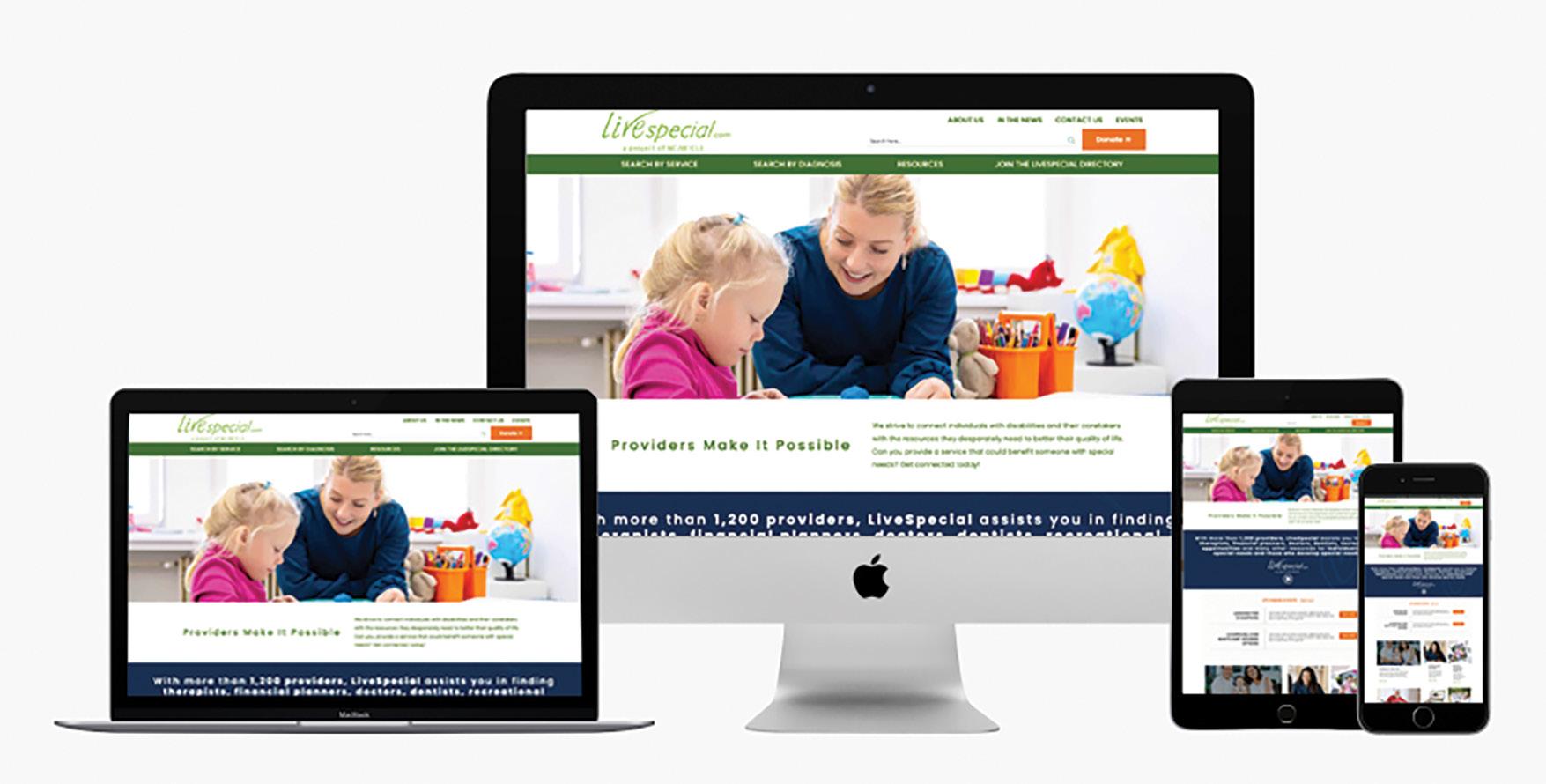
· An easy way to search for local support and resources
WE ARE COMMITTED TO BEING NORTHEAST OHIO’S GO-TO ONLINE RESOURCE TO SUPPORT INDIVIDUALS WITH SPECIAL NEEDS AND THEIR FAMILIES. Email info@LiveSpecial.com to receive firsthand information and updates or to receive additional magazines.
WORTH NOTING
DYSLEXIA SCREENING BECOMES LAW IN OHIO
By Georgia Lattas
The Right to Read Law” (Ohio House Bill 436) was signed into law for every school district in Ohio to screen kindergartens through third graders for dyslexia. It's a learning disorder, which involves difficulty reading due to problems identifying speech sounds and learning how they relate to letters and words, according to the Mayo Clinic. Fourth through sixth graders can also get screened for dyslexia if a parent or a teacher (with parent’s permission) requests it. The dyslexia screenings law will go in effect the 2023-24 school year (the new law was delayed a year from its original timing after it was passed.)
We asked, what does this mean for your child? What should you know about this law? Lacey Snoke, interim chief of communications and press secretary for the Ohio Department of Education, answers all these questions and more.
LIVESPECIAL.COM: WHY IS DYSLEXIA A POINT OF INTEREST? WHY FOCUS ON DYSLEXIA?
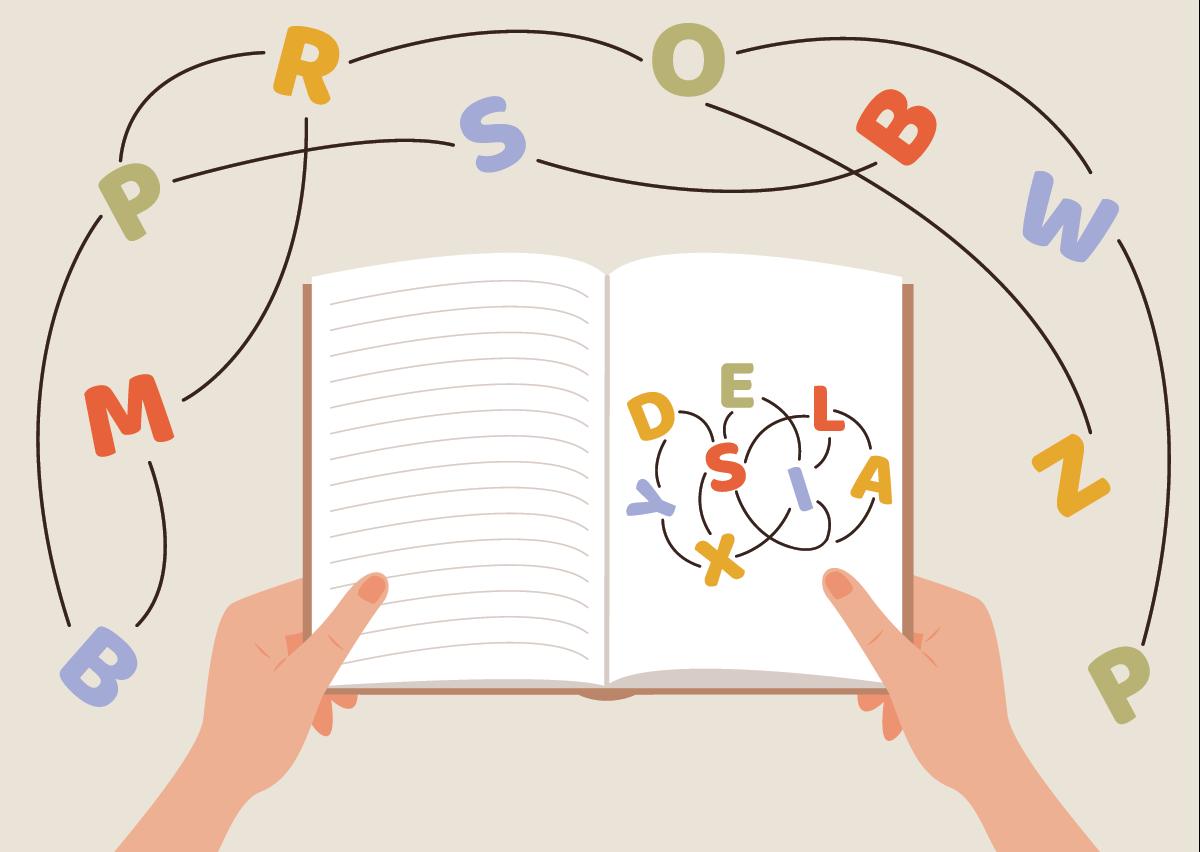
SNOKE: “Growing research suggests that up to 1 in 5 students have characteristics of dyslexia, which can have long-lasting effects on their academic achievement and social-emotional development. Research also shows that if reading difficulties are identified and addressed early, students have a much greater chance of overcoming those problems and being successful. Nationally, there is a collective effort to understand the characteristics of dyslexia and the instructional practices that are most effective for students.”
LIVESPECIAL.COM: WHAT SHOULD PARENTS KNOW ABOUT THIS LAW? HOW WILL IT IMPACT THEIR CHILD’S SCHOOL?
SNOKE: “Parents should know the screening process will help to identify students who are at risk for reading difficulties, including dyslexia, and to determine which specific reading skills students might need support. The screening process is not meant to diagnose dyslexia, but to support early identification of potential difficulties to prevent more reading problems as students get older. These laws will help schools and districts strengthen their reading instructional
practices and services in several ways. K-3 teachers and intervention specialists will complete professional development training around the characteristics of dyslexia and instructional practices for students with, or at risk for, dyslexia. In addition, schools and districts will establish multidisciplinary teams, which will include someone with certification and expertise in dyslexia, to engage in the screening and intervention process.”
LIVESPECIAL.COM: WHY ARE KINDERGARTENERS THROUGH THIRD GRADERS SCREENED?
SNOKE: “The goal of these laws, in accordance with other states’ dyslexia laws, is early identification to prevent later and more severe difficulties. Formal reading instruction begins in the early grades. Children who struggle learning to read in the early grades are at heightened risk to continue to struggle as they get older, and when academic demands are greater.
LIVESPECIAL.COM: WILL SCHOOLS BE RESPONSIBLE FOR SCREENING THEIR STUDENTS? HOW WILL THAT PROCESS WORK? IS THE SCREENING FREE?
SNOKE: “Yes, schools will conduct screenings. Schools will have to select a screener from a department-approved list and report results annually. Screening will be done at school and at no cost to families. If students are identified as being at risk from the initial screener, the school will monitor the student’s progress and response to instruction for up to 6 weeks, and possibly do a more in-depth screener later, if the student is still experiencing difficulties.”
LIVESPECIAL.COM: WHAT HAPPENS IF A CHILD IS SUSPECTED OF HAVING DYSLEXIA BASED ON SCREENING?
SNOKE: “Students who continue to
demonstrate reading difficulties will receive a second screener (called a tier 2 or intervention-based diagnostic assessment) so that further information about where the student needs specific support can be identified. The second screener can be used to guide instruction and intervention, as needed, using a structured literacy approach.”
LIVESPECIAL.COM: WILL ALL SCHOOLS HAVE TO SCREEN THEIR STUDENTS?
SNOKE: “The law applies to public schools, which include community (charter) schools. Ohio’s Dyslexia Support Laws do not apply to chartered nonpublic schools.”
LIVESPECIAL.COM: WHAT ARE SIGNS OF DYSLEXIA?
SNOKE: “There are several resources available to support parents who may have concerns. Ohio’s Dyslexia Guidebook has a helpful list of behaviors and characteristics, across different age groups, that may indicate risk for dyslexia. The guidebook also contains a list of books, articles, podcasts and websites that may be helpful.”
LIVESPECIAL.COM: WHY IS IT IMPORTANT TO PASS SUCH A LAW?
SNOKE: “Learning to read is a major milestone in a young child’s life and is fundamental for long-term success. However, for some children, the process of learning to read is extremely difficult and becomes a barrier to their academic and social-emotional development. Early identification of children who may experience reading difficulties is possible, and focused intervention and remediation efforts are effective for reducing negative long-term impacts.”
Visit education.ohio.gov/Topics/Learningin-Ohio/Literacy/Dyslexia for resources.
6 livespecial.com 2022-23
GADGETS
ASSISTED TECHNOLOGY FOR HOME
• LIFX Wi-Fi Bulbs do not require a separate hub but can be connected directly to home Wi-Fi. The bulbs can do shades of white light, as well as more than 16 million colors. LIFX has a variety of bulbs, including compact bulbs and ambient power strips to enhance the light in a room. Prices range from $10 to $120, lifx.com
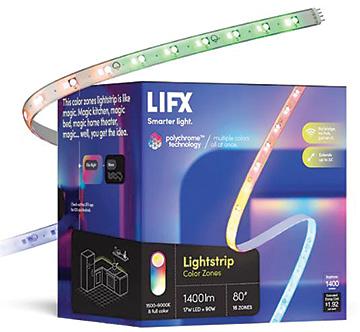
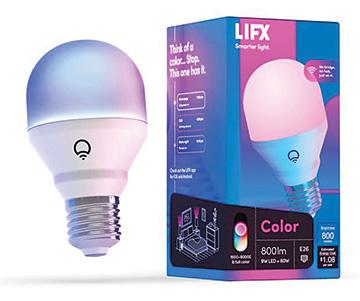

• Kwikset Halo Touch
Wi-Fi Enabled Smart Door Lock with Fingerprint Access allows users to program up to 100 individual fingerprints, or 50 if using a fingerprint from each hand. Grant temporary access when needed. The lock has a 30-second auto-lock function if enabled. The lock is available in two styles, contemporary or traditional, and in either a satin or nickel finish. $250, kwikset.com/halo-touch

— Sid Blair, assistive technology specialist at Cuyahoga County Board of Developmental Disabilities
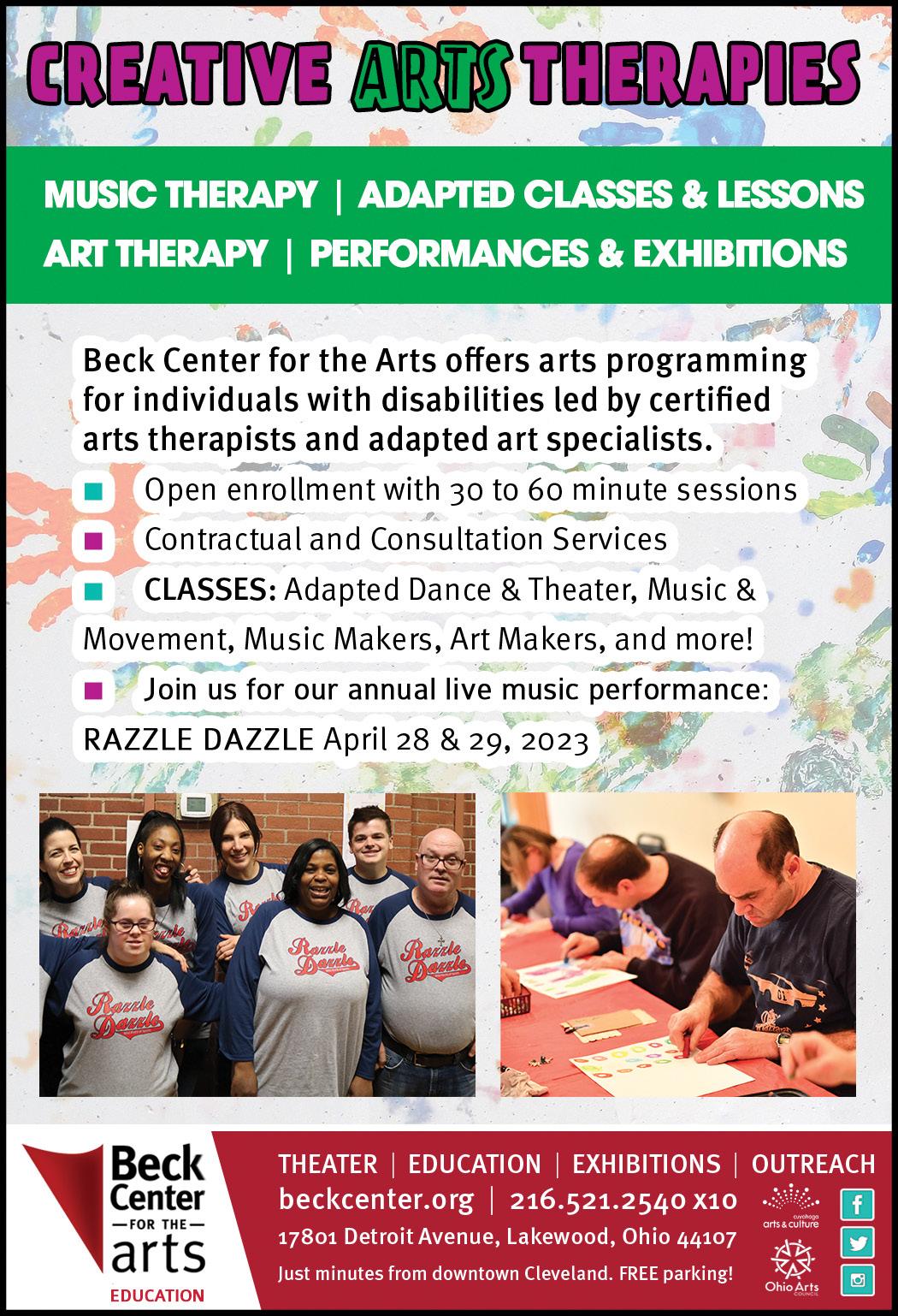
ACCESSIBLE PLAYGROUND OPENS AT CLAGUE PARK IN WESTLAKE
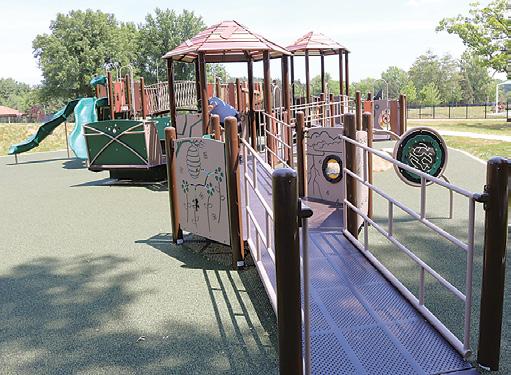
The playground, located at 1500 Clague Road in Westlake, is roughly 20,000 square-feet and includes a large mound which provides access to an elevated entry platform leading to one of multiple play structures, including adaptive swings, sensory-friendly play, as well as access to the entrance of multiple slides.
"The grounds are specifically designed to accommodate children with special needs, but all children are welcome to enjoy this amenity located adjacent to the Westlake Aquatic Center and Peterson Pool," according to the city's website. Visit cityofwestlake.org for more information.
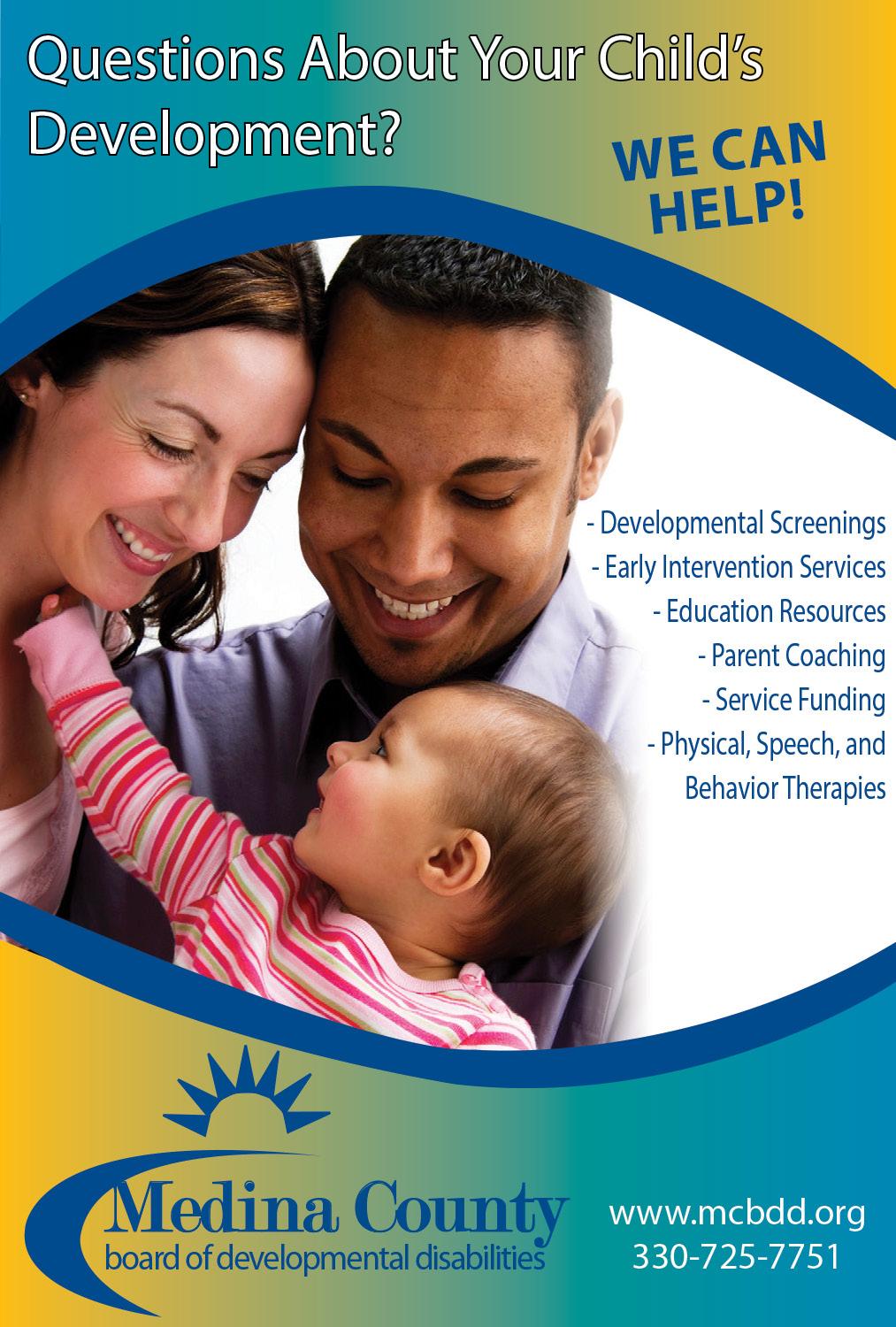 PHOTO COURTESY OF THE CITY OF WESTLAKE
PHOTO COURTESY OF THE CITY OF WESTLAKE
Most people remembered Jeffrey Friedman’s name from his many billboard and television ads. The well-known personal injury lawyer, who was in a wheelchair due to an injury he sustained in a car accident when he was 17, was there if you needed him.
Friedman, of University Heights, who passed away at age 74 on May 29, 2022, leaves behind his imprint of helping others in the community.
“Jeff worked for decades to create a law firm to address the legal needs of individuals who were wrongly injured,” says his wife, Margaret Duffy-Friedman. “Although Jeff is no longer with us, his legacy lives on through his law firm."
His legacy began when he graduated Cum Laude from John Carroll University with a bachelor’s in political science, followed by Case Western Reserve University School of Law and then passing the bar exam. He began
Remembering Jeffrey Friedman & His Legacy
By Angela Gartner
practicing law and eventually joined his partners and the namesakes of the firm, David Smith and Joe Domiano.
“As a result of an automobile accident, Jeff had a personal understanding of what it was like to be physically disabled; he would always say, ‘I know, I’ve been there,’” Duffy-Friedman says. “Jeff had a keen awareness and advocacy of ‘Justice for All,’ especially for those with disabilities of any type."
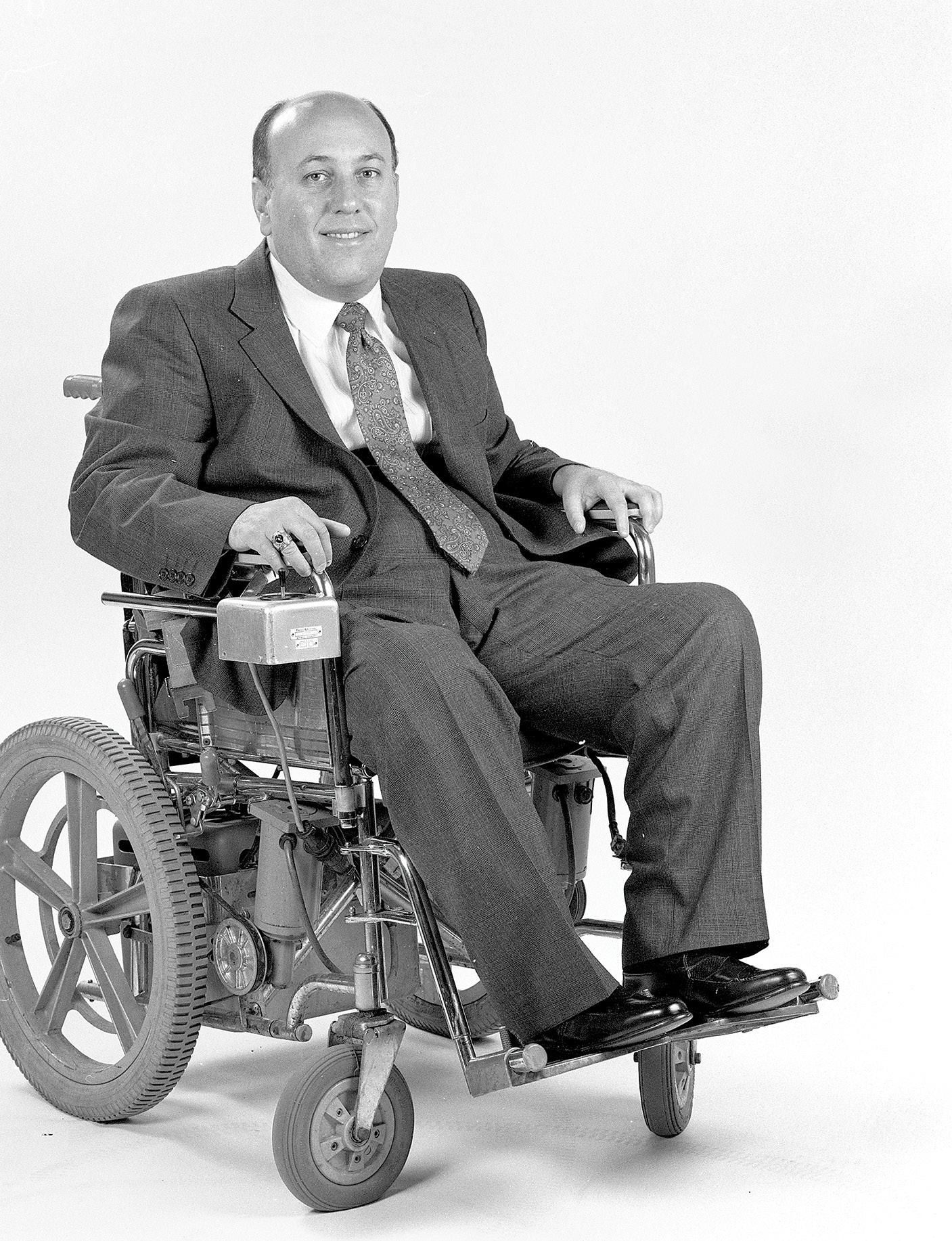
“Everyone always said that Jeff had ‘rose-colored glasses,’” she adds.
“He always looked for positive solutions and had a brilliant, creative mind for problem solving. Jeff used his skills, expertise and positive attitude to always help others in need.”
Julie Thomas, executive director of Friedman, Domiano & Smith adds "he was quick-witted and unbelievably intelligent; he dealt with everything, no matter what was thrown at him. I am so blessed to have known him, to watch how his mind worked.”
Thomas says what was most impressive is that Friedman really believed in what he said.
“We had clients who were severely injured and I think he was an inspiration to them,” she says, adding that Friedman would go out of his way to meet with them, and for many years, clients called to check in and thank him again for everything he had done."
She also recalls how much he was involved in the community, including with Spinal Cord Injury Foundation.
“We are going to continue to do what he wanted us to do: help as many people as possible," Thomas says.
Marco G Bocciarelli, a partner in the firm, spoke about Friedman’s advocacy work, including providing a strong voice for accessibility (such as on public sidewalks and spaces) and rights of people with disabilities.
“He was driven to help people who suffered severe injuries,” Bocciarelli says. “He was always trying to help someone else. There are thousands and thousands of people he has helped in some way over the course of his career.”
One way the law firm will continue in his memory is to keep the name Friedman, Domiano & Smith.
“It’s as simple as the firm’s motto, ‘Fighting for You’ — we want people to know that we will be here for them,” Bocciarelli says about continuing Friedman’s legacy and name. “That we are going to be on their side and do everything we can. I am proud to continue the name and to be part of it. I wouldn’t want to do anything to alter that.”
Friedman wasn’t just a lawyer, as his involvement in the community was important to him. He served as councilman and vice mayor of University Heights.
“Jeff was an elected civic leader in University Heights for approximately 30 years,” Duffy-Friedman says. “While at John Carroll University, Jeff learned the importance of civic responsibility. While on city council, Jeff was instrumental in supporting ordinances and initiatives that had a long-lasting, positive impact on the city.”
Sue Infeld, former mayor of University Heights, wrote that what “made him so unique was that he used his prodigious talents in the service of so many other people.”
He was an integral part of city developmental projects and spearheaded the campaign for a levy that would support firemen to be trained as paramedics.
“Whatever Jeff put his mind to, he accomplished,” Infeld wrote. “His life touched and enhanced the lives of his clients, colleagues, and everyone who called or will call University Heights, Ohio, their home.”
To those who knew him, Friedman was someone who didn’t give up and made it his mission in life to help people and the community.
“Jeff lived life to its fullest,”DuffyFriedman says. “He valued education and understood its importance in career development and professional success. Jeff never let his physical disability limit his mission in life. He, too, would encourage his disabled brothers and sisters to strive to achieve their dreams, and help to make the world a better place.”
8 livespecial.com 2021-22 8 WORTH NOTING
Jeffrey Friedman
K K
'ON THE ROAD TO SUCCESS' ART SHOW
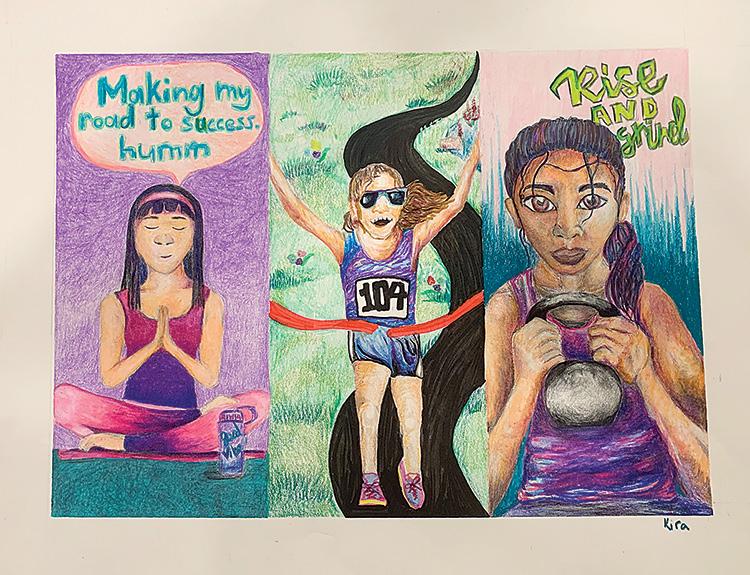

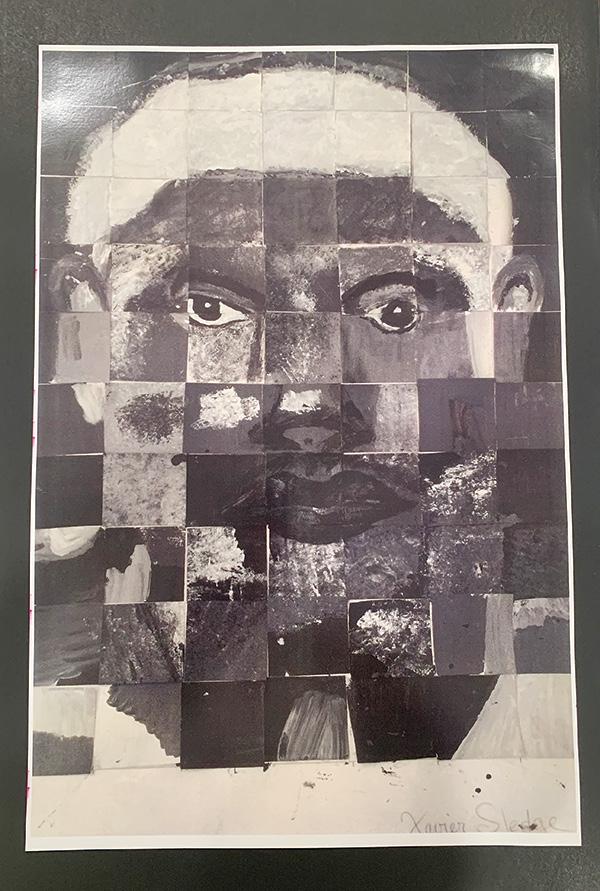
LiveSpecial.com featured a public art show in April 2022, featuring artists with special needs at Eton Chagrin in Woodmere. There were more than 150 pieces of art from all ages — children and adults. Here’s some of their pieces and the displays to get inspired by these talented artists.

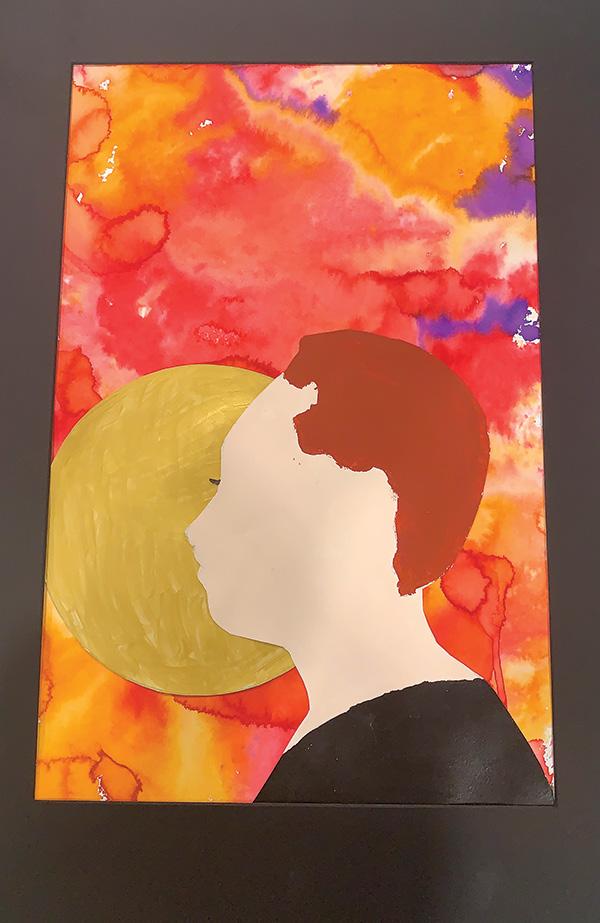
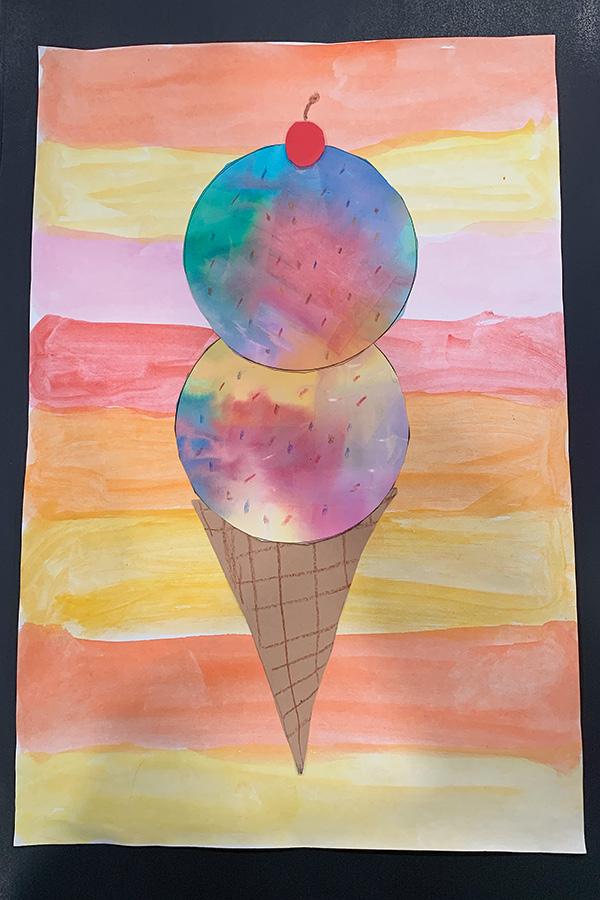
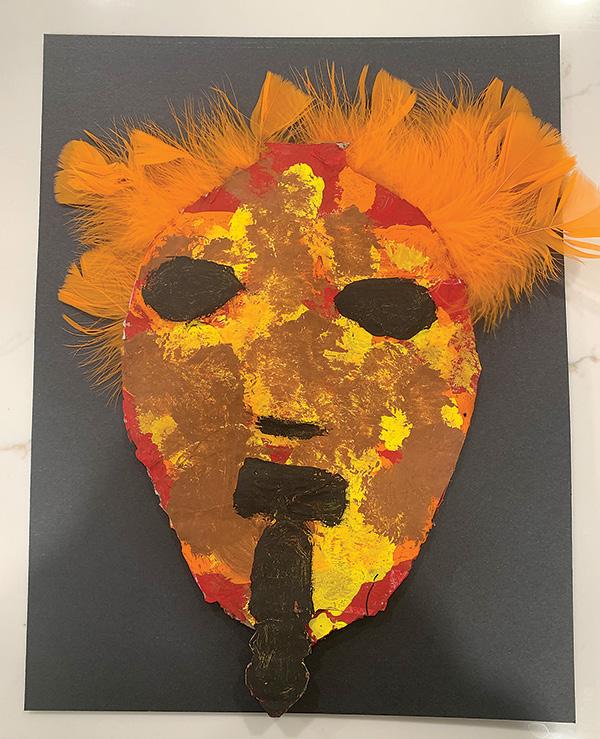
livespecial.com 2022-23 9
"Shapes"
Eliora A., fourth-grader, of Solon
"LeBron"
Xavier Sledge, high school junior, of Akron
"Ice Cream" Colin N., kindergarten, of Solon
"African Mask" Davonte Marcus, high school senior, of Bedford
"In the Future" Delcina Laffin, high school senior, of Bedford
"Road to Success"
Kira Weber, adult artist, of Chagrin Falls
"Tropical Watercolor" Abby Gourley, fifth-grader, of Beachwood
Joy of Creating
The Importance of Creative Arts for People of All Abilities
By Ginny McCabe
experience from there,
“The benefits range from someone using their favorite music to relax, whether it be slow, flowing, calm music or something upbeat and cacophonous,” Gallagher says. “Using music to help you through the day or even a moment is helpful.”
Pete adds that it’s important to let artists take the lead by letting them explore, try new things, make mistakes and teach you.
“Often, people try to help too much when someone appears to be struggling or they expect them to struggle,” she says. “Encourage artists to ask for the help that they need, but let them try it on their own first."
Fairmount Center for the Arts (fairmountcenter.org) has developed outreach programs that bring the arts to area locations, including the Geauga County Board of Developmental Disabilities/Metzenbaum Center.
The joys of creating are endless. With so many art forms, from the visual arts to acting and dancing, anyone can engage in art they enjoy. Art promotes freedom of creative expression for artists of all abilities.
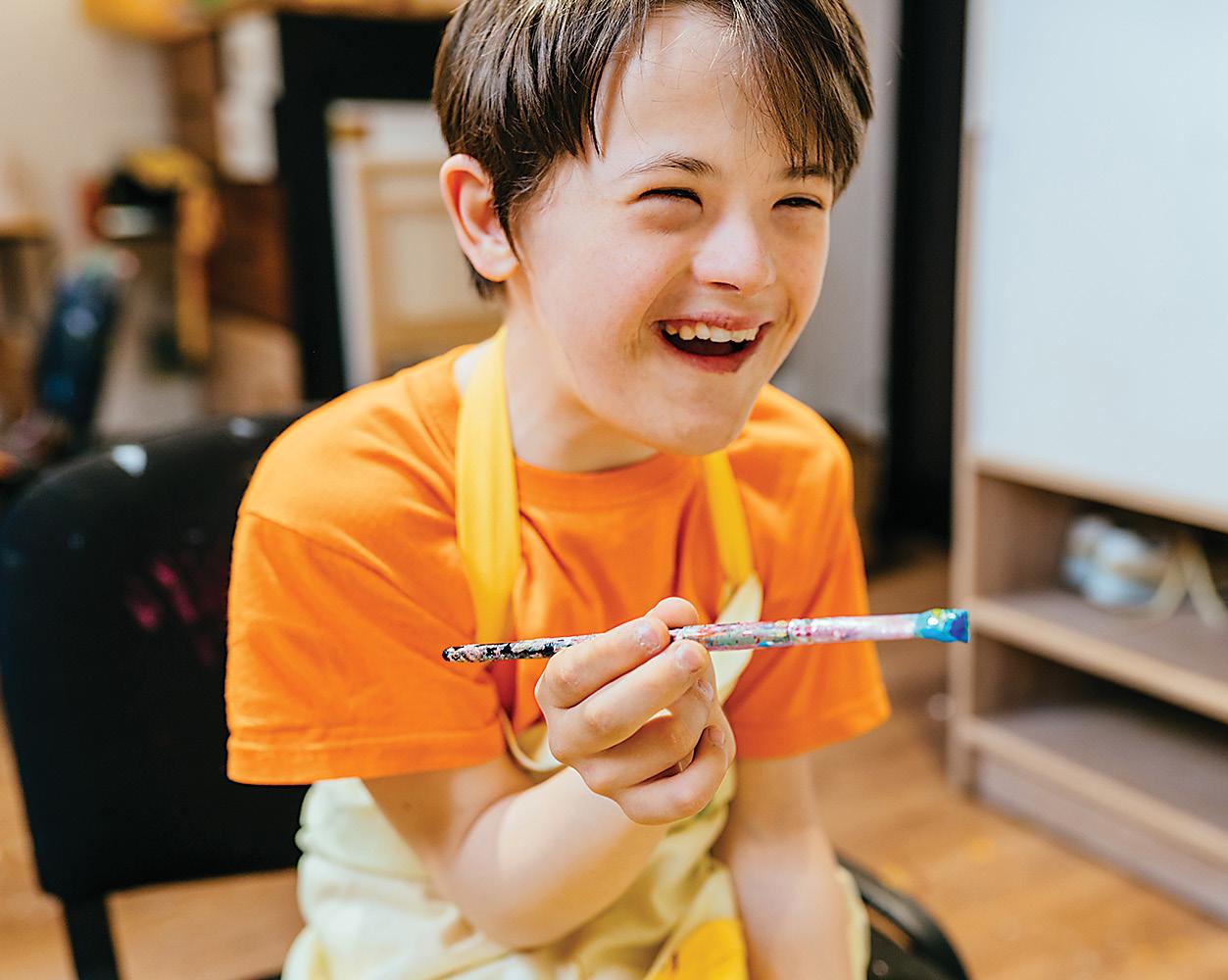
“The arts are important for everyone and it’s no different for people with disabilities,” says Cheryl Pete, ATRBC, clinical director at Art Therapy Studio (arttherapystudio.org). “People with disabilities are an integral part of our society and they need to be represented through the arts. In our society, we live with so many labels and many are related to abilities or illnesses; those labels can become part of a person’s identity. One of the things I love about the arts is that everybody understands what an artist is and it gives people a positive label that can uplift them and help them connect with others.”
Art is a way for us to tell our stories and express ourselves in
non-traditional ways. The arts activate different parts of our brain than language, which allows us to communicate in different, often richer ways, she explains.
“Many people can relate to the experience of not being able to find the right words to express something,” Pete adds. “Art allows us to bypass the need for words and connect on a deeper level.”
ENGAGE IN ART
Ed Gallagher, MT-BC, director of education at Beck Center for the Arts, (beckcenter.org) says the best way to engage students is through fun learning.
Teachers and parents can help students excel by making the arts experience age appropriate, developmentally appropriate and success oriented, Gallagher says. Provide resources that are at the student’s level and broaden the
“It can help with untangling a problem at work by helping one consider all possible angles," says Elizabeth Bolander, executive director at Fairmount Center. "Acting in a theater production or performing dance and music can help instill new levels of confidence. It can help us personally by providing an outlet for creative expression and making.”

OPEN TO ALL
It’s crucial to be inclusive of everyone in art programming, according to Pete, who adds that most Art Therapy Studio groups have a combination of people who are typically-abled or functioning working alongside people who have physical, cognitive or emotional challenges.
“It’s not a one-way street in terms of the gifts that are shared,” Pete says. Artists with special needs can share with us new perspectives and ways of seeing the world that inspire, challenge and teach us, we are all better for it.”
Ann Marie Raddell, associate director of Creative Arts Therapies
10 livespecial.com 2022-23
at The Fine Arts Association, (fineartsassociation.org), says the organization is now a partner with the Ohio Department of Mental Health.
“We are certified in the Licensure and Certification Tracking System (LACTS), so we are licensed providers for mental health services for the state of Ohio. We are very proud of that,” Raddell says, adding they are a funder for the Autism Scholarship Program through the Ohio Department of Education.
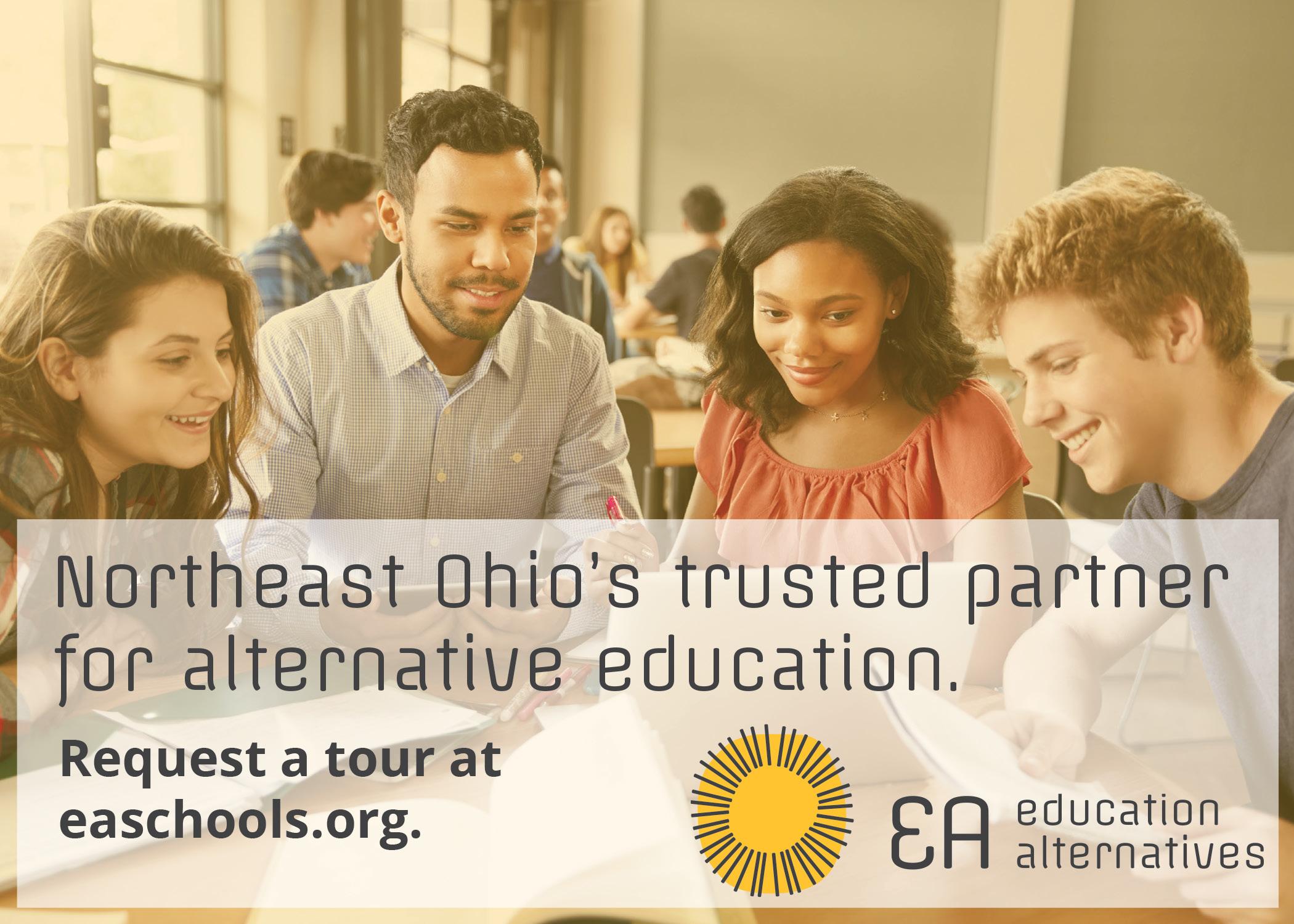
“I think what we do well is we make the arts accessible for anyone,” she says. “Art is an aspect of life that can be enjoyed and practiced by everybody, despite any disability or illness. The arts are extremely healing and helpful, as well."
CELEBRATING ABILITIES
Meredith McCulloch, an art therapist at Cleveland Clinic (my. clevelandclinic.org), says the arts provide opportunities for individuals of differing abilities to express themselves (including if they are unable to communicate verbally). They
can provide meaning and a sense of mastery, in addition to enhancing self-esteem. The arts also can create a sense of community and challenge the public’s preconceptions of the abilities of a person with special needs.

“Providing accommodations, early screening and intervention, treating all individuals with respect,
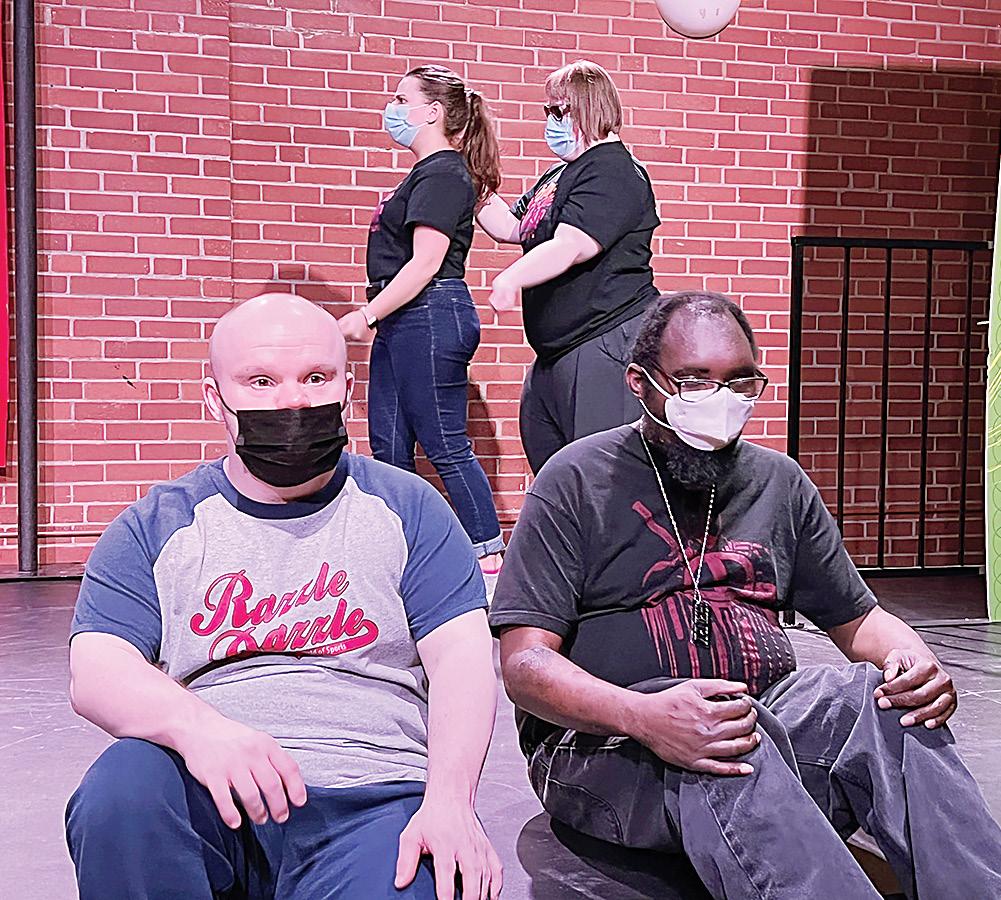
and connecting them with services can help those with special needs be successful,” McCulloch adds.
She explains that adaptations in the art classroom may be needed. Adaptive art materials can include mouth sticks, instruments to assist an individual with grasping an artistic utensil or attaching it to a foot, handover-hand assistance, and/or creating art according to an artist’s instructions.
“The arts are a universal method of communication that speaks to the human experience on a level that transcends language,” McCulloch says. “For those with disabilities, the arts can be a powerful and tangible way to convey their capabilities and experiences, and challenge existing perceptions.”
“We have seen that the arts can decrease feelings of stress and depression, increase feelings of connection, and even help regulate things like heart rate and breathing," Pete says. "I cannot count the times I have seen a person come into the space angry, frustrated, anxious or sad and walk out an hour or two later with a smile and a sense of joy.”
livespecial.com 2022-23 11
OF BECK
FOR THE ARTS
PHOTO COURTESY
CENTER
Beck Center for the Arts in Lakewood, adaptive programming on the stage.
Ultrasound Speech Therapy Tackles ‘R’ and ‘S’ Difficulties
By Rebecca Mental, Ph.D., CCC-SLP, Director of Speech, Language and Learning Services
Does your child struggle with producing the “r” sound? Do they have a slushy “s” sound? If this is true for a child ages 8 or older, they have what is called residual speech sound disorder (RSSD).
Many children with RSSD have been in years of therapy with little to no improvement in their speech. This can be frustrating and discouraging for both the child and their parents.
The ultrasound technology may have the answer for many children with RSSD. By placing a small wand under their chin, the child is able to see their tongue moving in
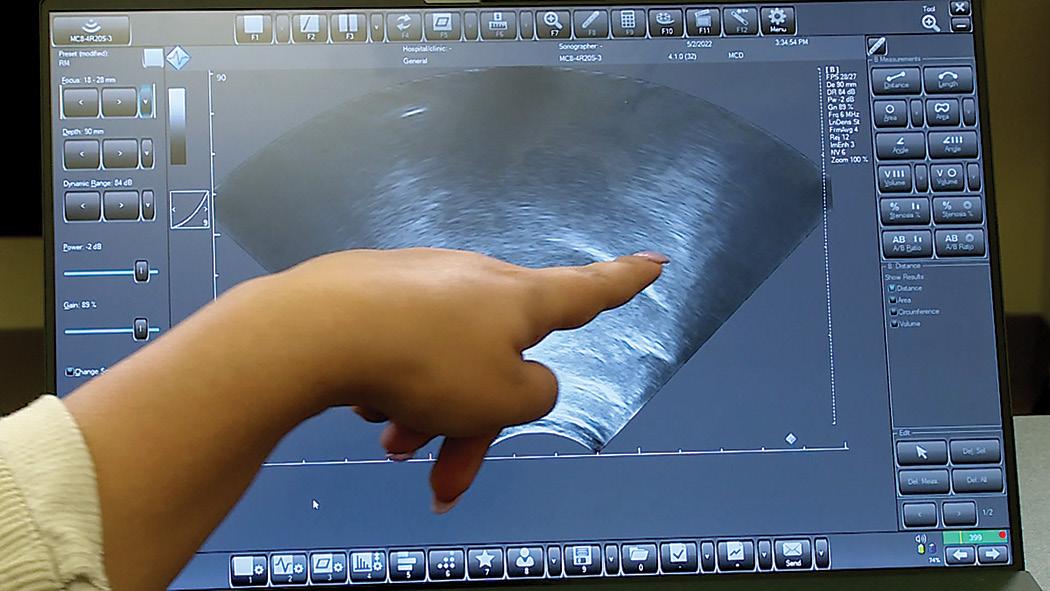
real-time. The child no longer has to solely depend on what they hear and how their tongue feels — now, they can see what their tongue looks like.
This type of speech therapy is called visual biofeedback, which simply means that visual feedback is available to the client that they
otherwise wouldn’t be able to see. In other words, ultrasound makes speech visible.
Many studies have shown that it is effective for helping adults and children produce more accurate speech. The most common sounds addressed with ultrasound are “r,” “s,” “sh” and “ch.”
If you or your child is frustrated with a lack of speech sound progress, ultrasound speech therapy could be the answer. Sessions are generally 45 minutes long. For more information or to schedule an appointment, contact Dr. Rebecca Mental at rmental@chsc.org or 216-231-8787.
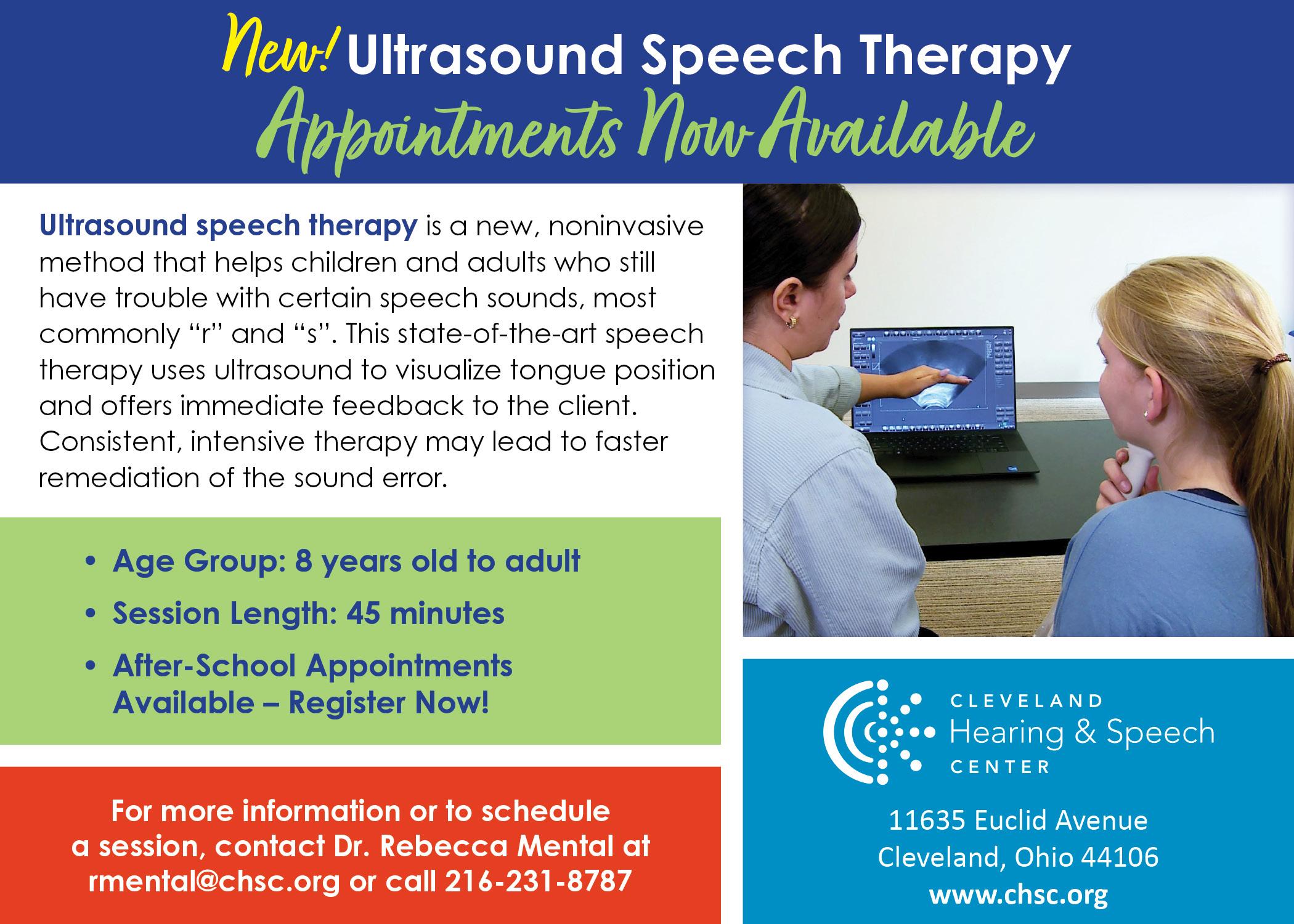
12 livespecial.com 2022-23
PHOTO COURTESY OF CLEVELAND HEARING AND SPEECH
THERAPIES
Help Navigating Sensory-Friendly Performances
By Ann Marie Raddell, Director of Creative Arts Therapies at The Fine Arts Association in Willoughby
As a music therapist and mom of two children with disabilities, I fully understand the importance of normalcy. Participation in a sensory-friendly experience allows a family to enjoy a fun and enriching outing without the factors that sometimes come with having a loved one with a disability, such as fear of disturbing others or not having a successful experience. Along with the important family and social engagement, there are benefits such as selfexpression, communication, and language development. Here are answers to a few common questions about attending a sensory-friendly performance, as well as information about how to interact with the arts.
How do I ensure my loved one with special needs is prepared to attend a sensory-friendly performance (before and after)? How can I help them benefit from the experience? It’s important for families to research what to expect
during a sensory-friendly performance experience. Families know their child(ren) best and will know how to best assist their loved one in navigating what could be a new experience.

While most theaters probably attempt to keep the sensory-friendly performance aspects consistent, there might be some differences for one venue versus another. Some theaters even allow a family to call ahead and explore the theater prior to a performance.
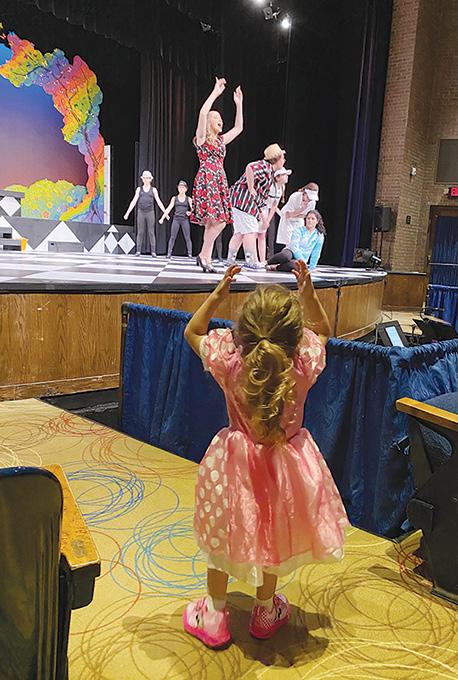
If the sensory-friendly performance is a musical, listening to the music prior to the performance could be helpful for the participants. I know my own sense of excitement when I get to
hear a song that I know — and it’s even better while experiencing it live.
How can I engage my loved one with special needs in theater and music to get them more comfortable interacting and experiencing the performances? Repetition has so much value in allowing those with disabilities to become more comfortable in experiencing performances. Listening to the music, finding pictures of the theater or characters, and/ or talking about the storyline all can assist in making the experience more engaging. Social stories or picture icons also may help prepare an individual for a new encounter, such as live theater.
livespecial.com 2022-23 13 EDUCATION
PHOTO COURTESY OF THE FINE ARTS ASSOCIATION
Celebrate Little Wins
Bringing Positive Reinforcement Techniques From Our Specialized Environment Into Your Home
Celebrating the behaviors we want to encourage increases the likelihood of the behavior happening again in the future. For children with learning and social differences, it’s extremely important that techniques taught in the classroom carry over and are mirrored outside of the classroom and at home.

We don’t just want to celebrate “big wins” like a report card of straight As. We want to appreciate and acknowledge the little things, too. First, let’s start with some examples of “little wins” or expected behaviors that we can celebrate at home.
• Tidying up without being asked
• Asking for help with a task
• Tying their shoes
• Keeping their room clean
• Putting away/doing the dishes
• Playing nicely with friends
• Having a good day at school
• Listening while others speak
• Being kind to others
How can we positively reinforce and encourage the behaviors that we want to continue to see?
• Activities — Incorporate a celebratory dance or take a jumping break when your child has accomplished a certain part of a task.
• Compliments and observations — Verbal positive reinforcement can help motivate kids of all ages. A “Good job!” and “You did it!” can go a long way. You

also can compliment a child on their process rather than the end result. Consider the positive impact of making simple observations about your child’s hard work. For example, you could say “Wow, you really thought hard about that,” or “You seem so happy with the end result. I love your smile!”
• Items — Being given electronics, prizes or rewards can be great motivators for larger expected behaviors and accomplishments. For little wins, you don’t have to purchase something as a gift. Consider providing a set amount of time with an item as a motivation.
• Actions — High-fives, hugs and applause all are great ways to make your child feel the work they are doing is worth celebrating.
• Time — Sometimes a child most wants your time and attention. Acknowledge your child’s little wins with undivided attention.
• Food/drinks — This can be an extra snack, their favorite snack, or something they’ve never tried before.
Find what motivates your child and celebrate the many little and big wins they experience each day.
14 livespecial.com 2022-23
EDUCATION PHOTO COURTESY OF JULIE BILLIART SCHOOLS
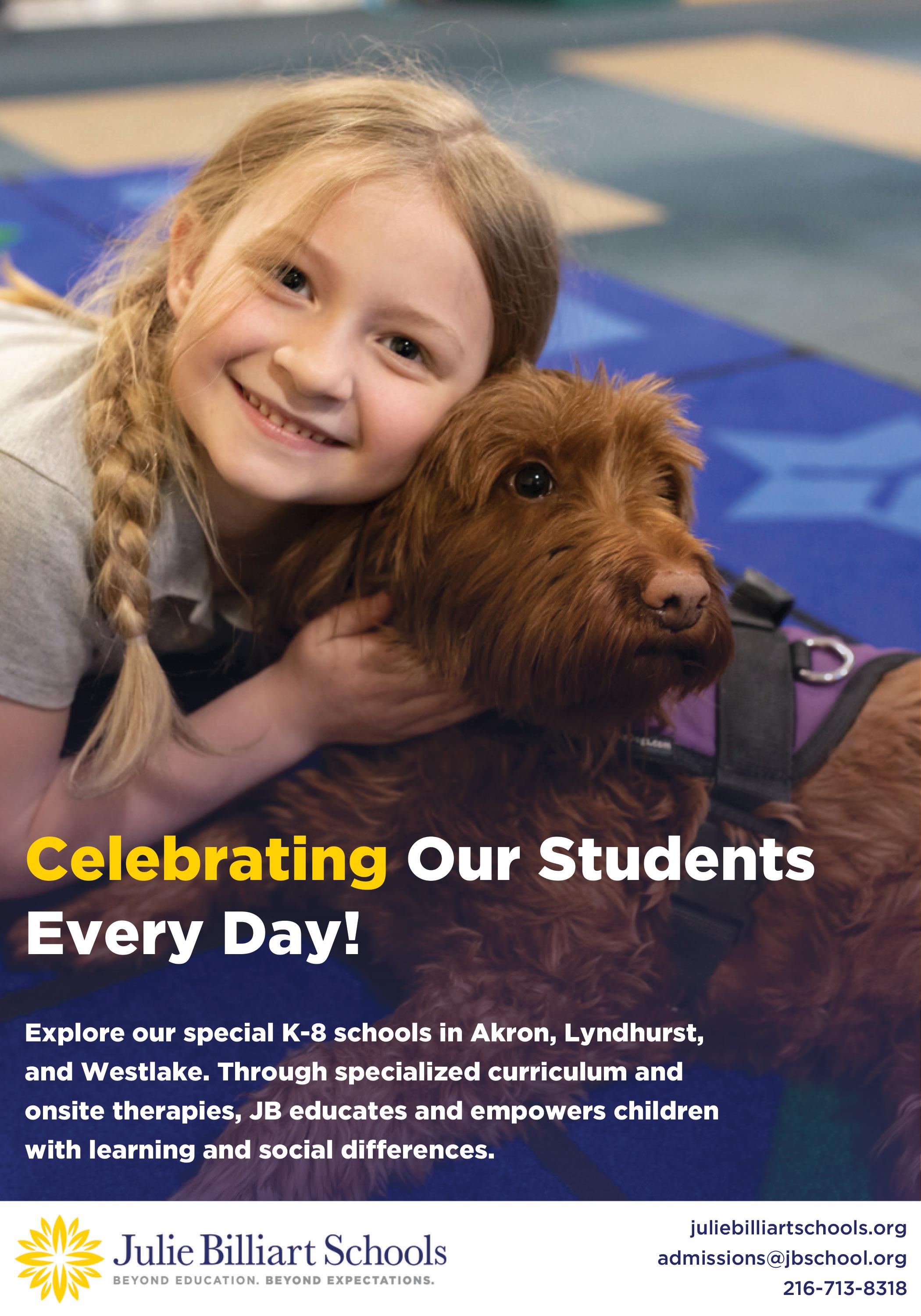
Diagnosed at 30
A Woman’s Journey With Autism
Carly Millis Jalowiec looks and acts like your typical 30-something. With long blond hair and big eyes, she is both engaged and engaging as she talks a mile a minute, smiling and laughing.
The average person likely would never label her as autistic. But she is.
“I’ve always known that I was different, even from when I was little,” Millis Jalowiec says, “and a lot of my struggles were more internal and misunderstood.”
She is part of a rapidly growing population of adults seeking an autism diagnosis. The interest is often spurred after a diagnosed family member, or increased awareness of the signs of autism.
For Millis Jalowiec, it was in 2020 after she had just celebrated her 30th birthday.
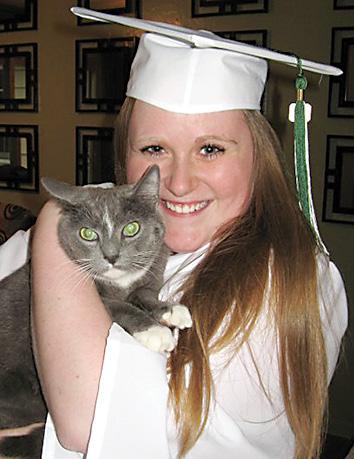
“I was looking up autism for something else and suddenly there I was, in all the articles and the books. And I thought, this explains everything.”
It all made sense, she says. The 15 years of therapy, multiple diagnoses and coping mechanisms, but never much improvement.
Milestones Autism Resources Co-founder and Executive Director Ilana Hoffer Skoff says that with limited experts in adult diagnosis, it’s not uncommon for adults to self-diagnose before they’re able to get a formal diagnosis.
“I think that for autism, it’s something that affects every person differently,” Hoffer Skoff explains. “You may have been struggling with things but didn’t have a name or a label for it.”
For Millis Jalowiec, getting the official diagnosis was life-changing.
“There’s no relief like realizing you aren’t a mistake, you’re just built a little different, and so that was huge for me.”
At the same time, she admits, there was something bittersweet about the experience.
“There’s definitely some sadness and resentment of realizing that I lived 30 years without help and support I might have been able to get.”

Autism is a developmental disability that is most commonly diagnosed in children. It’s often associated with differences in communication and social skills. But Millis Jalowiec says that is another stereotype that ultimately makes getting diagnosed more difficult for women.
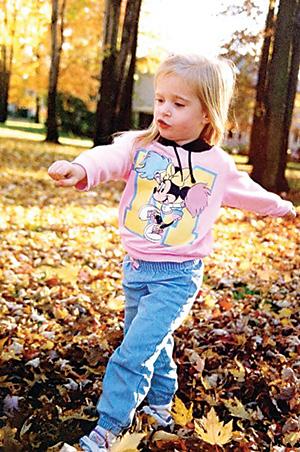
“The adult female presentation can look very, very different. I am very lucky that I did receive my diagnosis,” she says. “I’m in support groups with other women who have completely given up on that process because they’re dismissed as, ‘Oh you have friends, oh you make eye contact.’ There are all these [misconceptions] that we have not learned to recognize are outdated.”
Milestones connected Millis Jalowiec with the only available resource at the time for adults seeking an autism diagnosis in the Cleveland area.
“They had literally one name for me, which is a testament to the lack of providers and support that exists for recognizing adult autism,” she says.
Hoffer Skoff says that regardless of the age of diagnosis, it is crucial for autistic adults to continue to receive support. That was one of the ideas behind the launch of the new online Milestones Autism Planning (MAP) Tool.
Millis Jalowiec now works on the Milestones team as the organization’s education assistant. She helps to plan the annual conference and serves as an autistic self advocate, helping others who are walking the same path.
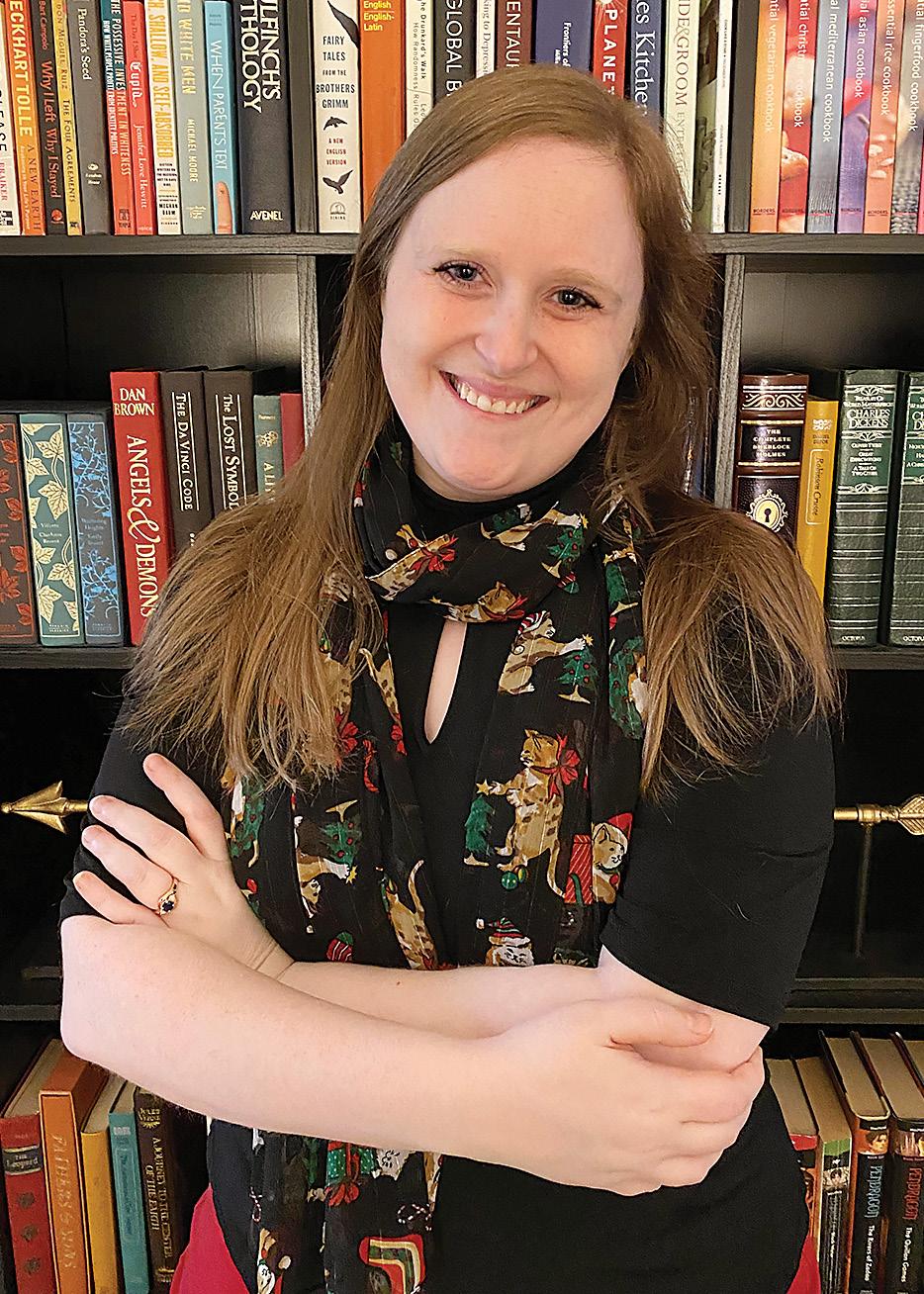
“I’m super excited to see these conversations and transformations, to be able to help girls that are like me, now getting the support a lot earlier,” she says. “Hopefully through the work we do both at Milestones and in greater communities, we can expand that to better represent the autistic adult population.”
The Milestones Autism Planning Tool is truly your online guide for life. It is a one-stop, easy to navigate resource to help you plan and prioritize, and can be customized to any age, ability and interest. Check it out at milestones.org/map.
16 livespecial.com 2022-23
PHOTOS COURTESY OF CARLY MILLIS JALOWIEC FAMILY MATTERS
Carly Millis Jalowiec (pictured) shares her autism diagnosis in adulthood.
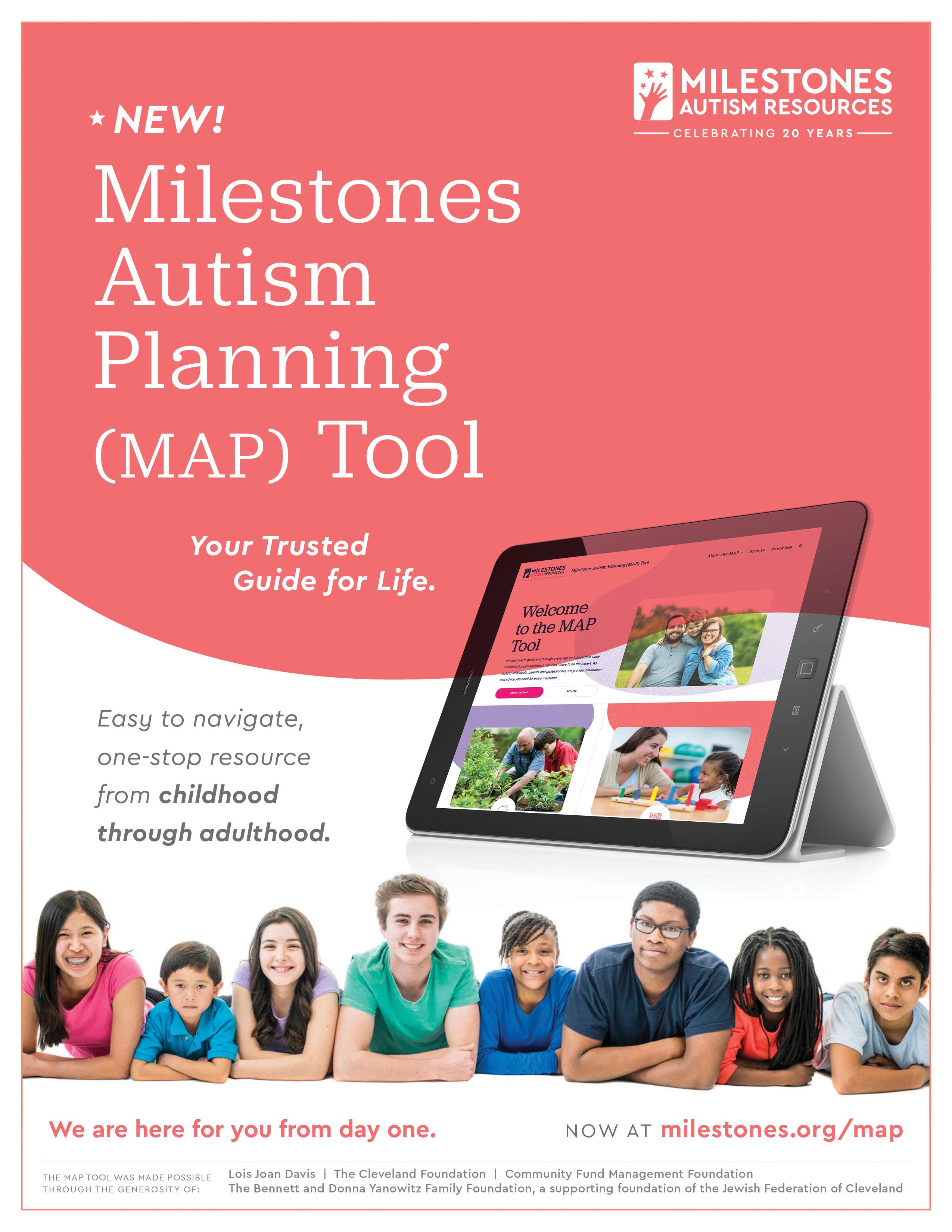
The Need for Job Training, Life Skills — Day Programs May Help
LOCAL CENTERS HAVE PROGRAMS AVAILABLE FOR ALL STAGES OF LIFE
By Shana O’Malley-Smith Photos Courtesy of the Help Foundation
There are specialized centers throughout Northeast Ohio that offer adult day programs, where individuals with intellectual and developmental disabilities can go on a daily basis and participate in meaningful activities, socialize, learn life and job skills, go on field trips and be active members of their community.
When the COVID-19 pandemic arose in early 2020, adult day centers were forced to close. More than two years later, individuals are slowly returning and centers are welcoming them with open arms and regularly scheduled programs.
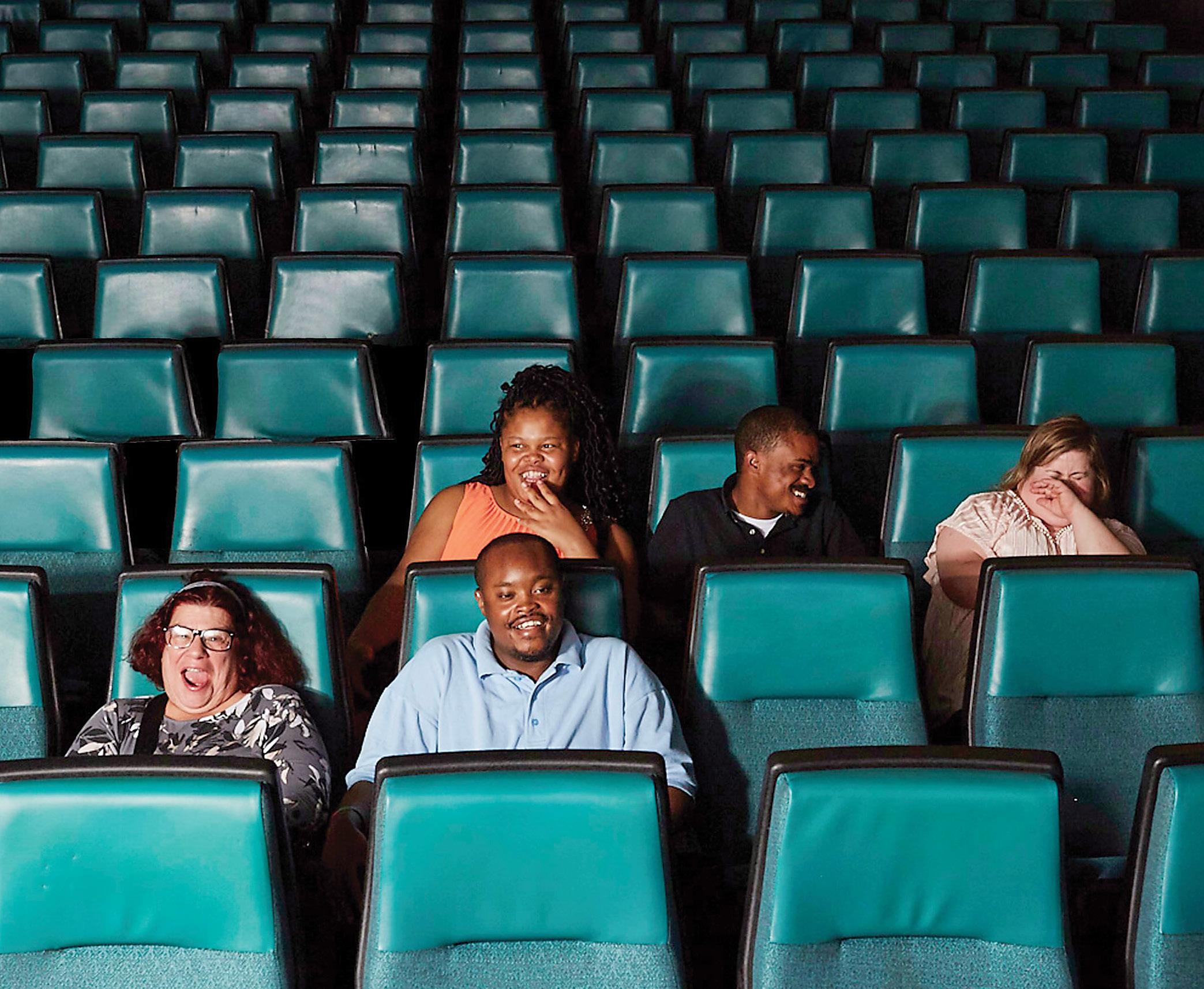
“A lot of individuals, especially coming out of COVID, just wanted to get out of the house and get away from mom and dad and have their own friends and be able to re-engage in that way,” says Allison Briskey, chief day services officer for the Help Foundation, a provider for individuals in and around Summit and Cuyahoga counties with locations in Euclid, Northfield and Lakewood.
Adult day programs can provide a meaningful place for those with developmental disabilities who might otherwise be at home with limited opportunities.
“This gets them into a routine and a structure which I think for a lot of individuals is really important and they do better with that structure and that routine if it’s consistent,” says Heather Campbell-Wilson, day program director at The Blick Center.
18 livespecial.com 2022-23
CONTINUED ON PAGE 20
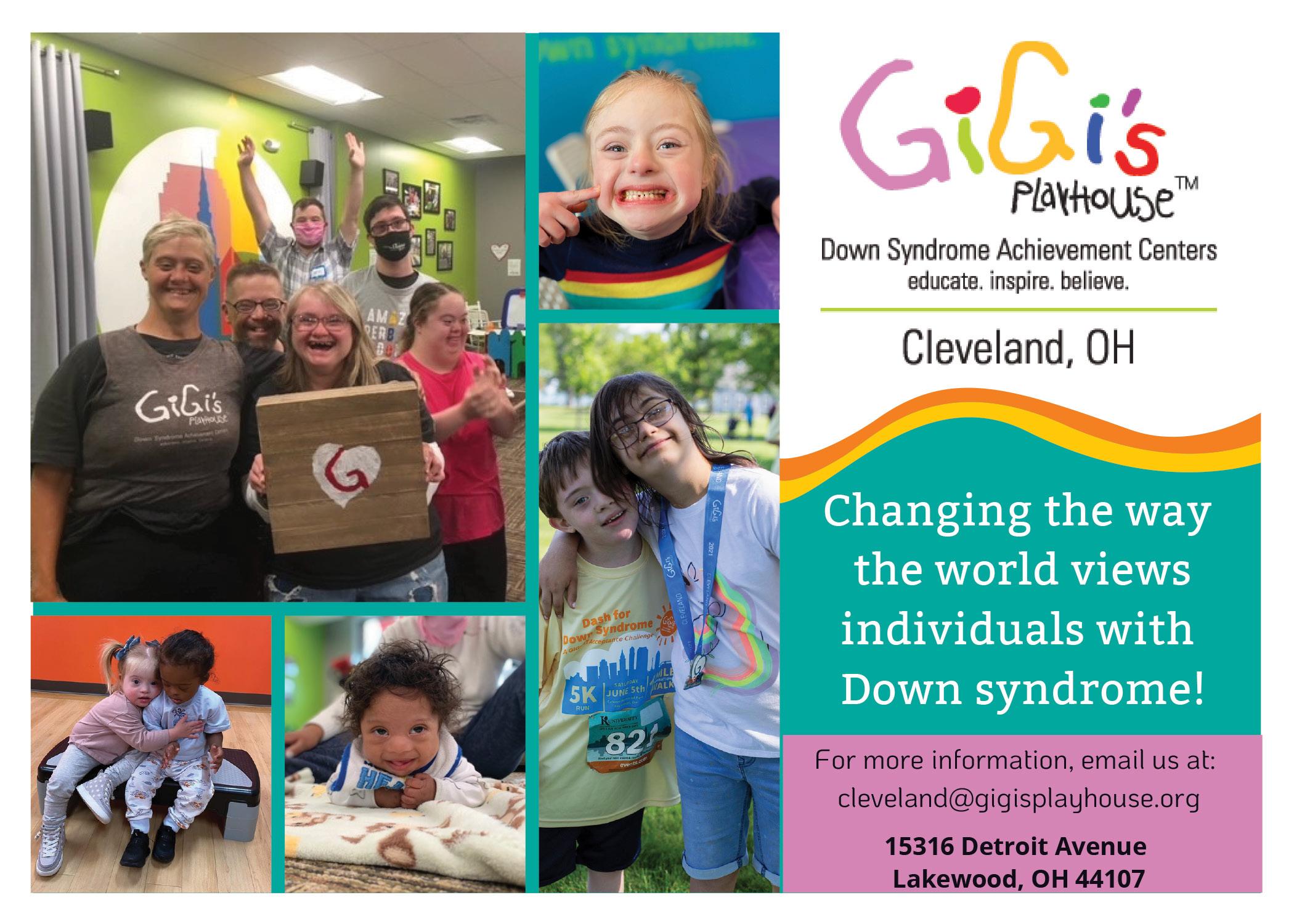
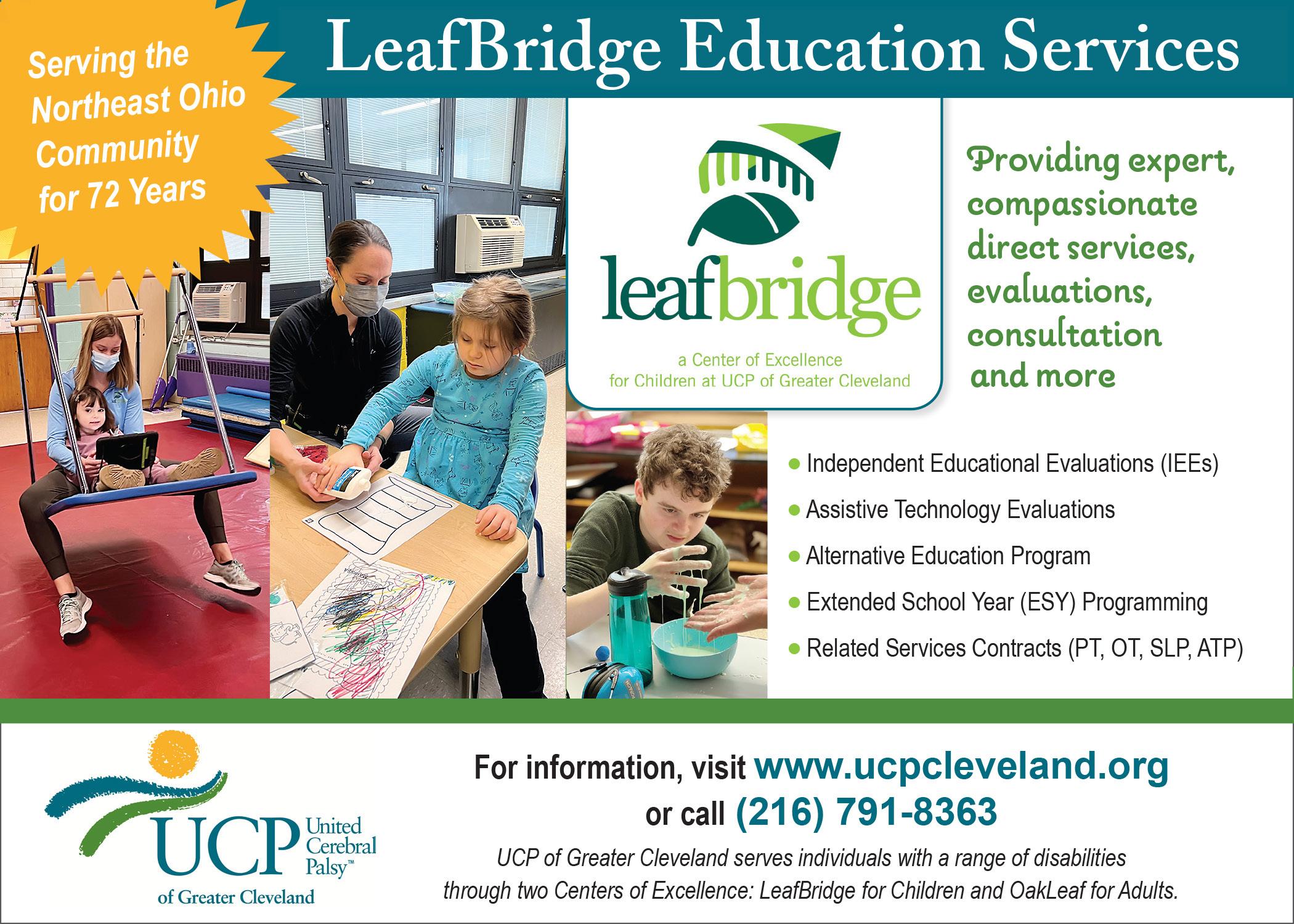
livespecial.com 2022-23 19
HELP BEYOND HIGH SCHOOL
Day programs are available for all stages of life, whether the individual has just graduated high school or is a senior citizen, Briskey says.
“We provide adult day services to individuals who are just transitioning out of high school, so between the ages of 18-22,” she explains. “They’re just coming out of high school and not sure about adult day services, mom and dad are just learning about all of
that, and it’s a good place to get your feet wet, get into a routine similar to what they were experiencing in school.”
Briskey says those individuals may want to take advantage of vocational training or learn long-term life skills such as how to use public transportation or be able to pay for something at the grocery store by themselves.
“We try to give them as much access to their community as possible so when they are home, they’re able to transition the skills that they’ve learned with us, with their families or residential providers,” she says.
Help Foundation also provides service to individuals who no longer want to work or are retired but still need a safe, engaging place to go.
No matter what age or stage of life they are in, every person served has an individual support plan (ISP), which outlines everything the center needs to know about the individual, as well as the individual’s interests and goals.
“Some individuals’ outcomes may be to become more comfortable in their community, or they are looking to develop cooking skills,” she explains. “It truly is person-centered when it comes to planning their ISP. We use the ISP (to determine how we) deliver our services based on their interests and outcomes.”
WORK ON SKILLS AND HAVE FUN
Places such as the The Blick Center in Akron provide services like day programs for those with special needs. For example, daily activities include going on community outings to places like a bowling alley, movie theater or a park. They also can participate in music groups, games and art.
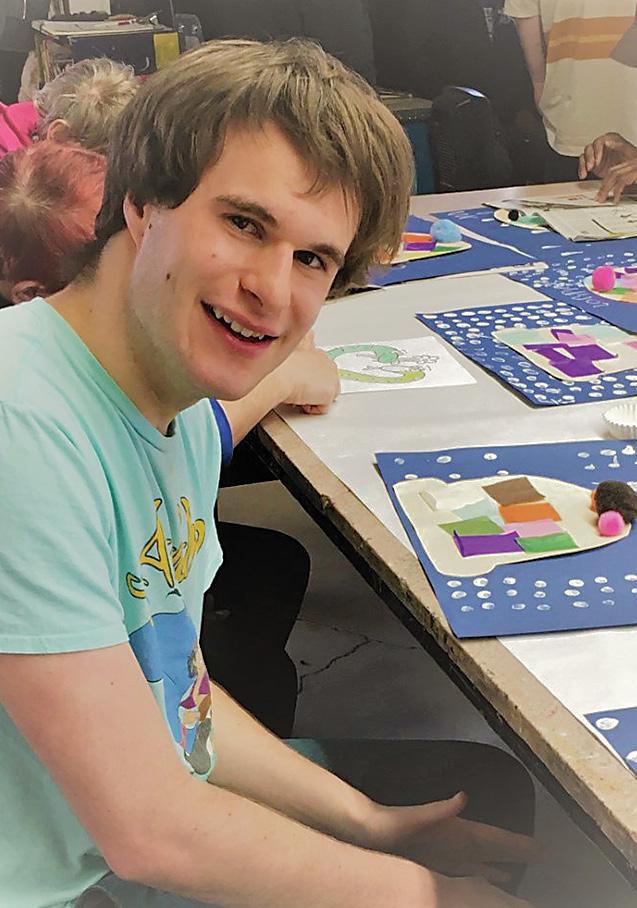
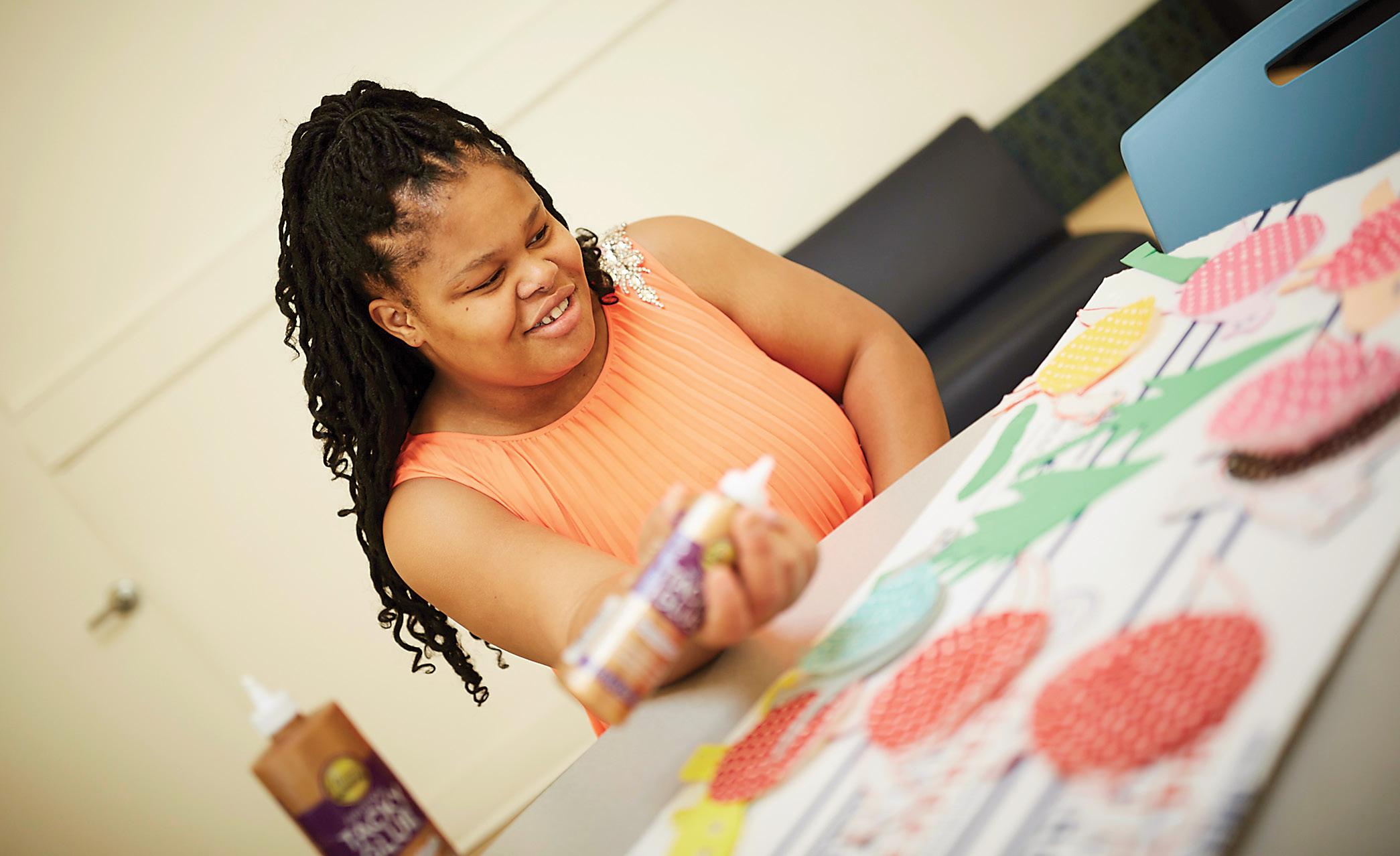
Campbell-Wilson says job training has become a large part of adult day programs over the years.
“We offer vocational habilitation, and that’s where individuals can work on work skills if their interest or desire is to work in some capacity,” she says.
Individuals can learn and engage in several different jobs. Occupational therapists also are on site and can help make adaptations for any job so individuals are able to do them.
“We have a shredding team for Blick Center so we don’t hire anyone to do our shredding, we do it all in house and we teach our individuals to do it and we pay them minimum wage,” she says. “We do community recycling projects, we do volunteer projects, so a wide array of different vocational activities.”
20 livespecial.com 2022-23
Day programs provide daily activities and a sense of routine for young adults who are transitioning out of high school.
Fieldstone Farm, a therapeutic riding center in Chagrin Falls, helps people of all ages and abilities achieve their personal goals and find healing through horse therapy.
“We craft our programs to meet the individual expectations of those who come in, so one of the first things we do when they come in is hand a goal sheet to their caregiver or aid or to the participant themselves and ask ‘What is it that you want to get out of it?’” says Aviva Vincent, director of program quality at Fieldstone Farm. “It could be horsemanship skills, leadership, balance, fine motor skills, gross motor skills — there’s a huge range we can get out of it.”
Fieldstone Farm offers individual programs and works with adult day programs in the area to provide therapy.
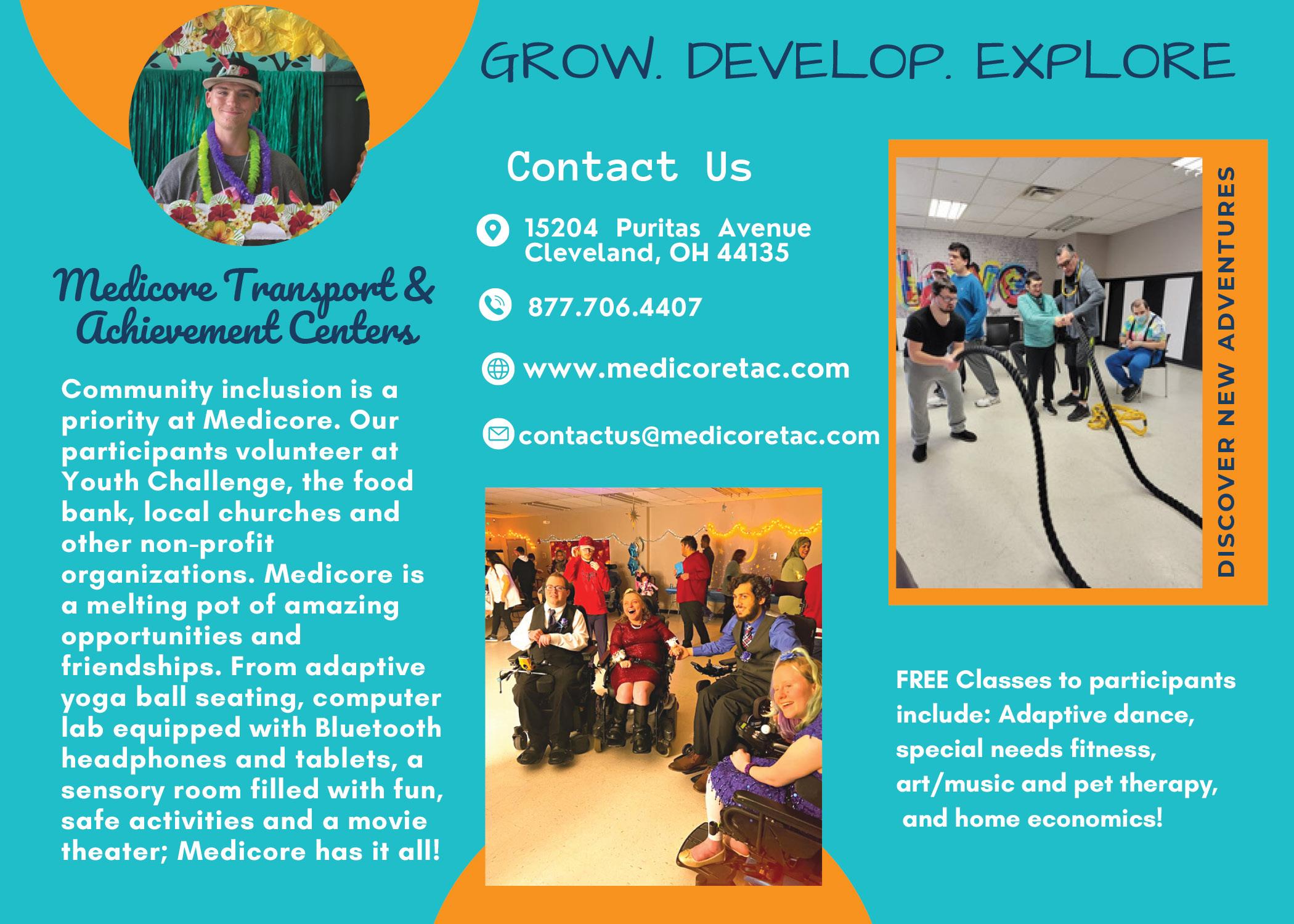
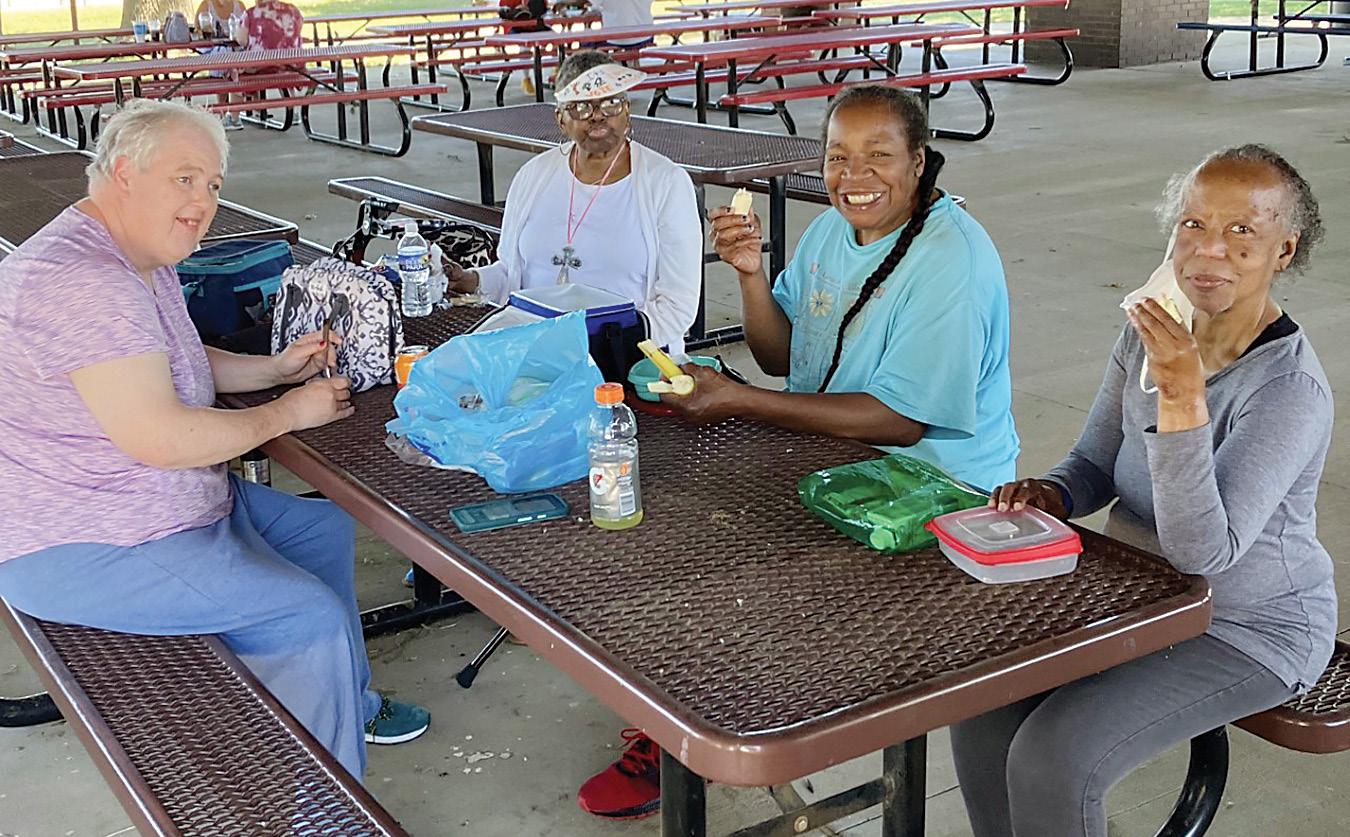
“Participants can get a different type of programming by being with us, by carriage driving or doing ground-based programming learning about the horses for an hour. They’ll do that for two hours every week for about eight weeks.”
Vincent says it’s always remarkable to see what individuals can accomplish.
“We have people who can get in a carriage and control a thousandpound animal to walk and to trot and to go out on trails,” she says. “These are individuals who are not in a place
of autonomy in any other aspect of their life, yet they come here and control a thousand-pound animal. That’s amazing, and they know it. Their parents, caregiver or aid, or whoever is with them is cheering them on, or their group is cheering them on and it’s just wonderful.”
livespecial.com 2022-23 21
Through day programs, individuals can go on field trips, learn to use public transportation and become active members of their community.
Your Child‘s Future: Explore Paths and Support
TRANSITION TO ADULTHOOD
Between the ages of 14 and 22 is the time when students receive school services and prepare to graduate. It is important to start at age 14 for the final high school years and future plans.
Along with your school, there are other agencies that can assist you with meeting future goals. As you begin planning for your child’s transition to adulthood, boards of developmental disabilities and agencies should be invited to annual meetings and join your planning team.
CREATING A TRANSITION PLAN
By age 14, transition planning should begin and be included in the individual service plan (ISP). It should have a statement related to planned educational or training experiences that may lead to an eventual career path. This is an important time to advocate for your child and create a transition team.
WHERE TO BEGIN: HOW SERVICES START
It is important to know as much as possible about the system and who to call for assistance. An Ohio Department of Developmental Disabilities video, ”Explanation of DD Services and Eligibility,” can answer some of the initial questions you may have on DD services and eligibility. Next, call your local county board of developmental disabilities to begin determination of eligibility for county board services.
HOW YOUR LOCAL COUNTY BOARD CAN HELP: TRANSITION SPECIALIST
Once determined eligible for services, your local county board will be important.
For example, the Stark County Board of Developmental Disabilities has transition specialists who will work with your school and connect you to outside agencies such as Opportunities
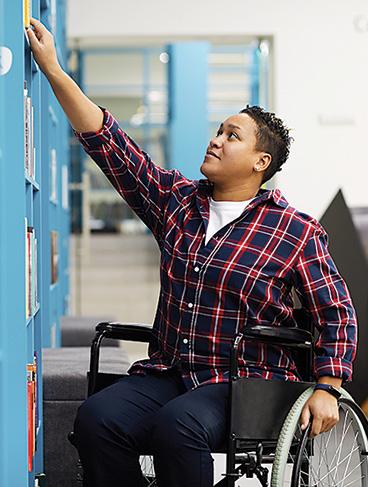

for Ohioans with Disabilities.
Transition SSAs explains services available to your child upon graduation through your local county board of DD, including Medicaid waivers, waiver waiting lists, and vocational opportunities/day programming available for adults.
EXPLORING CAREER PATHS
As your child ages and becomes an adult, if they continue receiving DD services, the state mandates that your SSA review the path to employment with you annually. This is so you know your options and there is help for your child to be as independent as possible.
THE BRIDGE TO ADULTHOOD
It also may be valuable to consider special needs trusts, or a STABLE account. Around the age of 18, application for necessary benefits should be considered (Social Security benefits, Social Security Disability Insurance, and Medicaid).
Need Help during transition, Stark DD Navigation Tool, starkddnav.org.
22 livespecial.com 2022-23
PLANNING
Why Experience Matters When Looking for Day Services and How to Ask Providers
When you and your family are looking for services, experienced staff is an important factor to consider. Question the providers about staff’s direct work experience with adults with developmental disabilities.
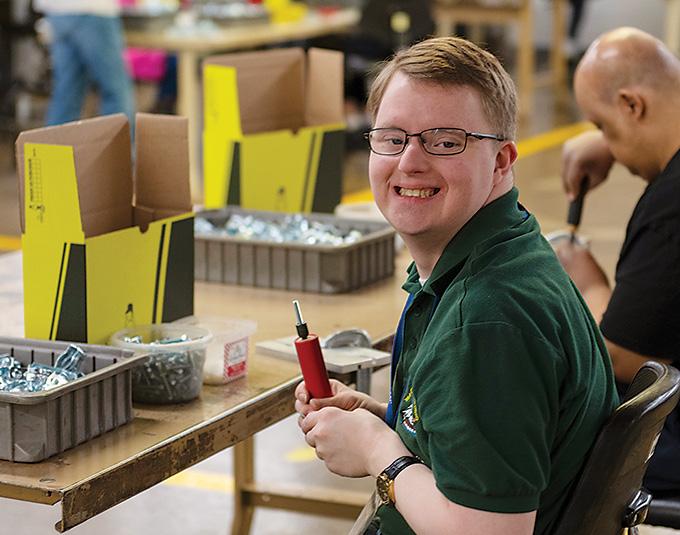
Experienced staff have long tenures and create an environment with very little staff disruption. All of this leads to your child’s stability, growth, and skills achievement in the day program setting. The security and relationships they have with staff and peers help your child identify the right path for them.
Direct service staff should be highly trained to respond to any situation that may arise. Training should take place annually with diverse subjects offered that exceed state mandates.
Communication is the foundation of
care. Experienced staff understand your shared goals — to improve well-being, confidence, quality of life and participation in family and community. With staff experience comes the ability to interpret verbal and nonverbal communication. Though every individual is unique, success rates for quality communication between staff and individuals improve experience.
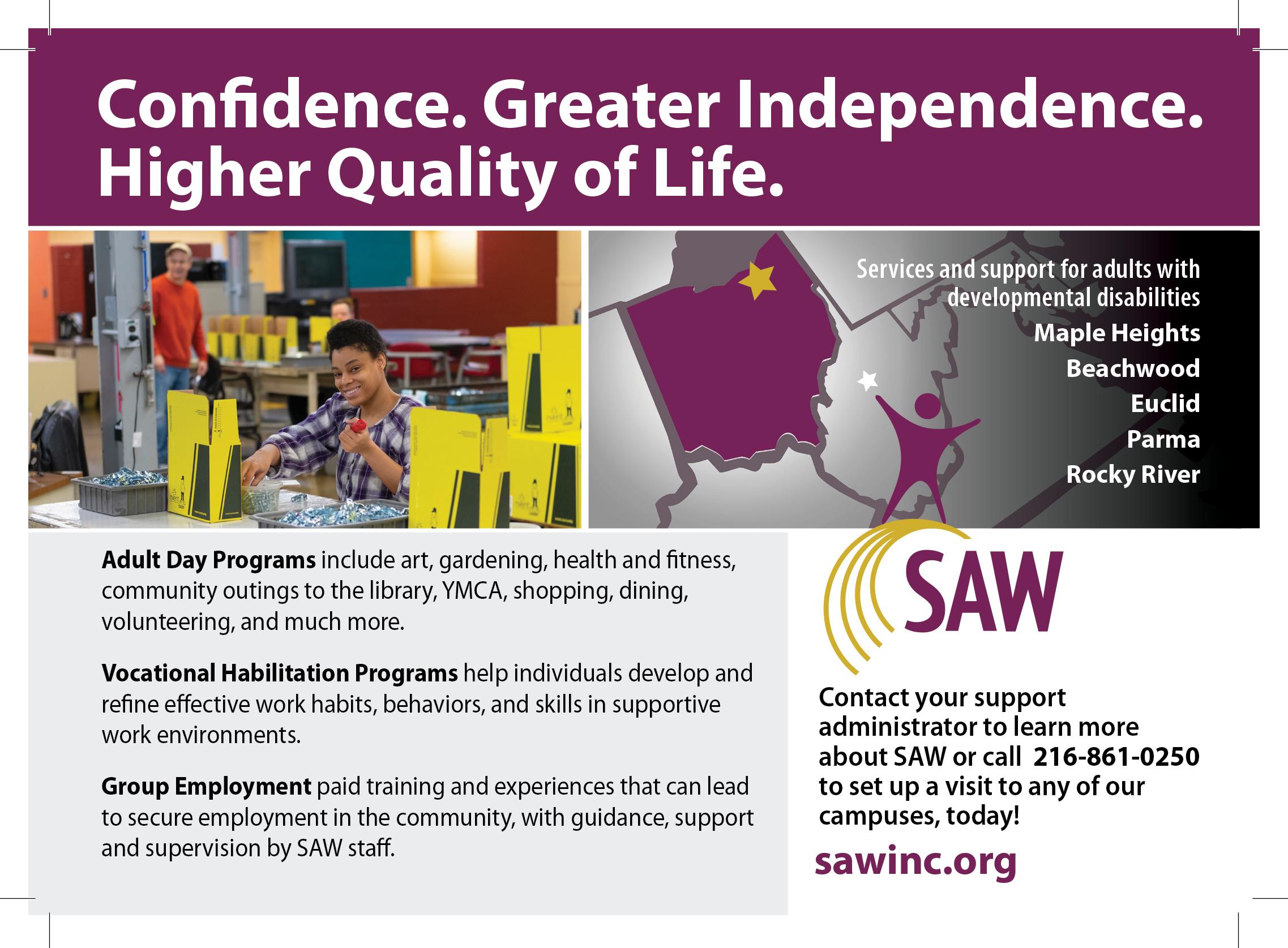
When you are touring a day Program be sure to ask questions such as:
• What is the staff turnover rate? What is the staff to person ratio?
• How many years of experience do your staff have in this field?
• What does a typical day look like?
• How is information/progress reported to me?
As parents and or family members you are your child’s voice and you must speak up and advocate for them to have the best, most experienced staffing possible.
livespecial.com 2022-23
OF
PHOTO COURTESY
SAW
PLANNING
Navigating Life’s Transitions
Alana Gohn, who was the inspiration for LiveSpecial.com, gains skills and independence as she grows.
By Angela Gartner
and enjoys going down waterslides.
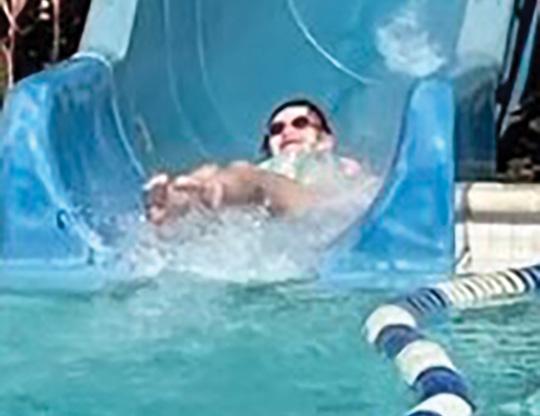
“We are letting her be more independent in the pool,” Eisner says, adding that recently, Alana was able to go play with other kids, while still under the watchful eyes of Eisner and Gohn.
“We were so happy,” she says, adding it allowed Alana to have some distance for the first time from her parents.
Alana’s not just a swimmer, but also skis and hasn’t missed a season since she was little. She also loves riding with her dad on the two-person tandem bicycle.
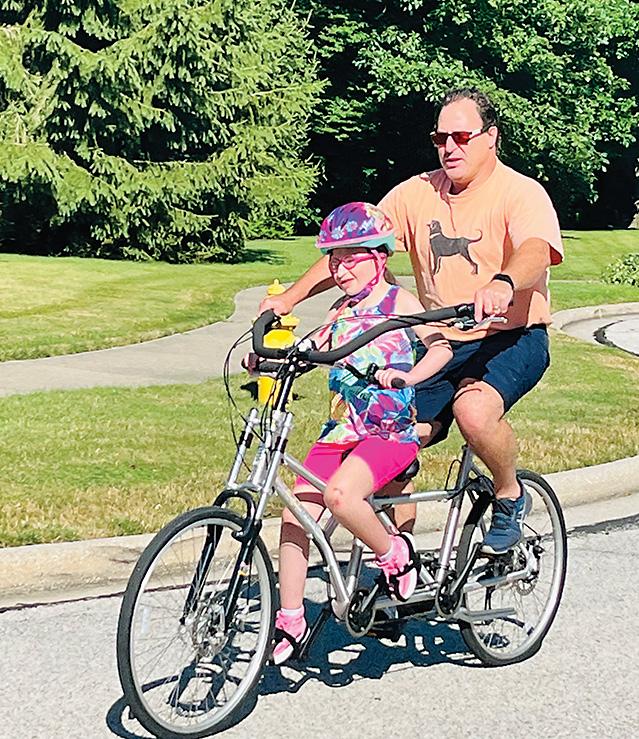
Eisner says their family has tried different activities with Alana and while some have worked, some haven’t. She recommends that families just try new things.
“I think the more things you try, something will resonate with your child,” she says. “It’s important to keep individuals with special needs as active as possible to help live a healthy lifestyle, instead of a sedentary one that could lead to health issues such as weight gain. There are many family support (options) for the counties you live in and numerous places to get children engaged in the community.”
One of the biggest challenges, Eisner says, is getting caregivers and the costs.
“It gets more and more difficult as the kids get older,” she says. “We just don’t go out as much or try to take Alana with us. I see it being a challenge and families are struggling.”
As Alana grows, Eisner says they are still working on inclusion and social aspects. Those years of everyone in quarantine during the COVID-19 pandemic made it difficult for social interactions.
Alana Gohn, 13, of Solon, who was diagnosed with microcephaly as an infant, is becoming more independent, according to her mom, Elaine Eisner.
“She is like all teens who get a little moody,” Eisner says. “She is a little more stubborn and does a sit down strike if she doesn’t want to do something.”
This can be difficult because Alana is nonverbal, but Eisner says as parents, she and her husband, Scott Gohn, are trying to let her be as independent as possible.
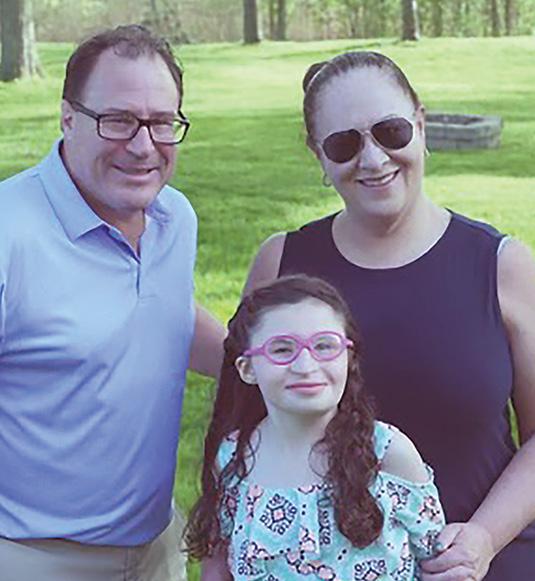
Alana, who has been swimming since age 1, has become more adventurous
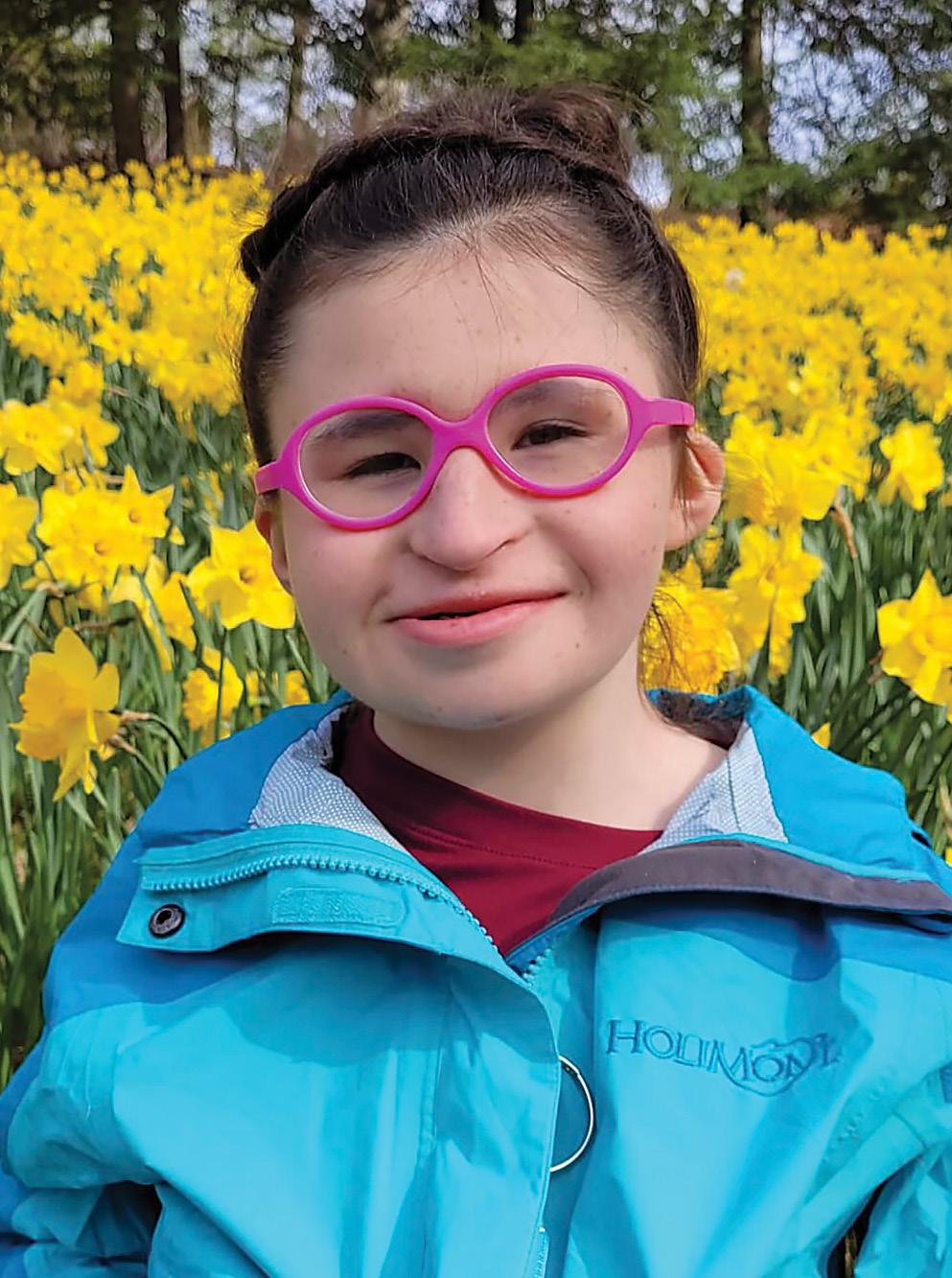
Eisner says they have used services like Friendship Circle, which provided an opportunity for Alana to meet a new friend and spend time with them weekly.
“I feel strongly that we should always be keeping her moving forward,” Eisner says, adding that they don’t yet have an answer of what the future holds for Alana.
“(We’ve started) thinking about what she can do and continue with therapies the rest of her life,” she says. “We always think about her and we will still be doing anything she needs and whatever we can for her no matter what age or grade (she’s in).”
24 livespecial.com 2022-23
PHOTOS COURTESY OF THE GOHN FAMILY
(above below) Alana Gohn, dad, Scott Gohn and mom, Elaine Eisner. (far right) Alana loves riding with her dad Scott Gohn on the two-person tandem bicycle. (above middle) Alana enjoying herself on the waterside.
By Angela Gartner and Lindsey Geiss •
by Mariana Edelman
Being a champion can mean to inspire, to take on a cause, be a voice in the community and to know how to be an example for others to follow. NCJW/Cleveland receives submissions from individuals for its Celebration of Champions Awards, which provides an opportunity to honor people living with a disability and people making a difference
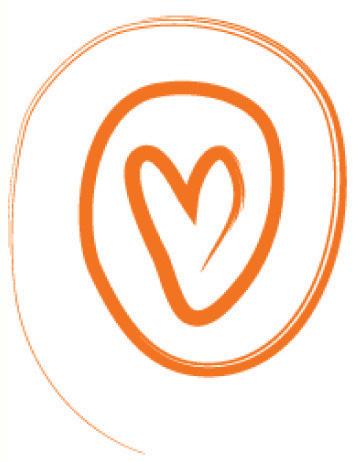
for those with disabilities. In 2022, 15 people were honored with gold, bronze and silver awards, along with a $500 prize toward an approved program, service or adaptive device. The award ceremony was held in-person in June at Landerhaven in Mayfield Heights. Here’s a little bit about each winner to show why they were chosen for these honors.
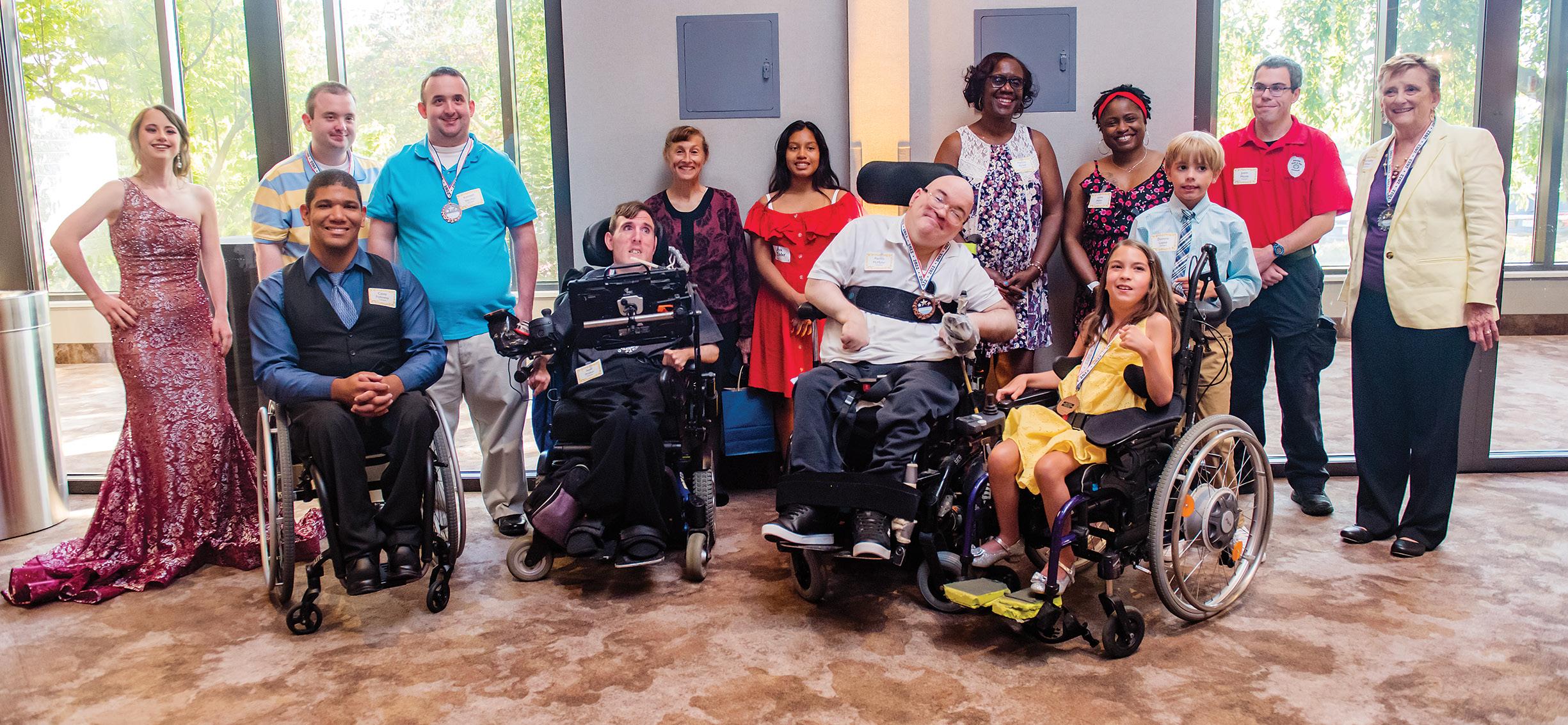
livespecial.com 2022-23 25
NC J W CLE STRONG WOMEN POWERFUL VOICES
Photography
Gold Awardees
OLIVIA DEPIORE, of Twinsburg, is a champion for inclusion, inspiring others through her self-advocacy, hard work and training as an international model paving the way for people with Down syndrome in the fashion industry. With a contagious smile and positive attitude, the 25-year-old has graced the covers of magazines like “Haute Ohio” and modeled at New York Fashion Week, in addition to fashion weeks in Ohio, Paris, Dubai and Milan, plus various competitions.
A shopping trip for a high school dance dress led to a photo shoot with local designer/boutique owner Darlene James, launching Olivia’s modeling career.
Olivia stresses the importance of kindness, manners and being polite, while Vicky advises other parents and advocates, “Don’t accept mediocrity from your child or from society. Always challenge and encourage others for acceptance, and say it’s okay to be different because we all are.
Her path to get here was not without obstacles — Olivia is a childhood cancer survivor. Diagnosed with leukemia at age 6, she underwent chemo and treatments for three years. She and her family became active in the American Cancer Society, raising more than $100,000 for cancer research and treatment.
Aside from her large supportive and inclusive family, Olivia cites Matthew Socrates, her “amazing teacher of four years at Twinsburg High School," as an advocate and influence in her life, including her dog’s namesake. The two still keep in touch.
As a student of modeling, Olivia spends hours each week reviewing books, magazines and videos, practicing poses for both still shoots and the runway. Outside of honing her craft, she works at McDonald’s and is looking to challenge her skills through other opportunities.
"We are making strides as a society, trying really hard to accommodate, but we’re not there yet," her mother Vicky says. "I appreciate when companies make an effort."
Olivia recently was invited to join a new nonprofit board and will soon be recognized as a “Profiles in Diversity Journal” Women Worth Watching in Leadership.
“The community is amazing,” Olivia says. “I’m really happy and proud (about getting calls from young ladies with Down syndrome, autism or who are in wheelchairs, and being invited to speak). It makes me more confident being out there.”
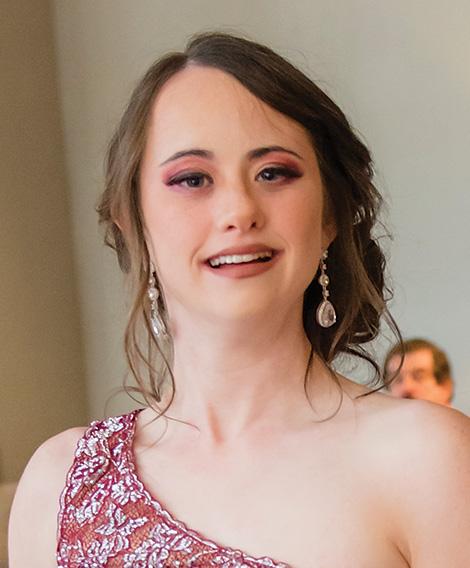
We all have some type of skill," Olivia says."Take that skill and run with it. I want to teach others to know they can do what I am doing. It’s possible."
AVA ZAHLER, of North Canton, is a nationallyranked figure skater whose contributions on and off the ice make her a champion. Driven by a passion for helping others and her own journey with severe learning disabilities — including dyslexia — this 14-yearold Hoover High School freshman’s community involvement supports children with and without special needs, adults and animals alike.
Ava’s determination and compassion were apparent at a young age. Labeled “failure to thrive” as a baby in foster care in Guatemala before being adopted at 5 months, she grew into a gifted skater (starting at 14 months), singer, dancer and cheerleader.
Ava now works as a volunteer teacher at Center Ice Sports Complex. She also has contributed to her dance studio’s effort to purchase dance wheelchairs for students with disabilities. She created an audio book section in her school library. Her project, Special Books for Special Kids, received a Youth in Action grant sponsored by Character Counts in North Canton and was honored by the Junior League of Stark County. Her efforts also raised $200 for the Children’s Dyslexia Center of Canton to purchase special phonics books for children. She applied for and received a second Youth in Action grant in middle school for her Birthday Wish Project, which raised money reading and art supplies, as well as gift cards for Volunteer Services at Akron Children’s Hospital.
“When she was diagnosed in third grade, the specialist said it was one of worst cases she had ever seen,” Ava’s mother, Mary Lynne says.“School is hard. A 15-minute assignment may take her an hour, so she could be doing homework for three hours each night. Ava works really hard, and we are so proud of her.”
Ava wants people to understand that children with dyslexia can be successful readers.
"To help others understand what it is like to have an invisible disability," Ava explains, “It feels annoying and frustrating, like everyone is watching you, wondering why you can’t do something or why it takes you longer.”
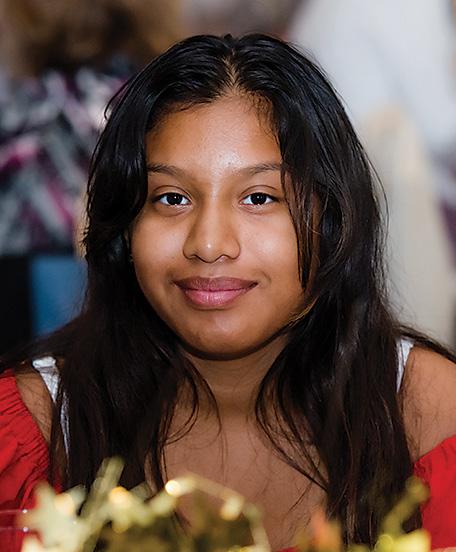
She advises other youth, “Even though it can feel awkward, ask for help.”
The Zahlers encourage trying new activities and asking about needs in the community to identify opportunities to help.
“It feels very awesome to get this really big honor,” Ava says. She wants other youth to know that, “things may not be the best right now, but it gets better as time goes on. Don’t give up. Keep pushing.”
26 livespecial.com 2022-23
CASEY FOLLOWAY, of Wooster, understands how sports provides a multitude of opportunities for mental and physical health.
He says that as a kid, he always wanted to be on the court like basketball player LeBron James.
Casey, who was born with spina bifida, has been involved with Adaptive Sports Ohio and was the inspiration for the organization. His mom, Lisa Followay, got the idea because of his passion for sports, and wanted to give him and others the opportunity to play.
“I really struggled mentally with my emotions when I was very young,” Casey says. “In 2009, (my mom) had a great idea of starting a non-profit organization to reach out to other people in the community with the same disabilities.”
Adaptive Sports Ohio has grown, and its mission is “to remove barriers to ensure that individuals with physical disabilities have a chance to play and utilize sports to elevate ability and empower futures.” It provides programs in adaptive sports, access to equipment, and school support for those who want to participate in interscholastic sports.
Casey is an athlete in sled hockey, basketball, and track and field, but he says he’s tried pretty much everything, from lacrosse to tennis. In fact, as a champion, he donated the $500 award to Adaptive Sports Ohio for sled hockey equipment.
He’s most passionate about track and field, competing at high levels including Team USA in the Para-Pan American Track and Field Games. He was the first wheelchair racer to join his high school track team in the Ohio High School Athletic Association.
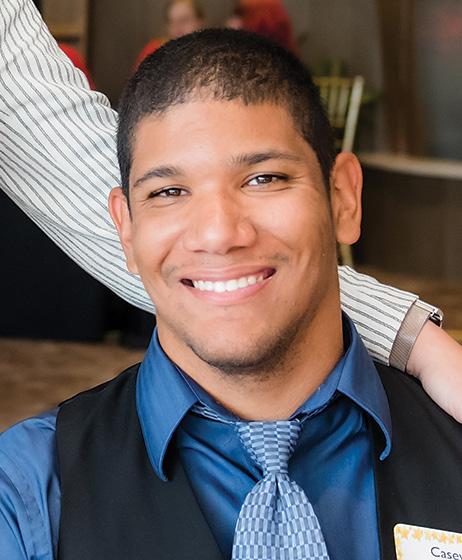
He hopes to represent the U.S. in the Paris 2024 Paralympic Games for track and field in the 100 meters.
For everyone interested in participating in a sport, it doesn’t have to be elite. Casey stresses the importance of getting involved.
“A lot of people hesitate to get into sports because they don’t think they have the physical ability and sometimes struggle on how it will benefit them as a person,” says Casey, who also works at Adaptive Sports Ohio. “(We) try to find ways to show these athletes what is possible regardless of disability or age.
“We realized that we were not alone, there were people with the same struggles — and not just with people with disabilities. Thankfully, I found my group of people who have helped me. My mission in life is to show people that they are not alone, they can just do things in a different way.” adaptivesportsohio.org
HEIDI SOLOMON, of Beachwood, is the program manager for the Horvitz YouthAbility program, an initiative of the Jewish Family Service Association that serves disabled and at-risk youth by engaging them in volunteer service, vocational activities, and social enrichment.
The YouthAbility program participants are referred to as ambassadors to acknowledge their role in representing themselves, the agency and others just like them.
Heidi, who has run the program for nearly 17 years, says it’s an honor and a privilege to work with the YouthAbility ambassadors, as she believes they are among the greatest young adults in the area.
“I feel so fortunate to be in the position to highlight their abilities to the people in the community,” she says.
Heidi has assisted thousands of ambassadors, all of whom she has tried to help find meaningful experiences that match their strengths, abilities and availability.
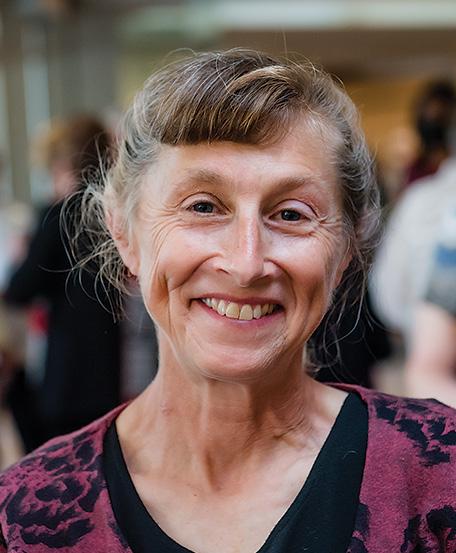
“I think each and every person has unique gifts — they each have individual strengths and I aim to put them in situations structured for their successes.” she says. "The goal is always having them moving one step in the right direction -- with supports as needed."
She also has organized various projects, including using art to decorate a van with the youth group with the theme, “Promoting values to help the community.”
“YouthAbility is dedicated to vital values such as diversity, inclusion, respect, teamwork, kindness and more, which are written on the back of our van to spread positivity,” she says.
When possible, Heidi encourages YouthAbility ambassadors to advocate for themselves. During a trip to Washington D.C., the group had meetings on Capitol Hill to encourage inclusive language in a bill. Locally, ambassadors attended an RTA meeting to express the need for access to transportation.
She has worked with business leaders in the region to educate and help support them in understanding what people with disabilities can bring to their organizations.
“If someone is not treating our group fairly, I see it as an opportunity to engage and educate,” she says. “I want to share the belief that people with disabilities can enhance our communities instead of being pushed aside.”
“I think the Cleveland community, has so many great opportunities for our young people,” she says. “If we all open our minds to the possibilities of their abilities — we will all be inspired."
livespecial.com 2022-23 27
Silver Awardees
Salina Miller, A.A., of Maple Heights; Patricia Parker, B.A., of Olmsted Falls (previously Maple Heights); and Nikki (Charisse) Montgomery, M.A., M.Ed., of Euclid, all are devoted parents of children with disabilities, nonprofit leaders, and champion storytellers shining a light on the path
for successful caregivers and advocates. Together, they wrote the book, “We Dare Be Brave: African American Mothers and the Emotional Journey of Raising Children with Disabilities,” which honors and validates the emotions of parents raising children with disabilities.
PATRICIA PARKER, of Maple Heights, is the founder and director of R.E.A.C.H. Services (Resource, Education and Community Help), a nonprofit founded in 2012 that helps families with disabilities in Cleveland and surrounding suburbs navigate and connect to services. As the parent of two adult sons, she shares how her now 32-year-old son Matthew’s autism diagnosis changed her life.
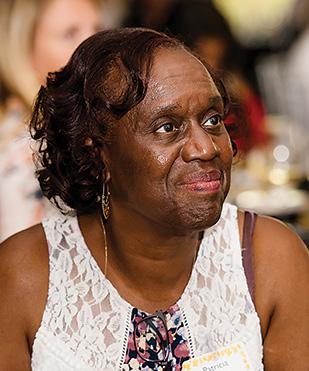
“I developed this purpose for him to reach his potential that overflows to other families,” Patricia says. “I started this journey in the early 90s when there was very little information and resources. Especially being a person of color, where I was living, navigating, understanding and identifying systems was very difficult for me. I felt so isolated and had to go outside of my community to find any supports. I definitely want to make it easier for someone else, so no one else has to go through the significant struggles I went through.”
Patricia stresses self-care and encourages families to look at mental health services as a resource, “I was very transparent about PTSD and mental health struggles as caregivers often suffer in silence,” she shares. Also, addressing, a perhaps lesser-known concept that so many caregivers feel — chronic sorrow. A new collaboration between R.E.A.C.H. Services, Mother 2 Mother, and Hope Behavioral Health Services is working together to address mental health, psychotherapy and spiritual care through parent support in conjunction with therapy services. Facebook.com/reach4service
NIKKI MONTGOMERY strives to improve equity, inclusion and the quality of family engagement as executive director of Madvocator Educational and Healthcare Advocacy Training, which helps build advocacy skills for families and trains professionals to engage more effectively with them.
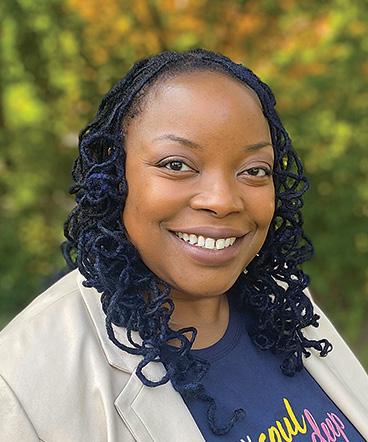
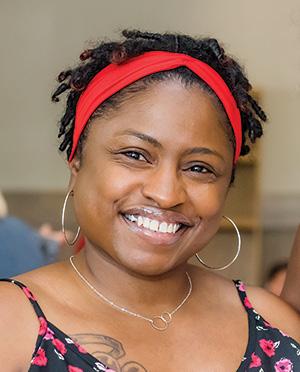
Her experiences as an educational psychologist, communications expert, patient advocate, and the parent of a son with complex healthcare and educational needs led her to create Madvocator (“Sometimes, you have to get a little mad to change the world”) in 2015.
Nikki also is the author of the “Super Safe Kids” book series and curricula, which includes “The Spine Surgery Book for Kids,” co-authored with her son, Richie. Aligned with evidence-based practices and national safety initiatives, the materials focus on family participation and self-advocacy as tools to improve safety for children, especially those with disabilities or complex medical needs.
Nikki’s extensive community involvement extends from local to national initiatives to improve health, eliminate disparities, and increase activation and engagement. It includes serving on the Board of Directors for University Hospitals Rainbow Babies & Children’s and on the Global Patient and Family Advisory Board for The Beryl Institute, as well as an advisor for the Center for Medicare and Medicaid Services Person and Family Engagement Network, among other affiliations.
“I want professionals and families to be empowered to work together for the best outcomes and shift the focus to those with the greatest need,” Nikki says. “Everything I do falls in line with that.
“I appreciate there are spaces in the community that recognize the efforts made on behalf of those with disabilities, she says. “There is still much more to do. [LiveSpecial] sets up an area we should be recognizing, and it does our community good to be working in service of those with disabilities.
“Everyone needs champions,” she emphasizes. “I’m hoping my son will be his own, but until then I take on that role and help him build his skills. You don’t have to be in the field of serving people with disabilities to actually serve and help.” (madvocator.org)
SALINA MILLER’S parent connection group, Mother 2 Mother, is a 501c3 organization that hosts virtual monthly support meetings, as well as outings, training and education.
“We are taking everything we have done since 2017 and conducting research on the actual needs of the community to ensure gaps are being filled,” she explains.
A mother of two sons, her passion for service emerged with the birth of her son Elijah, who has multiple complex medical conditions, including autism. Salina also serves as a parent representative on Ohio’s State Support Team 3; a member of University Hospitals Rainbow Babies and Children’s Patient and Family Partnership Council; and a parent involvement specialist for Warrensville Middle School. She also has worked for Milestones Autism Resources as the diversity, equity and inclusion coordinator and is a recipient of the National Nurses Coalition’s Unsung Heroes Award. She advises families to “have a safety net even before the transition phase for who will take care of your child if you leave this world. “People forget that children are only in the school district for a certain amount of time, and they are adults forever,” Salina explains. “Some are not thinking beyond the day-to-day. Consider what adult life looks like, from housing to financials. Put together a will, and connect with your county board early.
“We need community,” she adds. “Even though I created one, I realized I needed them more than I think they needed me. My community has been an asset to me and Elijah.” mother2mother.info
28 livespecial.com 2022-23
PHOTO COURTESY OF NIKKI MONTGOMERY
DOMINIC LOPEZ, 9, a baseball player and the youngest champion, is open about his autism diagnosis and is helping others to understand that while it’s part of his identity, it doesn’t define him.
“People sometimes think you can’t do that because you’re autistic, but you can really do anything, if you want to do it,” he says.
His mother, Estee Ezinski, says Dominic was 2 when he was diagnosed with autism. The family went through the steps to support him, including early intervention.
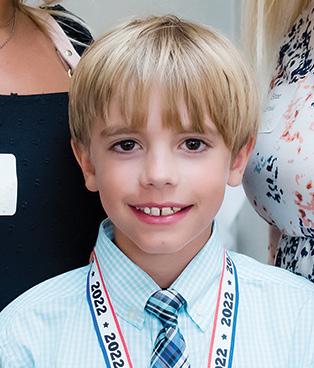
Dominic has spoken on a panel at the Milestones Autism Resources National conference and works with Crisis Intervention Team training of police officers to help their interactions with people who have autism.
“In their mind, they have created this image, but when he comes on camera, he presents a typical 9-year-old boy,” Estee says.
“It’s really good for them to realize that there’s not a face to autism; every kind of disability is different for anyone.”
When Dominic found out he was going to be a champion, he was excited. There’s been a lot of things to be happy about this summer, including his favorite pastime: baseball.
“It’s fun playing; I like making new friends and playing the sport,” Dominic says. His mom says it also has helped him socially and with his processing skills.
Dominic says that if something goes wrong on the field, like an error, “to take deep breaths, don’t worry and just (focus) on the next time. Just believe in yourself and don’t think you can’t do it,” he says.
DOROTHY MILLER, of Cleveland, has dealt with hearing loss since she was in her 30s and became her own advocate, learning everything she could about it.
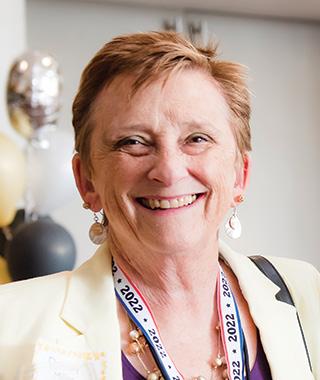
She discovered the hearing loops while visiting family in England. According to Dorothy, the loop provides a direct transmission of sound into the hearing aids of people who can get connected. Dorothy has become a voice in the community to get these loops installed in public places. She is a founding member of the Loop Initiative Group of Northeast Ohio (LIGNO), whose goal is the widespread availability of hearing loops. She helps others understand the experiences of people with hearing loss. Dorothy has learned how technology can be utilized to maximize engagement with the world around those with hearing loss, specifically hearing loop technology. While there are many loops in other states, she says more and more churches are beginning to recognize the importance. She says this is what drives her, to make it widespread in Northeast Ohio. “To install a loop, (they) will find it fairly easy,” she says. “(It’s important) to be able to participate. (People who are hard of hearing), don’t know what is being said. It’s the ability to communicate in civic or personal life.“I am hoping theaters and places, such as city council meetings, will place loops,” Dorothy adds. “More people can go and participate, as right now they are shut out.”
SEAN WALKER, of Parma, champions access to communication support and team sports for people with disabilities, never letting cerebral palsy, quadriplegia and scoliosis slow him down. “I don’t look at my life as being disabled,” he says. “I live my life because it’s my life. Until sixth grade, my mom did all my advocating, then I started participating at my own IEP meetings and that taught me how to advocate."
Sean uses eye gaze technology and a fully functioning laptop to communicate, with support from a home health aide as needed. He now teaches others how to use communication boards and related tools, something he is passionate about as an ambassador for PRC-Saltillo, a global leader in augmentative and alternative communication (AAC) solutions and assistive technologies for people with speech disabilities. Sean is passionate about helping others. Sean also has served as a Good Life Ambassador for the Cuyahoga County Board of Developmental Disabilities since 2017, presenting on disability topics and building bridges in the community. When he is not working, he enjoys sports. He coaches boccia, a Paralympic precision ball sport similar to bocce at Youth Challenge. He studied and taught himself the game, then built an eight member team of various ages that will soon compete at the National Championships in Cedar Rapids, Iowa. “All you can do is set the bar high and roll with it when you need to,” Sean says.
Bronze Awardees
PATRICK MCMYLER, of Cleveland Heights, is a champion advocate who draws on his own life experiences with cerebral palsy to assist others in advocating for themselves.
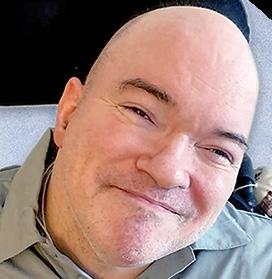
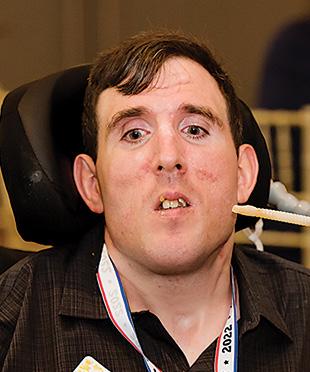
As a Good Life Ambassador for the Cuyahoga County Board of Developmental Disabilities since 2021, he shares more than 40 years of personal stories and expertise as a self-advocate to educate and inspire the community to be more inclusive. Known for his sense of humor and passion for writing poetry and music, friends and family refer to him as “an excellent teacher.” After graduating from Cleveland Heights High School, Patrick worked at the United Cerebral Palsy workshop and volunteered at a music studio downtown where some of this work was played on WMMS radio. At the age of 35, he went back to school at Cleveland State University to study music and English.
He credits his parents, brothers and sisters with providing a strong foundation and nurturing his passions.
“If you see your child has some type of talent, please work on that with them,” he advises parents. “There are so many obstacles that disability takes over, but I believe that talent or passion will bring them out of their shell.”
When asked about overcoming challenges and what it takes to be a strong advocate, Patrick says, “I learned to get a backbone. Keep your eyes and ears open, and be positive. Always fight for the underdog, because it can make them believe in themselves and they can be a better person. We need people to stand up for those who can’t stand up for themselves.”
livespecial.com 2022-23 29
PHOTO COURTESY OF TPATRICK MCMYLER
JUSTIN MEADE, an officer with the Hubbard Township Police Department, recognized there needed to be more training to first responders and other organizations on their interactions with people with autism and other special needs. He knows the importance professionally, but also personally as a father of a 7-year-old son with autism and epilepsy.
As someone who experienced this interaction on both sides, he founded the Autism Awareness Training and Acceptance Program (AATAP) in 2019. The program provides free awareness and acceptance education, practical crisis intervention and de-escalation training to first responders and other organizations. AATAP also provides resources and training for people with disabilities and their families.
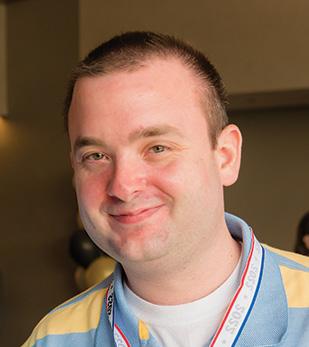
Justin says the program has provided this free training to 650 first responders, most in the Northeast Ohio region, but also other cities in Ohio and different states.“We pretty much go wherever and donate our time in doing it,” he says. “We not only help first responders, but also work with churches and other organizations that are trying to be more inclusive and accepting.”
Justin stresses the importance of this being a two-way street, in which safety and quality of life can be improved for individuals, their families and first responders.
He suggests that families who have individuals with special needs reach out to their first responders, particularly police and fire departments. “Set up a time for their loved ones to meet them, check out the emergency vehicles, take that time to get to know (the first responders),” Justin says, adding it will help their interactions with the responders in emergency situations, who will in turn have a better understanding of how to help your loved one. Justin says families can recommend the free AATAP training to the first responders. “It’s really important, and if I had my way, every first responder would become an expert on this,” he says. “We know it’s not feasible (right now), but we do the best we can.” Facebook.com/Aatap4all
DOUGLAS VECCHIO, 28, said that when he was younger, he thought he might be a doctor. Then he realized there was a lot more to the healthcare field than patient care.
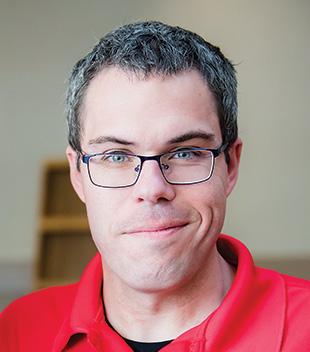
“There is so much (happening) behind-the-scenes,” says Douglas, who explored the different programs.
“Information technology seemed like a perfect fit.”
He went to Lakeland Community College for a registered health information technician (RHIT) degree. While Douglas had an interest in healthcare and is currently working as an RHIT, his advice to others is to try different things, shadow jobs and talk to other people.
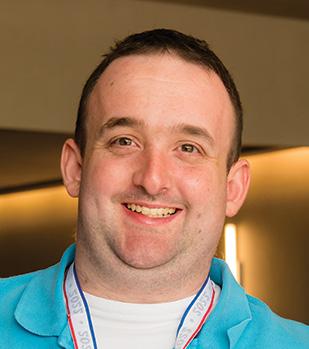
“Just think positivity,” he says. “It’s not always easy to do, but take one day at a time.” His mom, Leslie Vecchio, told him, along with his twin brother Kenneth, that they received the LiveSpecial.com Celebration of Champions award in which she submitted them both. “It felt nice to be honored and recognized for my work and for my brother,” he says, adding his goal is to keep moving up in his job, and get a place of his own with his brother.
Douglas says people with disabilities just have to advocate for themselves and to know their strengths and weaknesses. “If you are struggling, ask for help,” he says, adding that his parents tell him if there is something wrong, to speak up. "Also, try not to compare yourself to others.”
He hopes employers will take time to educate themselves about workers. “People with disabilities are just as capable as someone (without disabilities),” he says. “There are laws for accommodations (referring to the Americans With Disabilities Act), but there is more that could be done.”
KENNETH VECCHIO, 28, a graduate of Brush High School, attended Auburn Career Center. He then began to apply for jobs and was hired at a machine shop in Chesterland.
“The training was mostly on-the-job, so they helped me out learning the different machines," he says. "I like working at the machine shop, working with my hands,” adding that was something he liked to do when he was younger.
While getting into the workforce isn’t always easy, Kenneth advises people who are still looking for employment to be patient.
“Keep applying, because you are not going to get the first job you apply for," he says. "You learn from interviewing and talking about the job. Just don’t give up.”
Kenneth adds that having the right supports, whether it’s family or other organizations, who can help with job skills and training is important.
He recommends finding something you are really passionate about and trying to find a job in it. He also says not to be afraid to ask for help or support.
While not at work, Kenneth says he likes hanging out with friends and watching sports. His hope for the future is to have a place of his own with his brother and get a new car.
He advises people with disabilities to create awareness in the employer community.
“Let employers know that regardless of a disability, you should be able to do the job like anyone else,” Kenneth says.
30 livespecial.com 2022-23 Bronze
continued
Awardees
MOLLY DURHAM is a smart, funny, fourth-grader at St. Jude School in Elyria. Molly, who was diagnosed with cerebral palsy, loves to sing, is a cheerleader, dances for North Pointe Ballet and has begun classes at Dancing with Wheels. She also likes to hang out with her close friends and talk with them on the phone. For her future, she hopes to be a first-grade teacher. She does have some experience in front of the classroom already, as she has been sharing her personal story and experience to classes in her school.
Her mom, Sarah, says it began in kindergarten when the school, Molly being the inspiration, celebrated National Cerebral Palsy Awareness Day, which occurs on March 25.
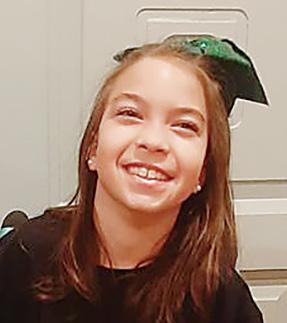
Sarah says Molly, who wrote her speech to the classes, provides an opportunity for students to ask Molly questions and bring awareness to cerebral palsy.
“I can express my feelings and sharing it with my friends makes me feel proud,” Molly says. For next year’s awareness day, Sarah says Molly has big plans.
“I think it has helped her to be comfortable talking about her disability,” Sarah says, adding she is proud of Molly for wanting to share her story.
For Molly, her advice to others on how to be a self-advocate, she says “You should be yourself and always remember that you can always share your feelings with others.”
Milestones Wins
Inaugural Lois and Larry Davis Award
Family has always been paramount to Lois Davis and her late husband, Larry. When Lois saw how LiveSpecial. com could help make families that have been touched by special needs feel more connected, less stressed, and have the ability to access the resources they need with just the click of a button, she wanted to be a key part of its development.
Over the years, Lois has supported the creation of our LiveSpecial.com website and the annual LiveSpecial.com magazine. But she knows that no one operates in a bubble — and sometimes it is the unseen champions who are
among those working the hardest to make a difference.
NCJW/CLE wanted to honor Lois in some way for her ongoing generosity and commitment to the organization, which is why it created the Lois and Larry Davis award.

Announced at the 2022 Celebration of Champions ceremony, Milestones Autism Resources won the inaugural Lois and Larry Davis Award.
“Larry’s name is on everything that I donate, I have such respect for him,” Lois says in the NCJW/CLE video interview. “I hadn’t known about autism, but when I (heard about Milestones’ efforts), I thought this is very important. I was so happy that I had the means (to help).”
The award recognizes an organization that has had a large impact on the special needs community in Northeast Ohio.
“Lois has been an amazing friend to Milestones,” says Ilana Hoffer Skoff, executive director and co-founder of Milestones, in the video interview. “How (she) approaches problems within the community. When I see (the work she’s done), it always comes from a place on how (she) can help people and make sure to preserve people’s dignity.”
Thank You
to Our Sponsors
PLATINUM
David and Jacqueline Clark Foundation Lois J. Davis
GOLD
Huntington Bank
SILVER
Bernstein
BNY Mellon Wealth Management
Glenmede
Michele and Jordan Kaminsky
New York Life - Brian Nowak Leslie Resnik
Sandi and Burt Zucker
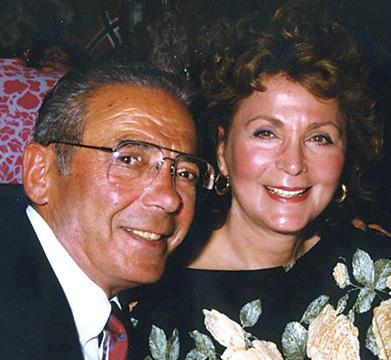
BRONZE
Sherri and Marc Blaushild
Debbie and Ken Bloom
Elaine Eisner and Scott Gohn
Wendi and Ervin Pavlofsky
JL Thomas
livespecial.com 2022-23 31
PHOTO BY MARIANA EDELMAN
PHOTO COURTESY OF THE DURHAM FAMILY
Mia Buchwald Gelles and Lois Davis
NC J W CLE STRONG WOMEN POWERFUL VOICES
/
Livespecial.com

LiveSpecial.com has grown and developed into more than just a website. It offers support through community programs, in addition to publishing an annual magazine that reaches 25,000 readers locally and is accessed by thousands online.
NCJW/CLE has always been interested in supporting ALL members of the community. In the 1980s, volunteers canvassed the area with measuring tools to collect data on accessibility and publish an accessibility guide. The guide helped people to know details about access to spaces. It also helped building management learn about issues like narrow doorways and entrances with steps. (ADA guidelines published in the early 1990s addressed these issues for all public buildings.)
A team made up of NCJW/CLE and other interested community members met to brainstorm ideas when Elaine Eisner, an NCJW/Cleveland member, approached us with the dilemma of finding appropriate providers for her child, who was born with
A decade of helping the community
multiple challenges. The team recognized that this was a community-wide need and NCJW/CLE took on it as a signature project.
“I can remember the very first planning meeting,” says Cindy Glazer, a retired educational specialist who chairs the LiveSpecial.com committee. “We were in a room full of strangers, each with a unique interest in the world of special needs. The task just seemed to grow bigger and bigger as we listed who we wanted to help and what we wanted to include in a comprehensive list that would serve the entire community.
“Once the decisions were made, NCJW/ Cleveland volunteers began to populate the site,” she adds. “We tried to select the very best providers with the most to offer. Over time, the site became a reality. Over the years it has been tweaked, adjusted and expanded.”

Years 10Celebrates 32 livespecial.com 2022-23

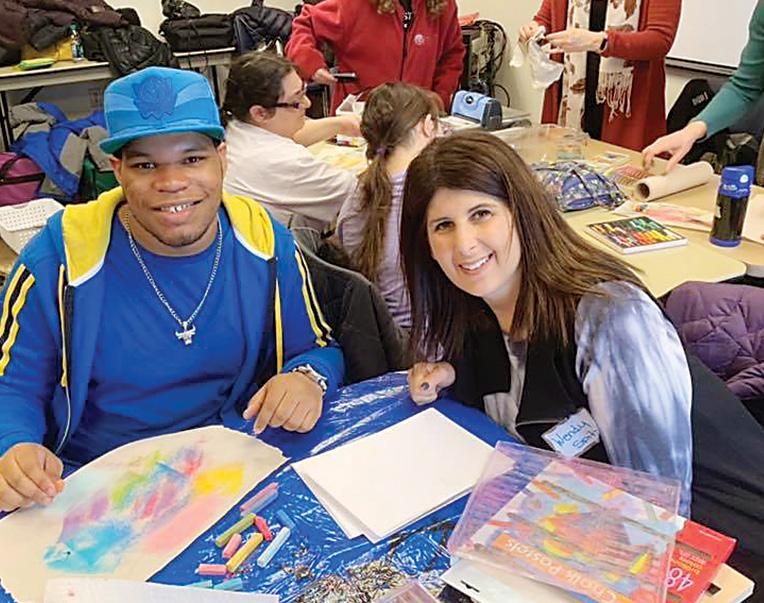
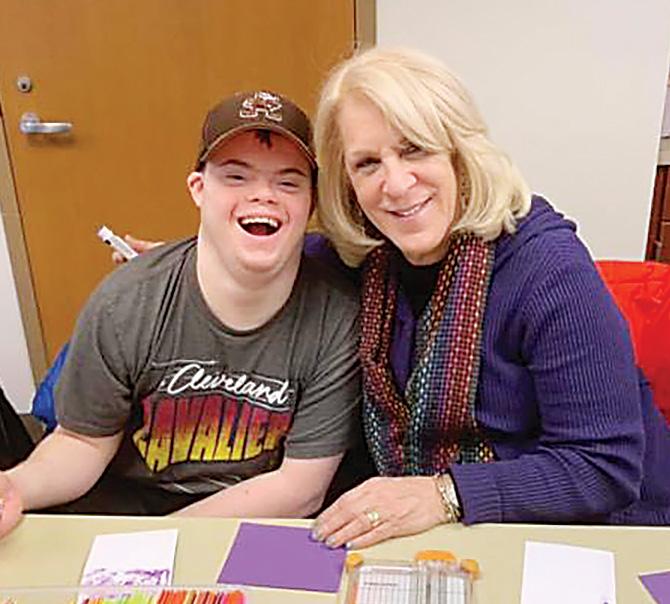
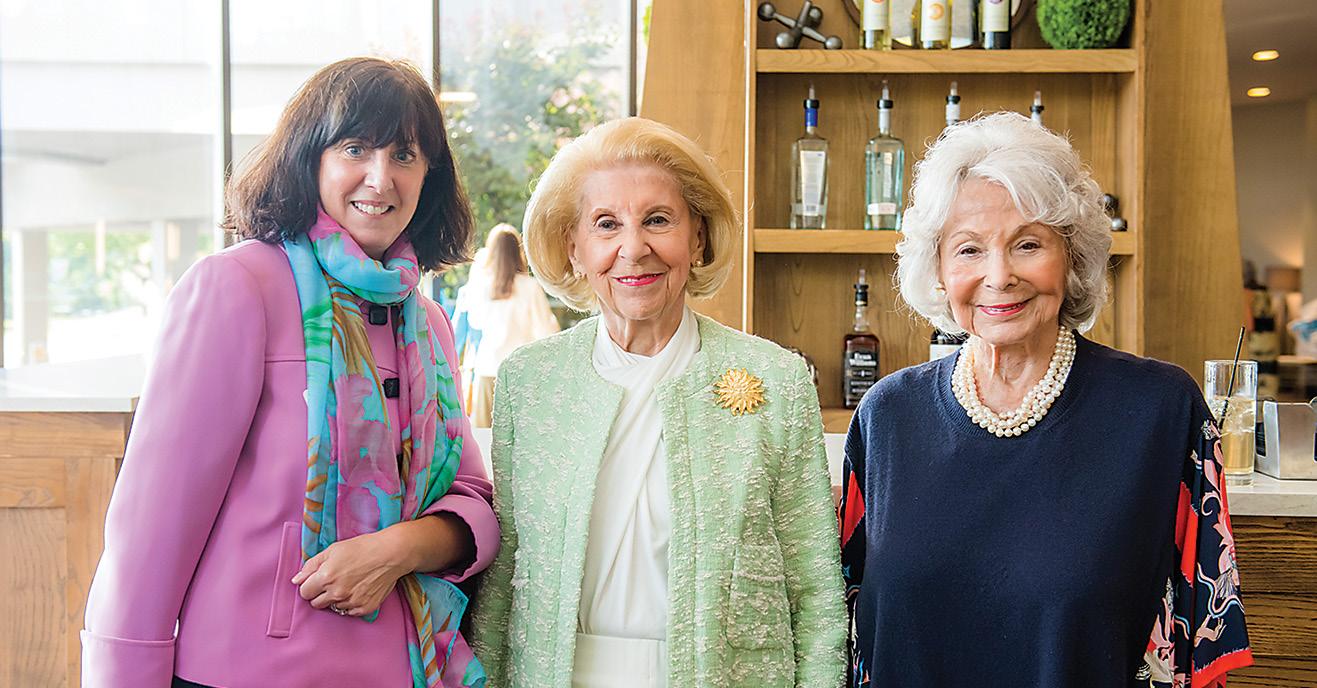
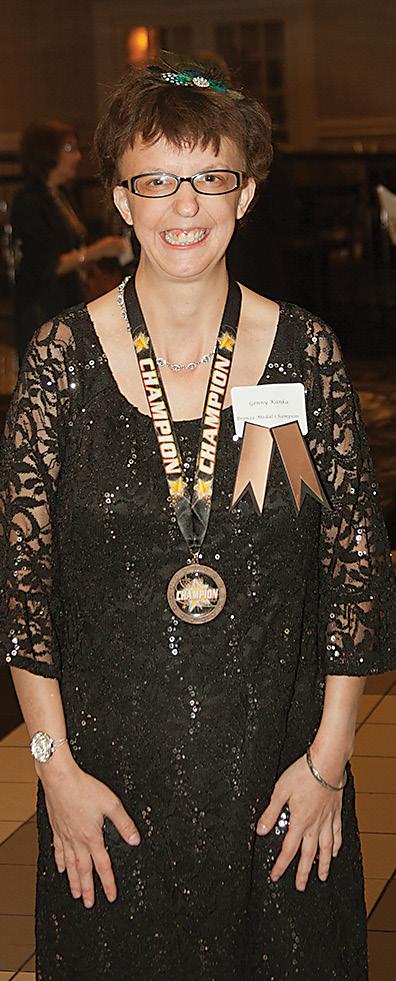

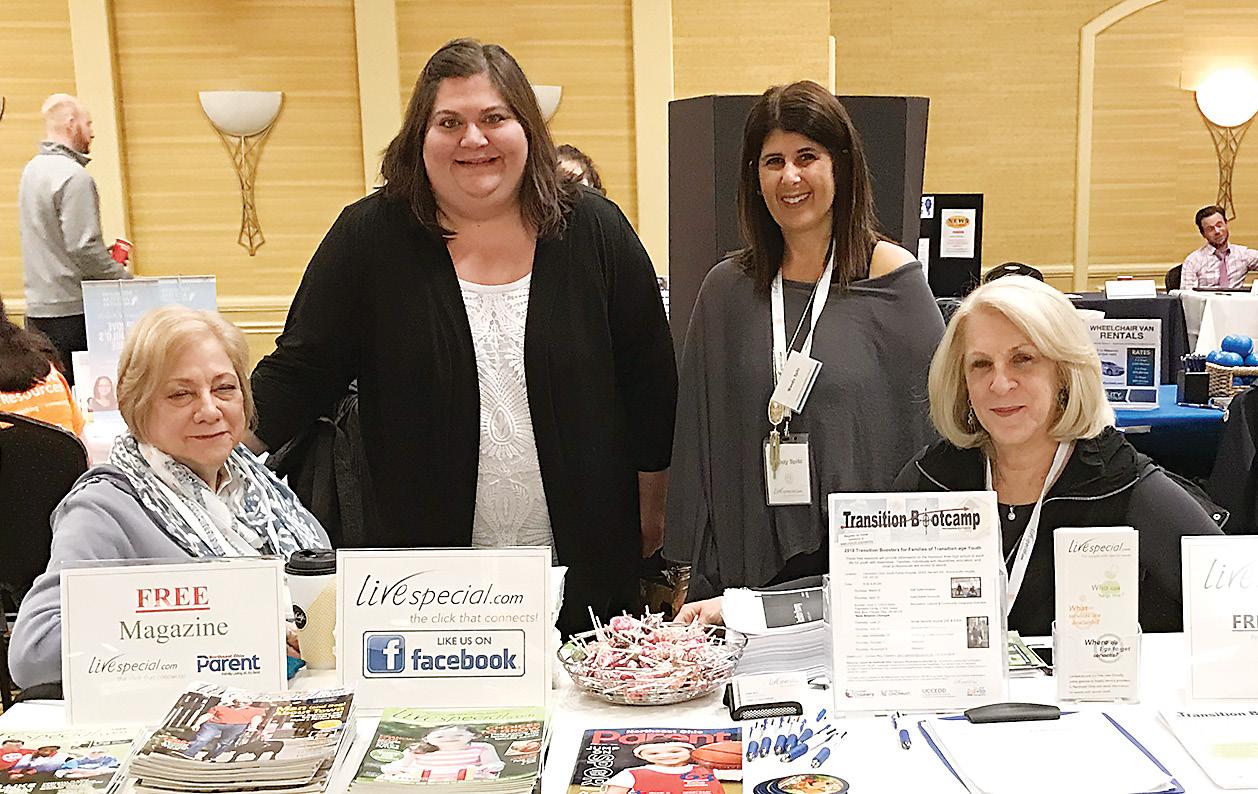
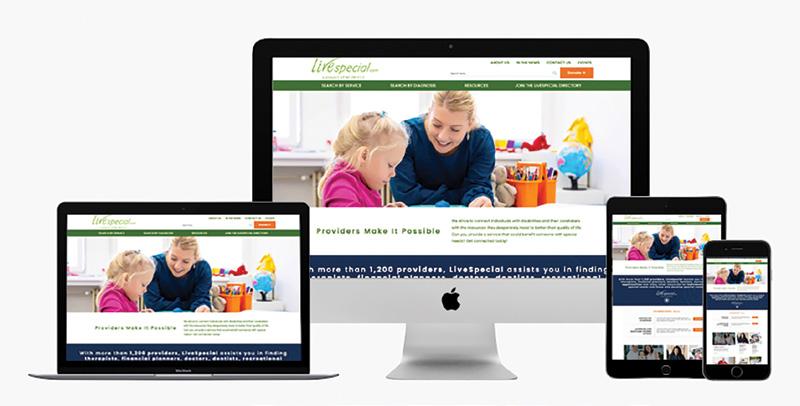
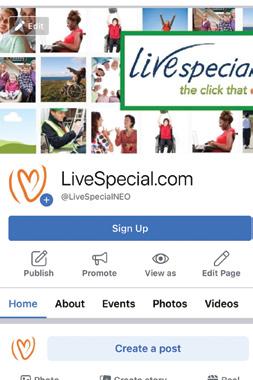
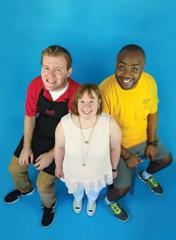
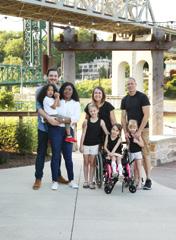

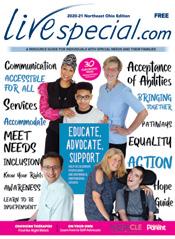
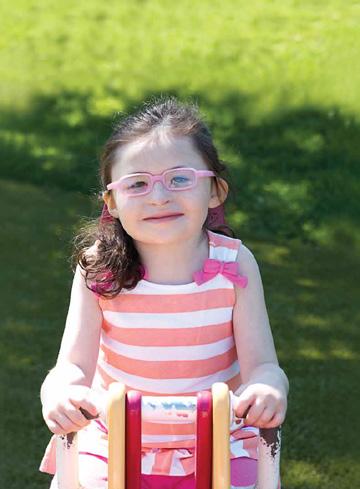


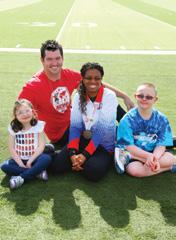


livespecial.com 2022-23 33 2018-19Northeast Edition FREE EMPLOYEES SUPPORT NEEDS BROUGHTNCJ W TAKE VACATIONFAMILY ACCESSIBLE FOR ‘Working It’ ISFUTURE SENIOR PLANS EDUCATION MATTERS 2019-20NortheastOhioEdition RESOURCE theNEEDS HELPINGOTHERS InspiringChange + 100Inclusive PlacesinNEO Support toChoiCes GrowHelp caring for a loved one with special needs FinanCial Plan Secure Your cHild’S Future at Free sChool tools For suCCess a resource Guide for ndividuals with special needs and their Families — 2015 northeast ohio edition — tranSitioning into adultHood 900+ Providers and Services to Enhance Your Care Plan NCJ W CLEVELAND Broughttoyouby FREE LIVING LIKE A CHAMPION FOOTBALL REDEFINE A Ride NCJ W PHOTOS COURTESY OF LIVESPECIAL.COM
(Top) Mindi Axner, (far left) executive director of NCJW/CLE with supporters of LiveSpecial. com, Ruth Lieberman and Lois Davis. (Top Right) Genny Kanka at the first Celebration of Champions event in 2017. (Middle) Alex (left) and Cordale (right) with LiveSpecial.com staff, which attend various events and programs in the community. (Second middle photo, from right) Cindy Glazer, committee chair, Wendy Spitz, LiveSpecial.com coordinator, Kerry Agins and Nessa Siegel. (Far left) LiveSpecial.com magazine celebrates its 8th annual edition and relaunch of the website. Check Facebook.com/ LiveSpecialNEO for programs.
Wendy Spitz, a special educator, was hired as coordinator in 2014 to help spread the word about the website.
“When I first came on board, the hope was for me to facilitate community engagement and to market the site to get more resources and more families to use the site,” Spitz says. “As my interaction with the community increased, I realized the need for educational programming. We began offering free programs with local experts on topics like IEPs, 504s, behavioral challenges, availability of services. We also joined a group of like-minded organizations to offer sessions relating to transition, that time when families lose the support of the school districts.”
“Adding a LiveSpecial.com coordinator helped us become a valued resource in the community in new ways,” Glazer says. “Not only did the site assist families, but the educational programs brought a larger audience, demonstrating a huge need. The knowledge shared and the partnerships we formed have been a huge valueadd to LiveSpecial.com. Wendy has also been instrumental in connecting NCJWCLE volunteers with partner organizations for shared inclusive activities.”
“I love being a local resource, often helping individuals develop a plan of action” she says.
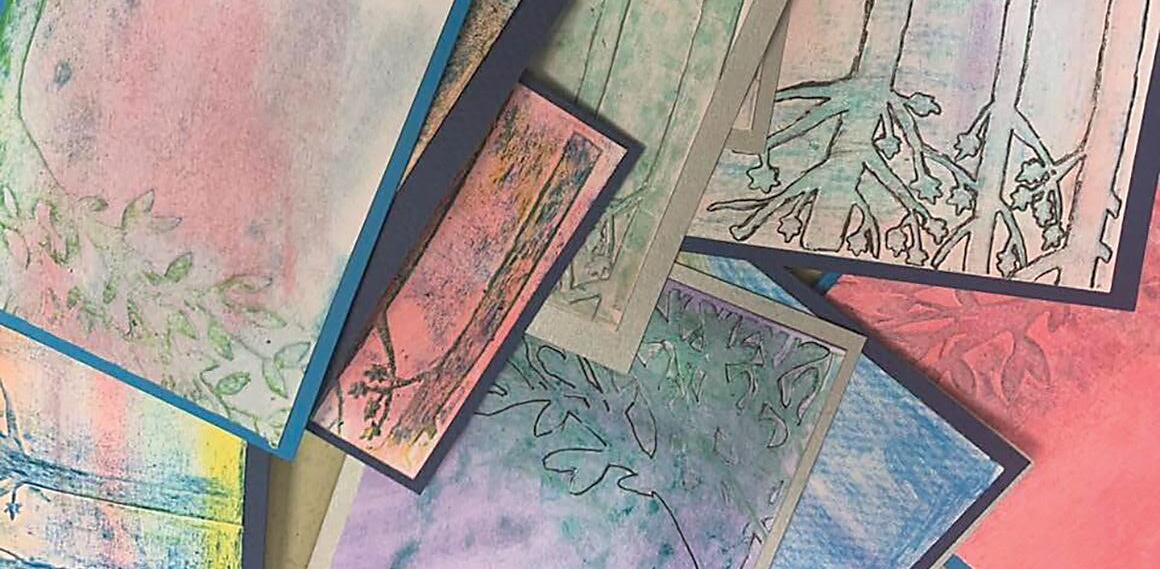
LiveSpecial.com continues to change with the times. As an example, during the COVID-19 pandemic, it was obvious that many families preferred to attend virtually. The virtual option has since expanded its reach throughout Ohio and beyond, and a virtual option will continue to be offered whenever possible.

The website, which has grown to well over 1,200 providers, also offers all LiveSpecial.com magazines, in addition to other publications, a video gallery of professional presentations, and a posting of upcoming events.
The LiveSpecial.com team was privileged to honor some very special individuals at its five-year anniversary celebration. Many of their unique stories of success and perseverance have been highlighted in the magazines. The awardees from this year’s 10-year Celebration of Champions are highlighted in this issue. We know you will be moved by their stories.
Cindy Glazer, a retired educational specialist, spent her career serving students with special needs and their families. She served on the committee to create LiveSpecial.com and continues to chair that committee.
Wendy Spitz, LiveSpecial.com coordinator, is a former social worker and special educator. She continues to collaborate with community partners to expand the support and reach of LiveSpecial.com.
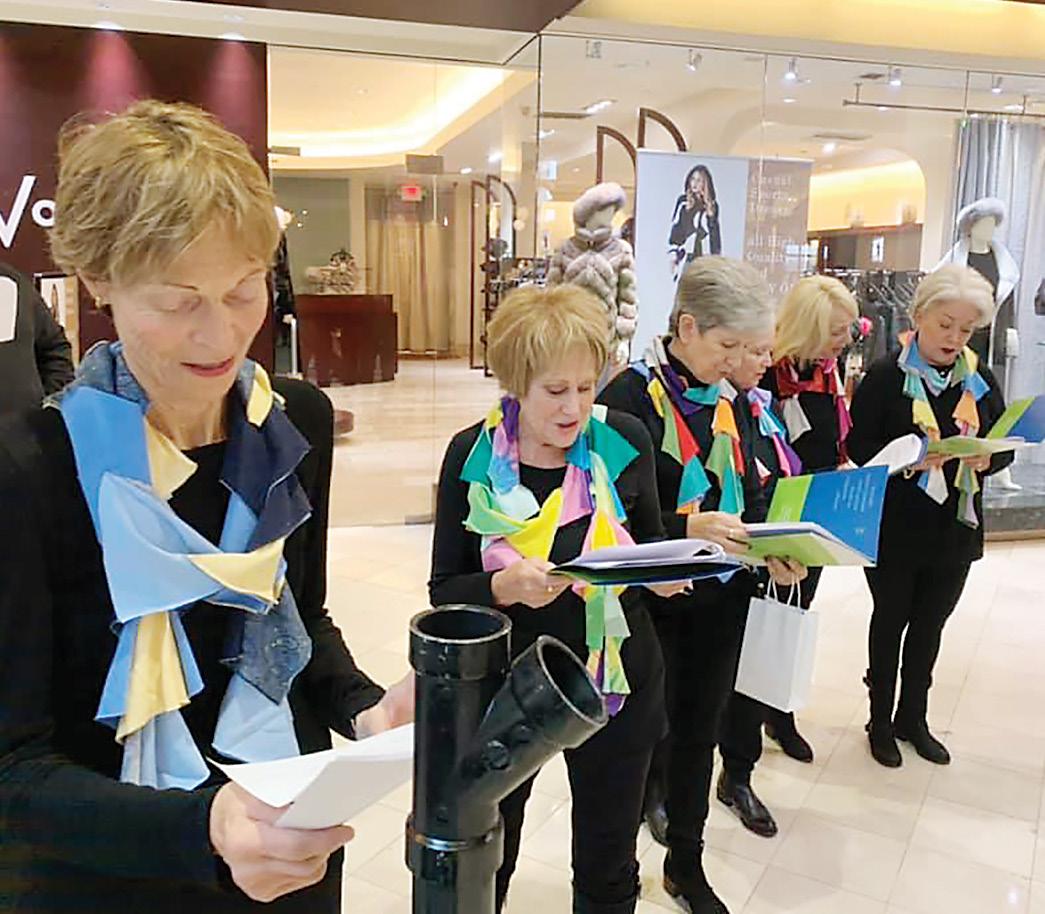
34 livespecial.com 2022-23
PHOTOS COURTESY OF LIVESPECIAL.COM
LiveSpecial.com appreciates all the people with special needs, their families, volunteers, professionals, organizations, and the community for the years of support.
is an Accessible Destination Ohio
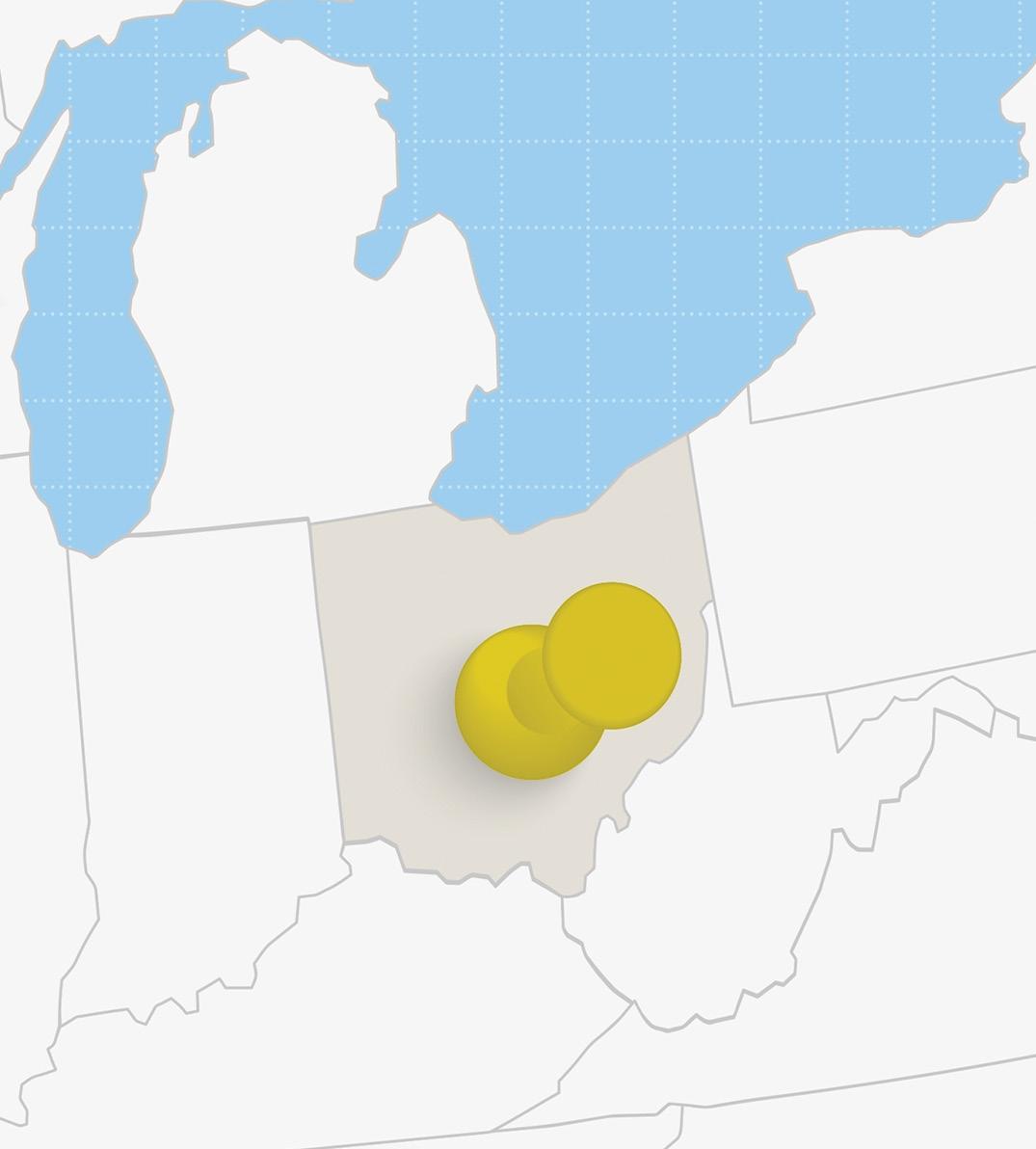
 By Vince Guerrieri
By Vince Guerrieri
For most people, summer brings visions of vacations and relaxation. But for people with special needs — and the families and friends that travel with them — it can be anything but relaxing to try to find an accommodating travel destination. Fortunately, there are plenty of places throughout Ohio that can offer a pleasant vacation experience. Here are a few:
livespecial.com 2022-23 35
CLEVELAND
For more than a century, visitors have been coming to the Cleveland Museum of Art to gaze at its collection, with works stretching back thousands of years. Admission is free and tours are available for those with visual or hearing impairments. The museum is fully accessible, with service animals permitted and wheelchairs and strollers available for use. Also in the city’s University Circle neighborhood is the Cleveland Museum of Natural History and the Cleveland History Center.
Not far from University Circle, the Cleveland Cultural Gardens were dedicated more than 100 years ago. Each garden highlights a different ethnic group that made Northeast Ohio its home. The gardens are all viewable — and most are accessible — from the street.
Cleveland Metroparks and the Cleveland Metroparks Zoo also offer a variety of sensory-friendly accommodations and inclusive activities, including beach wheelchairs at Huntington and Edgewater
beaches, sensory bags at the zoo, and therapeutic riding at various parks. Downtown, on the shore of Lake Erie, is the Rock ‘n’ Roll Hall of Fame. Opened in 1995, the accessible I.M. Pei masterwork features

elevators and wheelchair seating in the hall’s viewing theaters. Service animals are allowed at the Rock Hall, and sign language interpreters are available (reservations must be made at least two weeks in advance).
Cleveland Metroparks offers Inclusive activities, sensory bags and spaces. Also, allterrain beach wheelchairs at available at Huntington and Edgewater Beach. (clevelandmetroparks.com)
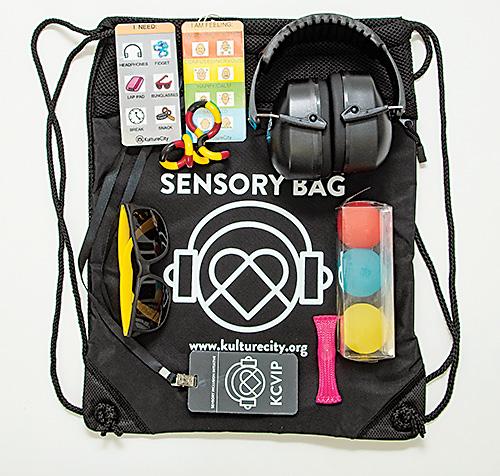
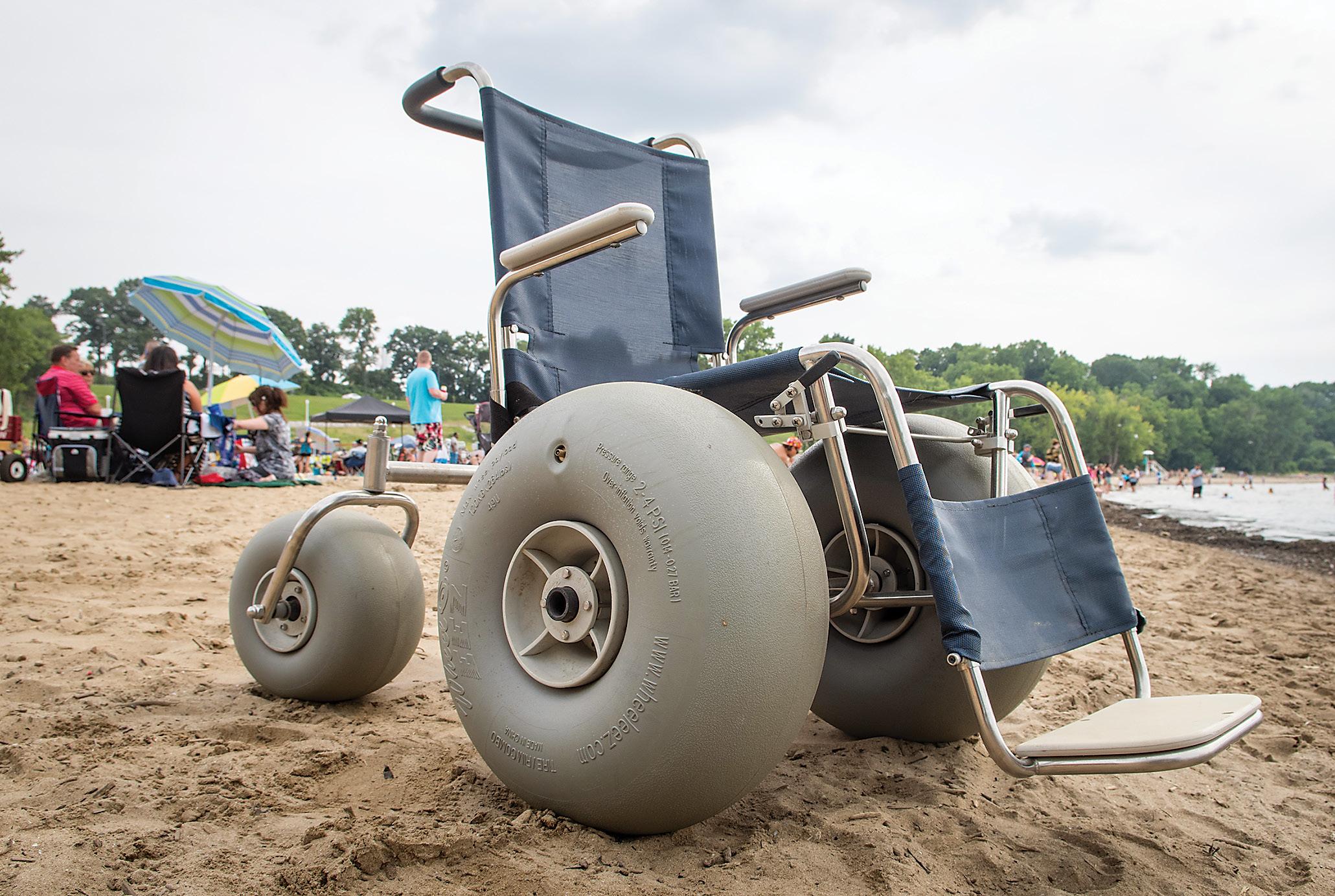
36 livespecial.com 2022-23
Cleveland Rock Hall has sign language interpreters available, accessible features and service animals are allowed inside the Hall. (rockhall.com)
PHOTOS COURTESY OF CLEVELAND METROPARKS
NORTHWEST OHIO
Just west of Cleveland is the area once referred to as “Vacationland,” now called Shores and Islands Ohio, a popular vacation destination for the entire state and beyond.
Parks throughout Northwest Ohio — many of which include picturesque pathways along the water — are accessible, with Maumee Bay, in Oregon, and Port Clinton Beach offering Mobi Mats for wheelchair users. Maumee Bay, also has an accessible nature center and a wheelchairaccessible fishing pier — as does Catawba Island State Park.
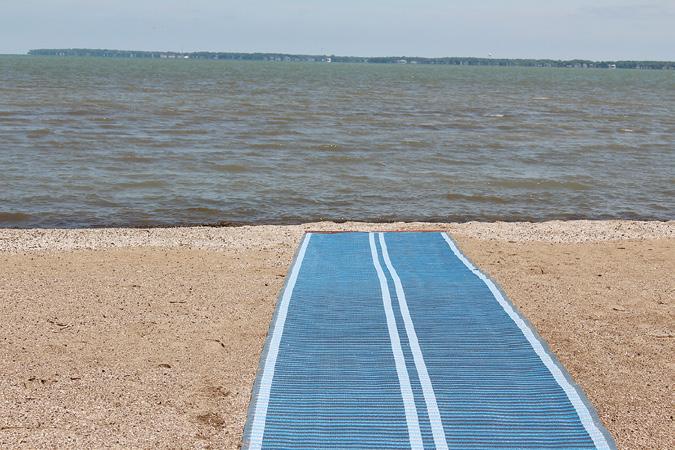

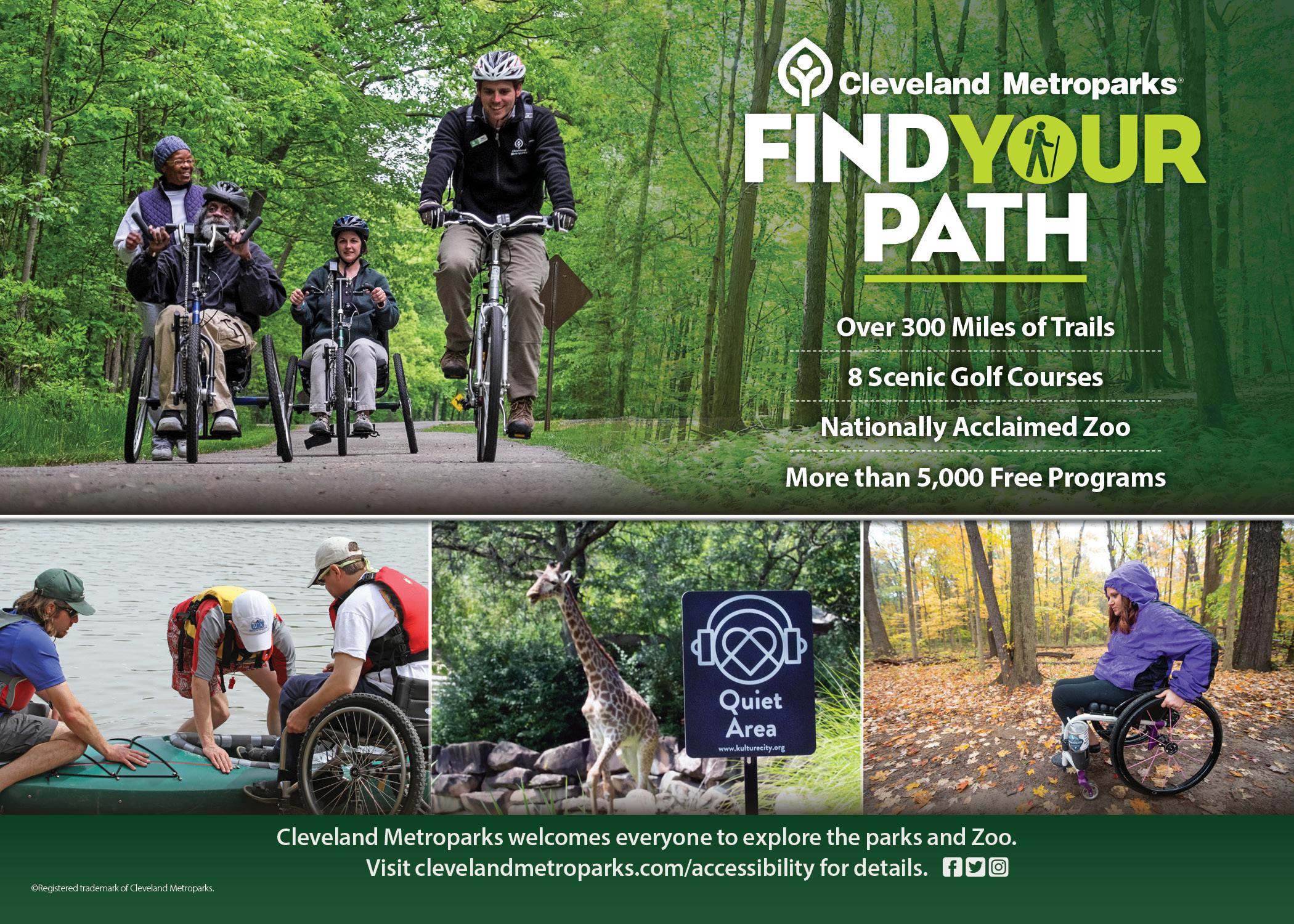
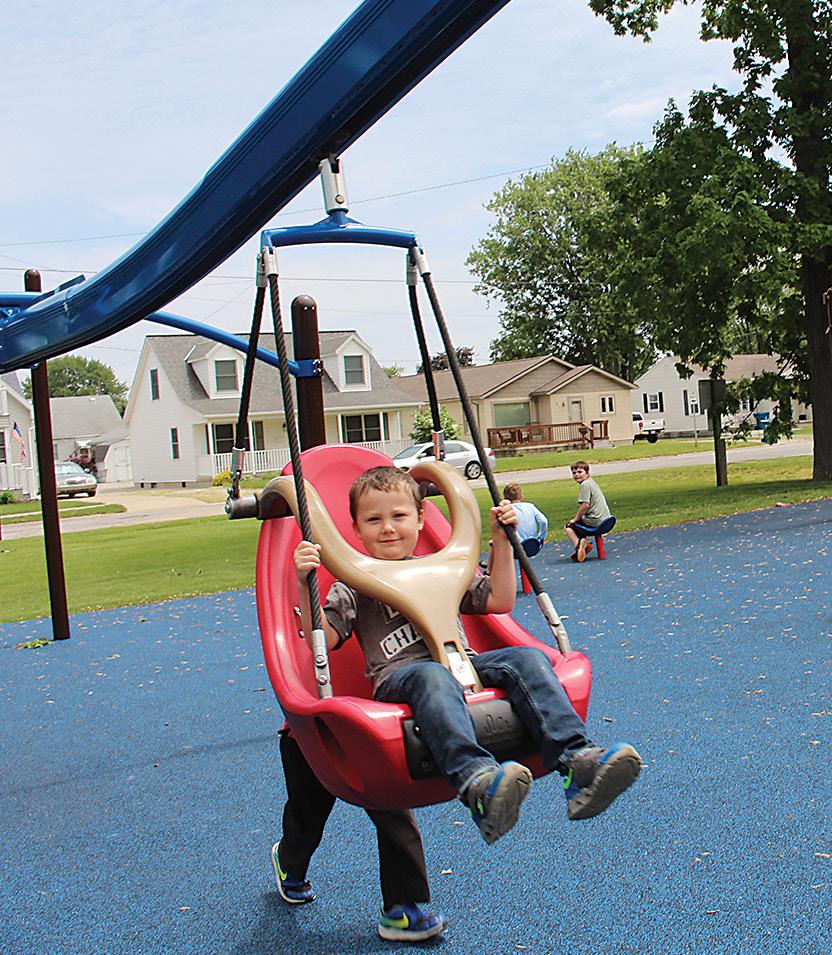
Accessible ice skating is available at Ottawa Park in Toledo, and the Toledo Metroparks offer many adaptive programs, including archery,
climbing and kayaking.
In Port Clinton, African Safari Wildlife Park offers a driving tour through a variety of wildlife, and
Cedar Point , in Sandusky, Guests with mobility or cognitive limitations can register for the park’s Boarding Pass program,
offering special access to some attractions. Sign language interpreters also are available (if requested in advance) for live shows.
livespecial.com 2022-23 37
(Left)"Flagship Collaborative Play Place" an all abilities, accessible playground at Lakeview Park, 1100 E. Perry St. (SR 163) Port Clinton) Facebook.com/FlagshipCollaborativePlayPlace) (Right) Mobi Mats for wheelchair users at Port Clinton Beach.
PHOTO COURTESY OF OTTAWA PARK
COLUMBUS
The city was built specifically to be the state capital. Accessible tours are offered throughout the capitol grounds.
COSI museum features accessible spaces and rentals of strollers, scooters and wheelchairs. There also are maps available to identify sensory-friendly environments. Sensory bags — which include noise-canceling headphones, fidgets and bubbles. There also is a calming room.
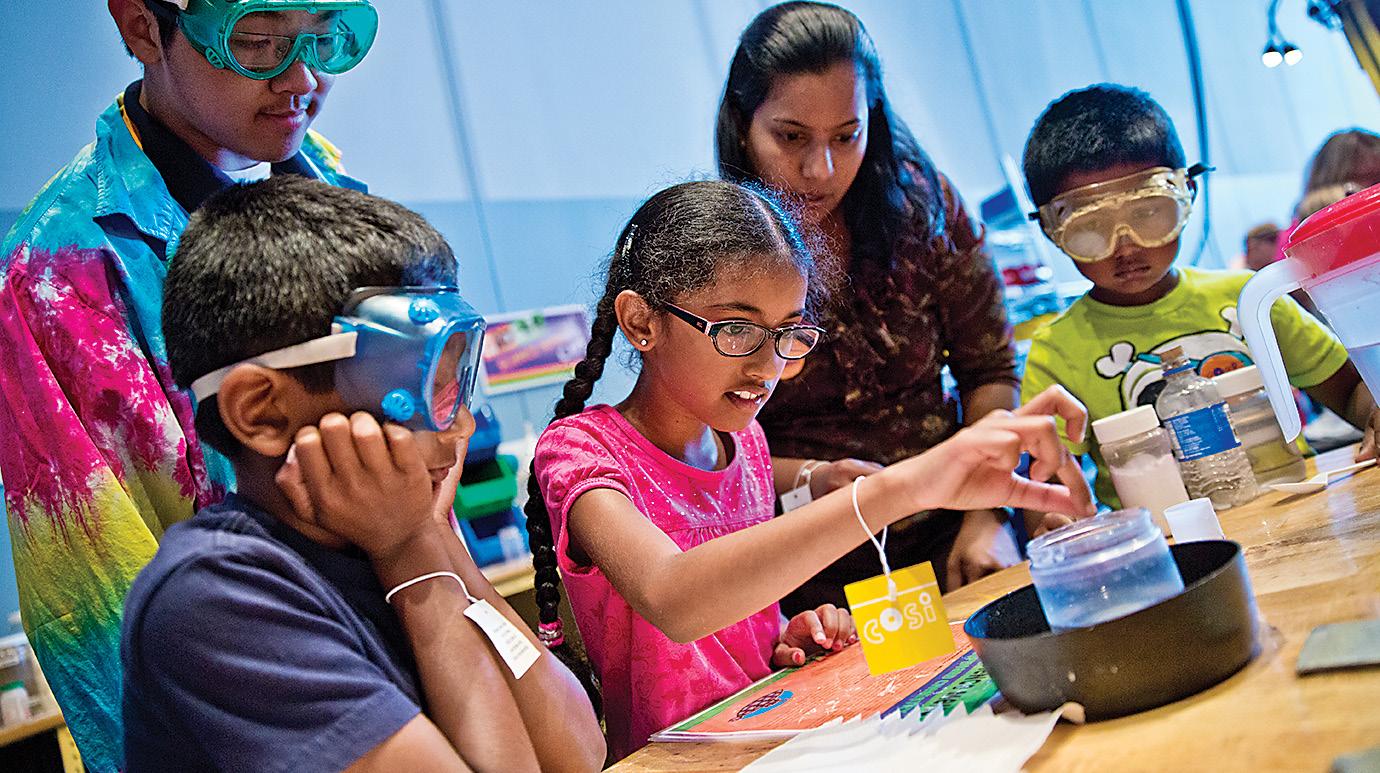
The Columbus Zoo offers sensoryfriendly areas and admission times, as well as sensory bags. The zoo also prioritizes accessibility, offering wheelchairs and scooters for rental, and granting free admission to any caregiver accompanying a visitor.
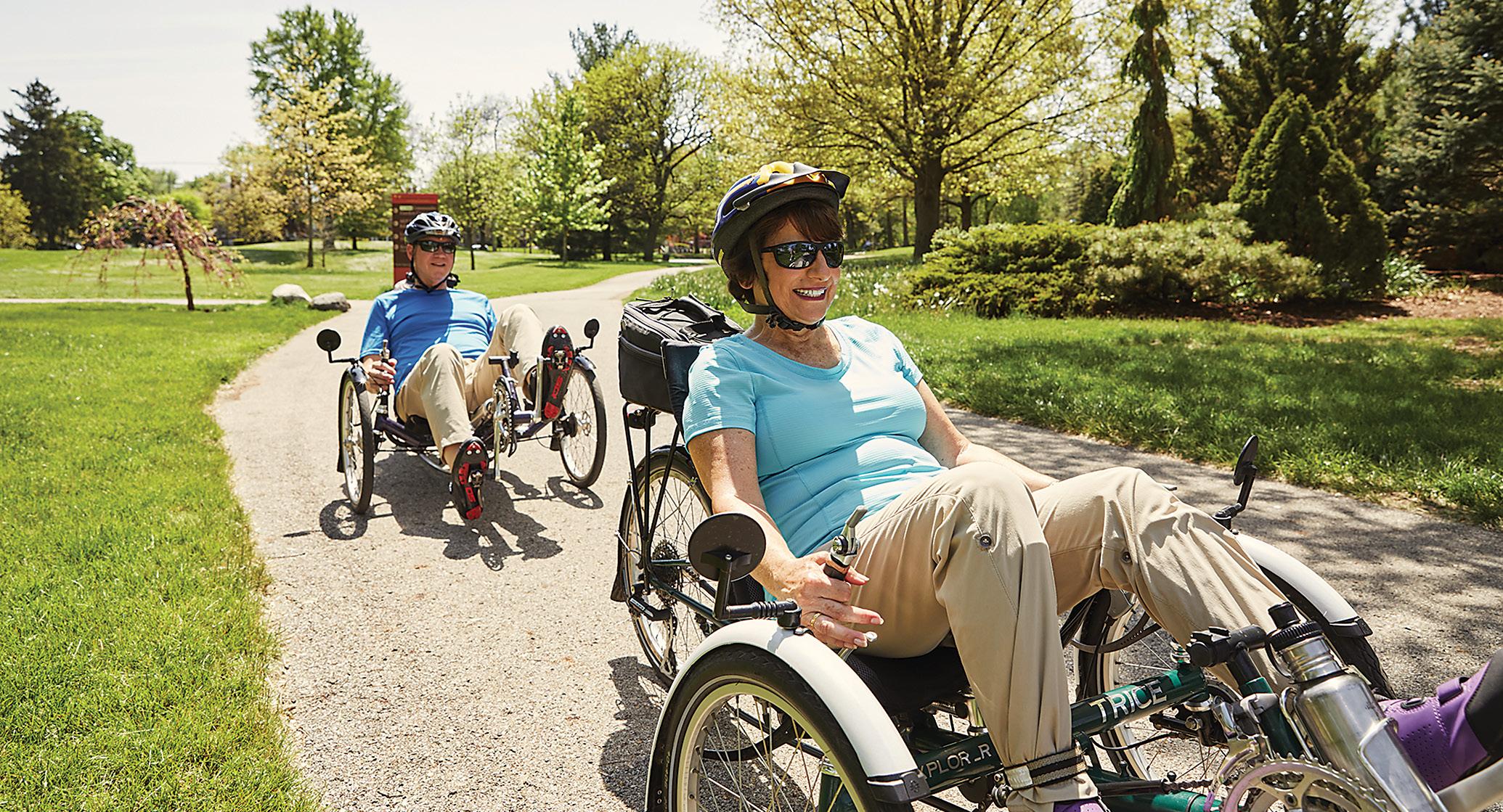
Locations such as LEGOLAND Discovery Center, Wexner Center for the Arts, Easton Town Center and more is where service animals are welcomed and can be accommodated, and large print and braille documents may be available on request, alomg with assistive listening devices, audio descriptions, and captioned performances. If you are looking for dining, RH Rooftop Restaurant and Condado Tacos are some options. Experiencecolumbus.com provides an accessible guide for more info.

38 livespecial.com 2022-23
Those who use mobility devices, such as wheelchairs, walkers and crutches, will find accessible paths of travel, according to Experience Columbus. Many venues provide courtesy or rentable strollers, wheelchairs and scooters. (experiencecolumbus.com)
Columbus Zoo and Aquarium offers accessible viewing and sensory-friendly offerings. (columbuszoo.org)
Get hands-on STEM experiences in accessible spaces at COSI. (cosi.org)
PHOTOS COURTESY OF COLUMBUS ZOO, COSI AND EXPERIENCE COLUMBUS
CINCINNATI
Almost a destination in itself, the Cincinnati Museum Center features no shortage of activities, with the Cincinnati History Museum, the Children’s Museum, the Museum of Natural History and Science, the Nancy and David Wolf Holocaust & Humanity Center, and the Robert D. Lindner Family OMNIMAX Theater all under one roof. The museum center is an Art Deco masterpiece that was originally built as a central station serving the city’s seven railroads in 1933. As such, it’s spread out, but built for transportation (wheelchairs are available for a refundable fee).
One of the newest parks in the city is Smale Riverfront Park, opened in 2012. Located between Great American Ballpark, the home of the Reds, and the Bengals’ home of Paul Brown Stadium, the park is billed as “Cincinnati’s Front Yard,” and features wide paths for wheelchairs, an
accessible carousel and fantastic views of the Roebling Suspension Bridge, linking Cincinnati with Northern Kentucky.
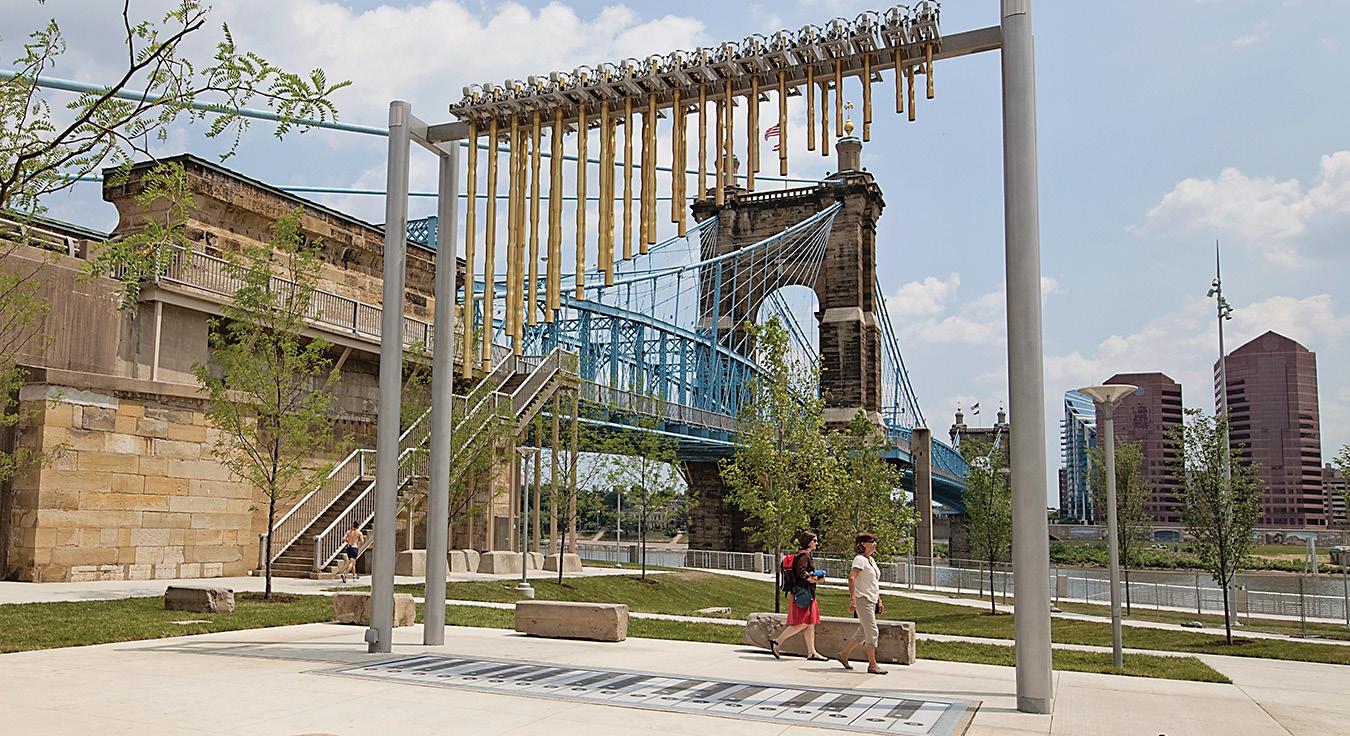
In addition to being home to the Reds, Great American Ballpark is home to the team’s hall of fame and museum Both the ballpark and museum are accessible.

The museum is open on days when the Reds are on the road. Newport Aquarium offers 'touch' experiences, assisted listening devices for shows in Shark Ray Bay Theater, noise-cancelling headphones and lighted magnifying glasses are available for visitors.
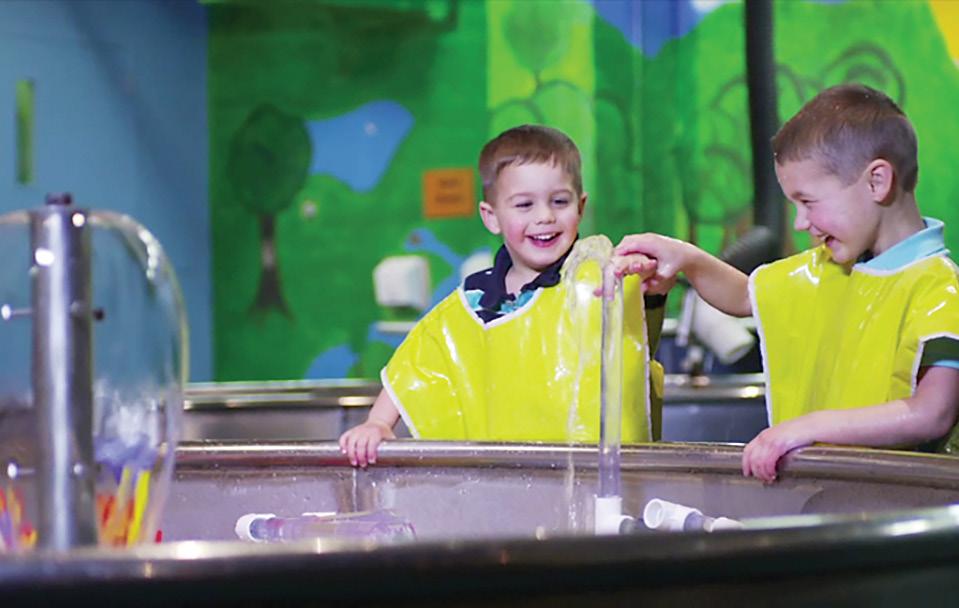
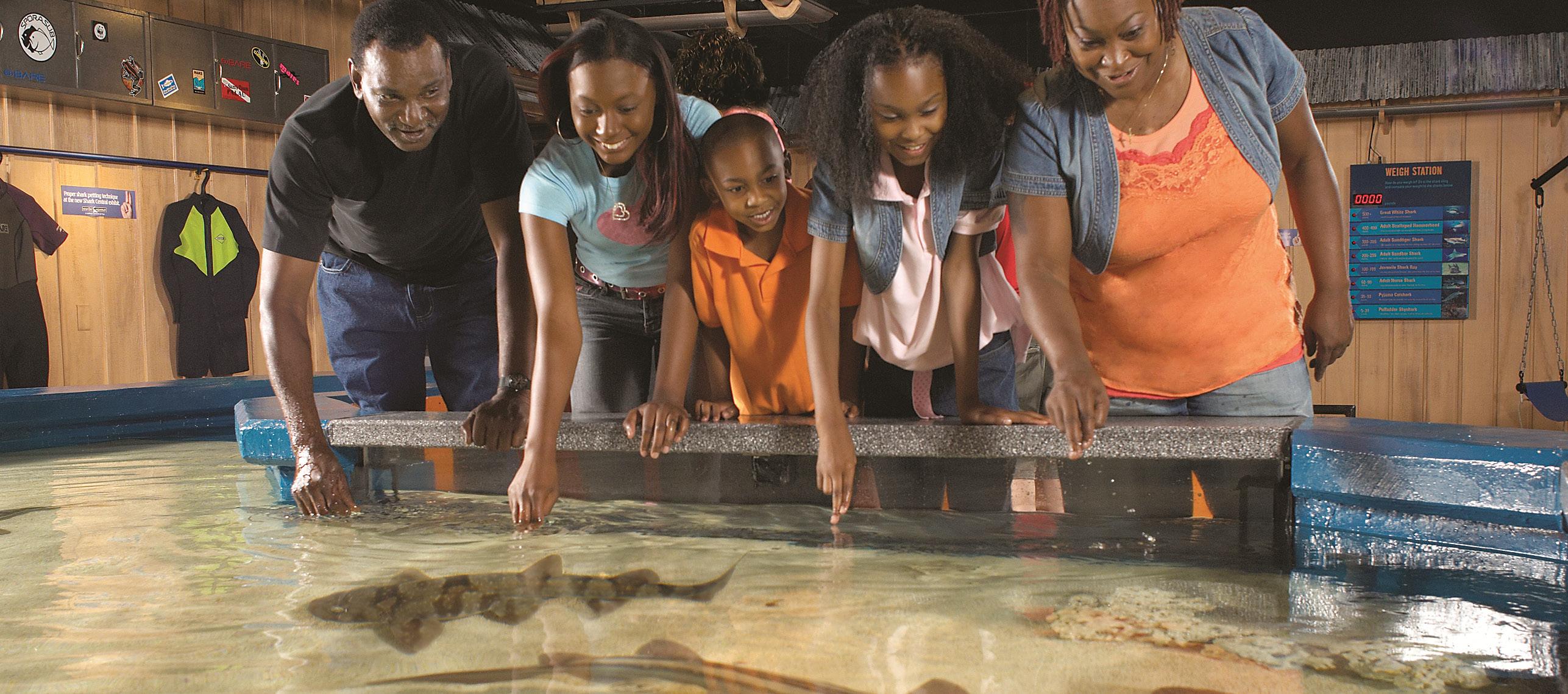
livespecial.com 2022-23 39
Newport Aquarium, (newportaquarium.com)
Great American Ballpark, (mlb.com/reds/ballpark)
Cincinnati Energy Children's Museum, (cincymuseum.org)
PHOTOS COURTESY OF
Giant foot piano Smale Riverfront Park at the Banks (visitcincy.com)
SMALE RIVERFRONT PARK, GREAT AMERICAN BALLPARK, CINCINNATI ENERGY CHILDREN'S MUSEUM AND NEWPORT AQUARIUM, VISITCINCY.COM
Hitting the Court With Wheelchair & Adaptive Tennis
Although both adaptive and wheelchair tennis are unique in their own way, the benefits to participating in this lifelong sport apply to all ages, levels and skill sets.
Adaptive tennis is about learning skills that are specific to an individual’s needs. Some athletes need one-on-one attention and just working on hand-eye coordination in a fun and exciting atmosphere is very useful in building their skills. For others, the focus may be tracking the ball and learning the rules or keeping score.
Brian Smallwood, tennis director at Center Court Tennis, says that when it comes to adaptive and wheelchair tennis, many athletes enjoy the instant gratification of a tennis ball going over the net, instead of winning a match.
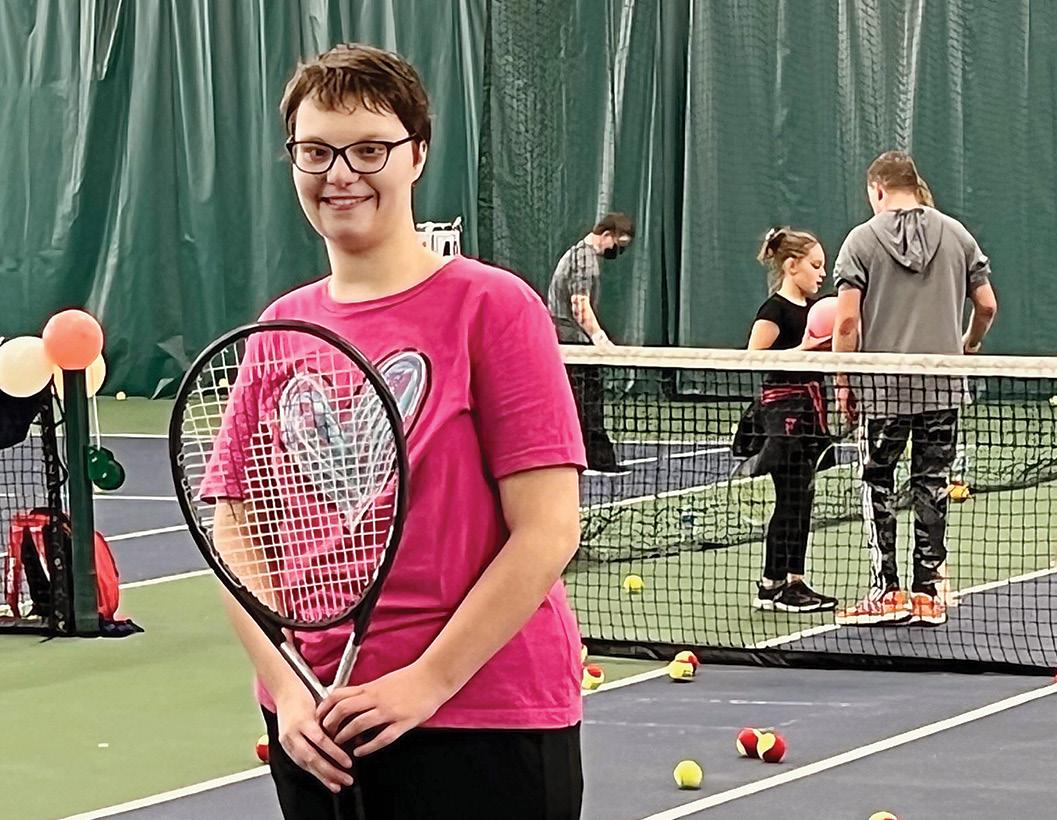
“Tennis for both adaptive and wheelchair athletes creates a platform to use their individual skills, as well as using their minds to achieve a goal,” Smallwood says. “This can be transformative and empowering for the athletes.”
Anyone is welcome to participate in adaptive tennis without prior knowledge.
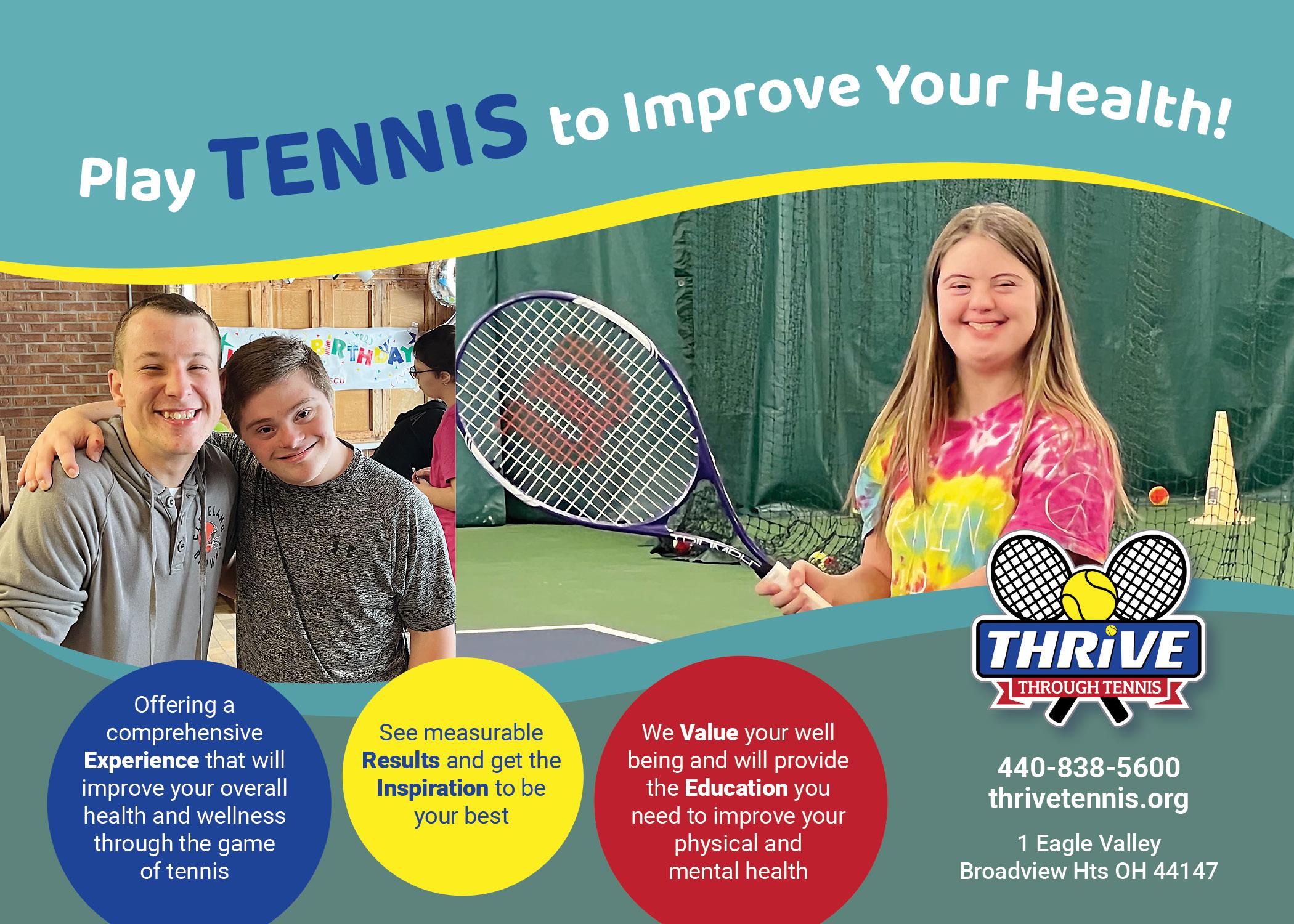
The first lesson for wheelchair athletes is to learn how to use a “sport chair,” which is different than a normal wheelchair, according to Smallwood. He says that tennis clubs often have this type of chair, in addition to all other equipment, available to use for free.
“My proudest moment as an adaptive/wheelchair coach happened just recently,” he adds. “One of our adaptive athletes participated in his first tournament. He was able to keep score, play points and participate in an event with neurotypical athletes.”
40 livespecial.com 2022-23
PHOTO COURTESY OF THRIVE THROUGH TENNIS
FAMILY MATTERS
Adaptive tennis provides opportunities to build skills and work on hand-eye coordination in a fun atmosphere.
VIRTUAL REALITY Technology for learning life skills
Floreo is a virtual reality (VR) platform that teaches important social, behavioral, communication and life skills.
Initial Floreo modules help users develop eye contact skills, while later modules teach how to safely cross the street, use descriptive language, and interact with peers or community members like police officers. Floreo also includes sensory modules like “Find the Fish” and “Play the Marimba” to help with selfregulation and calming techniques. This technology is suitable for people of all language levels and is customizable to each learner.
The Cuyahoga County Board of Developmental Disabilities (Cuyahoga DD), a Floreo featured partner, has created its own VR modules like “How to Use the RTA.” These modules are specific to Cuyahoga County public transportation. Learners can practice the many aspects of riding the RTA,
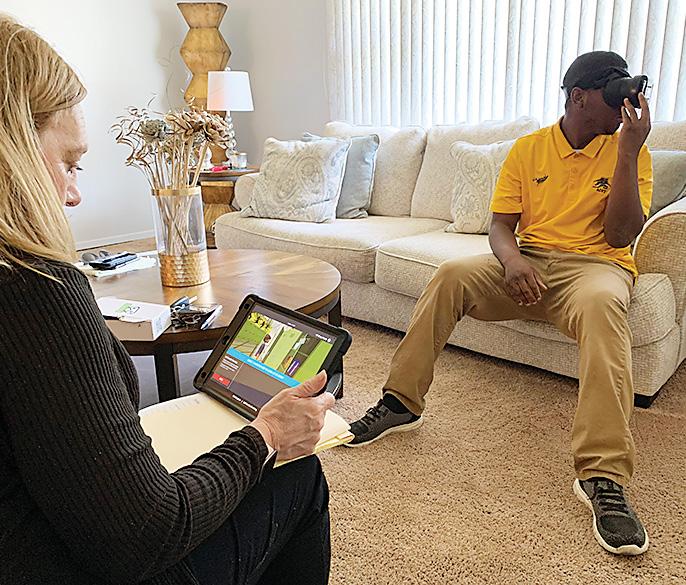
including: how to identify their bus, pay the fare, request a stop, and exit the bus.
A step beyond role play, Floreo lessons offer immersive experiences in simulated real-world settings. Floreo works through a VR headset worn by the learner while a Cuyahoga DD
professional monitors the session through a tablet and acts as a coach to help reinforce the lessons.
Behavior curriculum intervention specialists at the Cuyahoga DD are incorporating cutting-edge technology for their sessions with school-age youth.
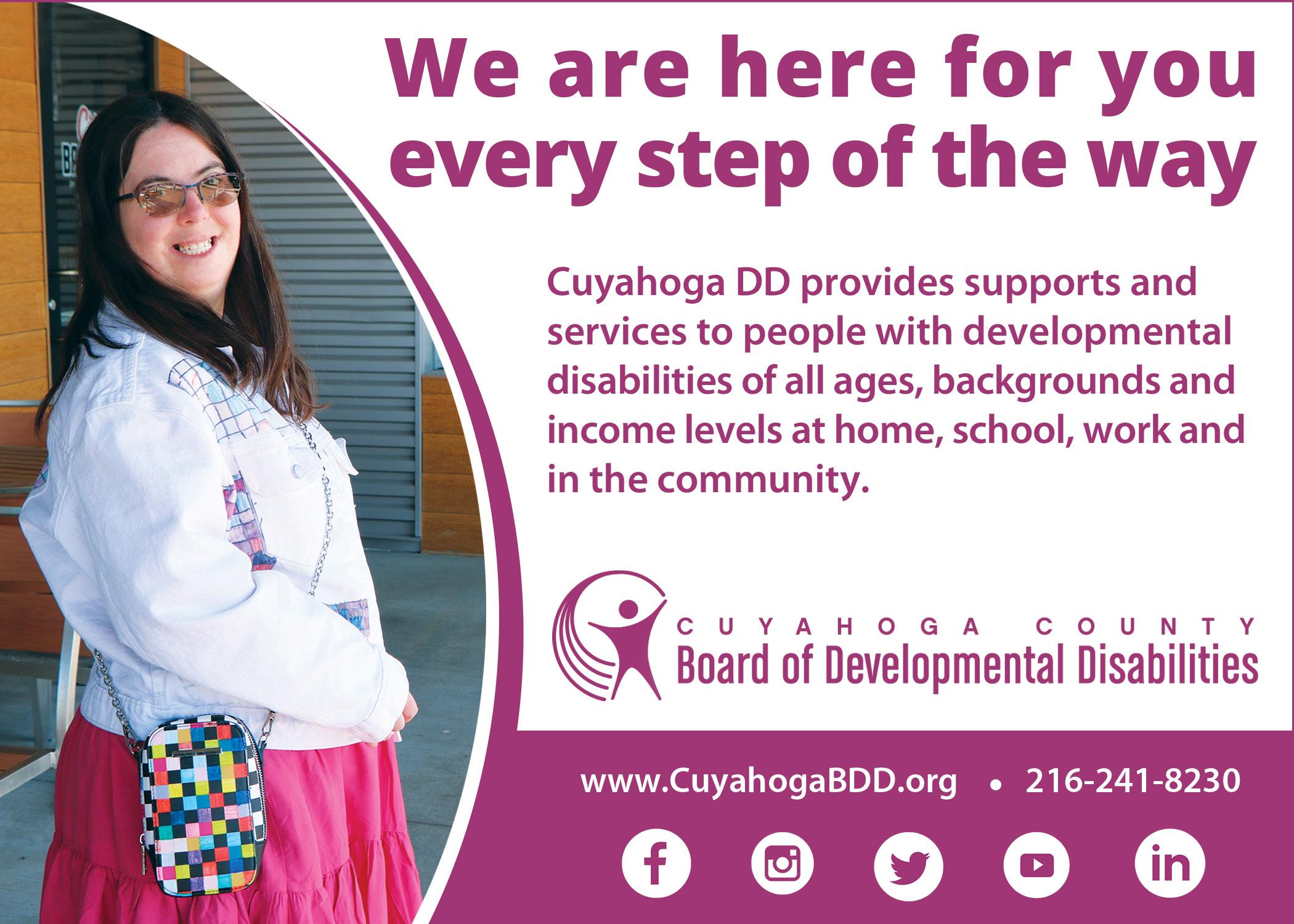
“The Floreo team has been deeply responsive to our needs — their founder, Vijay Ravindran, once left his own board meeting to hop on a Zoom with Cuyahoga DD — and is working to incorporate our suggestions for new modules and avatars with personalized appearances,” says Lori Mago, division manager, assistive technology and children’s services.
Cuyahoga DD has purchased 10 Floreo headsets.
“Eight are currently in use and the other two may be added to the Lending Library so families can be trained for home use,” says Kelly Rainey, special instruction manager.
livespecial.com 2022-23 41
PHOTO COURTESY OF CUYAHOGA COUNTY BOARD OF DD
The virtual reality platform helps Cuyahoga Developmental Disabilities intervention specialists staff during sessions with school-age youth.
TECH
Three Ways to Support Your Child’s Positive Identity
All families want their children to feel good about themselves. We nurture their strengths and we help them build skills they need in life. But for kids with disabilities, that may not be enough.

Ableism — which is defined as “discrimination against people
By Karla Fitch (she/her), Connecting for Kids
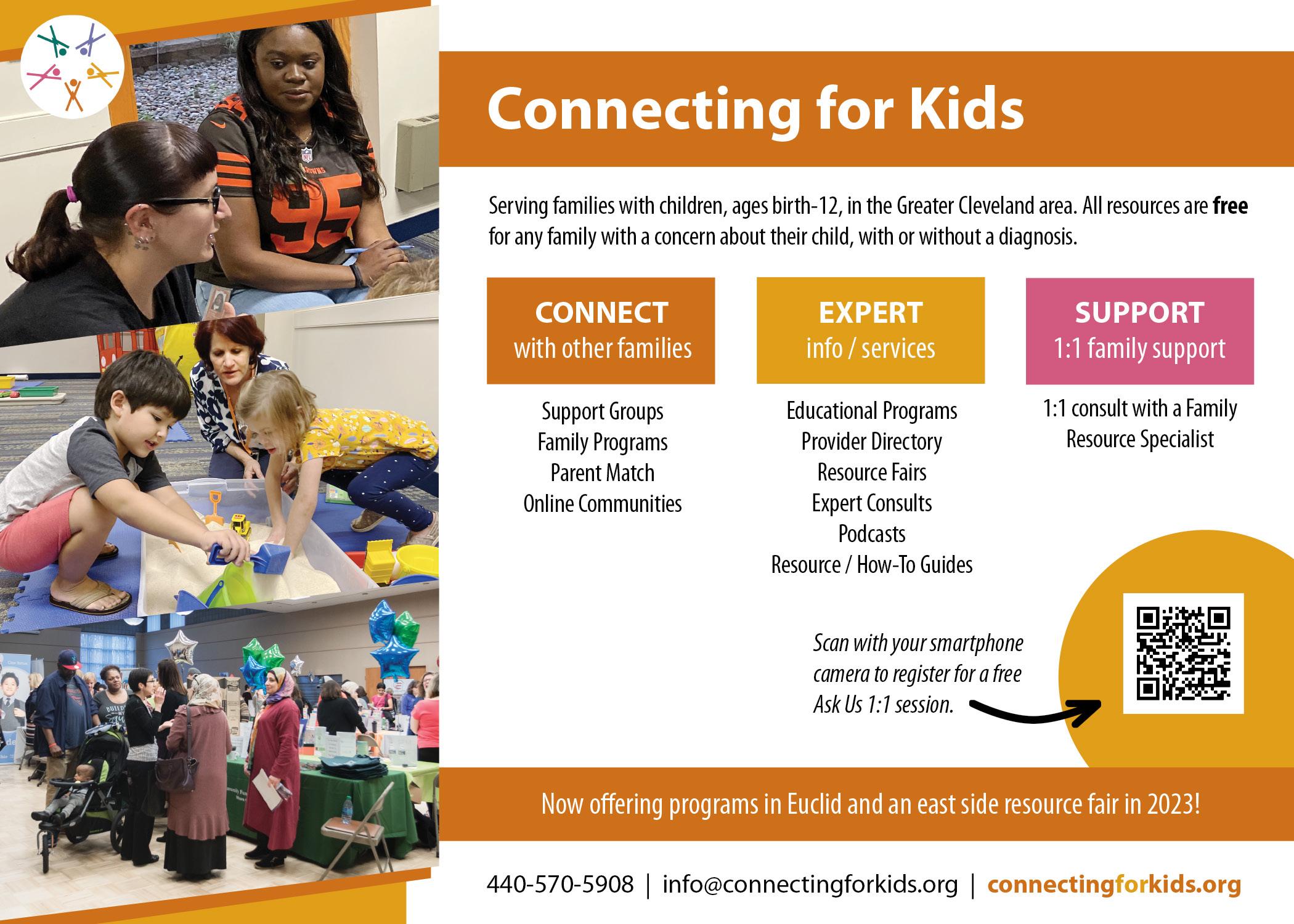
with disabilities” — is a part of our society. It comes up in our language, environment, and in the ways we treat others. Over time, it can chip away at the work families do to support their child’s positive identity.
What can families do?
EXPOSE YOUR CHILD TO OTHER PEOPLE WITH DISABILITIES. The best way for families to learn about the strengths and challenges of living with a disability is to listen to people with disabilities. Look for social media accounts, books and magazines, or organizations that support disabled adults. You can find a great starter list of disabled adult voices at overthrowingableism.com (click the “Resources” tab).
Connecting for Kids also has a book list with suggestions from local librarians at connectingforkids.org/disability.
CHANGE YOUR LANGUAGE. Many of the words we use to describe bad things are based on disability. One of the easiest ways to combat ableism is to stop using those words. There are some great word lists on the internet (search for “ableist word list”). Emily Ladau, a disabled author and advocate, also included a starter list in her book, “Demystifying Disability.”
BUILD YOUR OWN AWARENESS. Because ableism is part of our society, it can be easy to miss. When families are aware of ableism, listen to people with disabilities, and work to change the way they behave, children are more likely to have a positive identity that includes disability. Learn to recognize ableism from sources such as the Connecting for Kids disability series podcast, “What You Do and Say Matter.” (connectingforkids.org/DisabilitySeries22).
42 livespecial.com 2022-23 PHOTO COURTESY OF THE THERAPEUTIC LENS PHOTOGRAPHY.
A quick cuddle at a Connecting for Kids event.
1.
2.
ADVOCACY
3.
For more information 216.377.3000 ext. 1008 Bree@FriendsCleveland.com www.FriendsCleveland.com
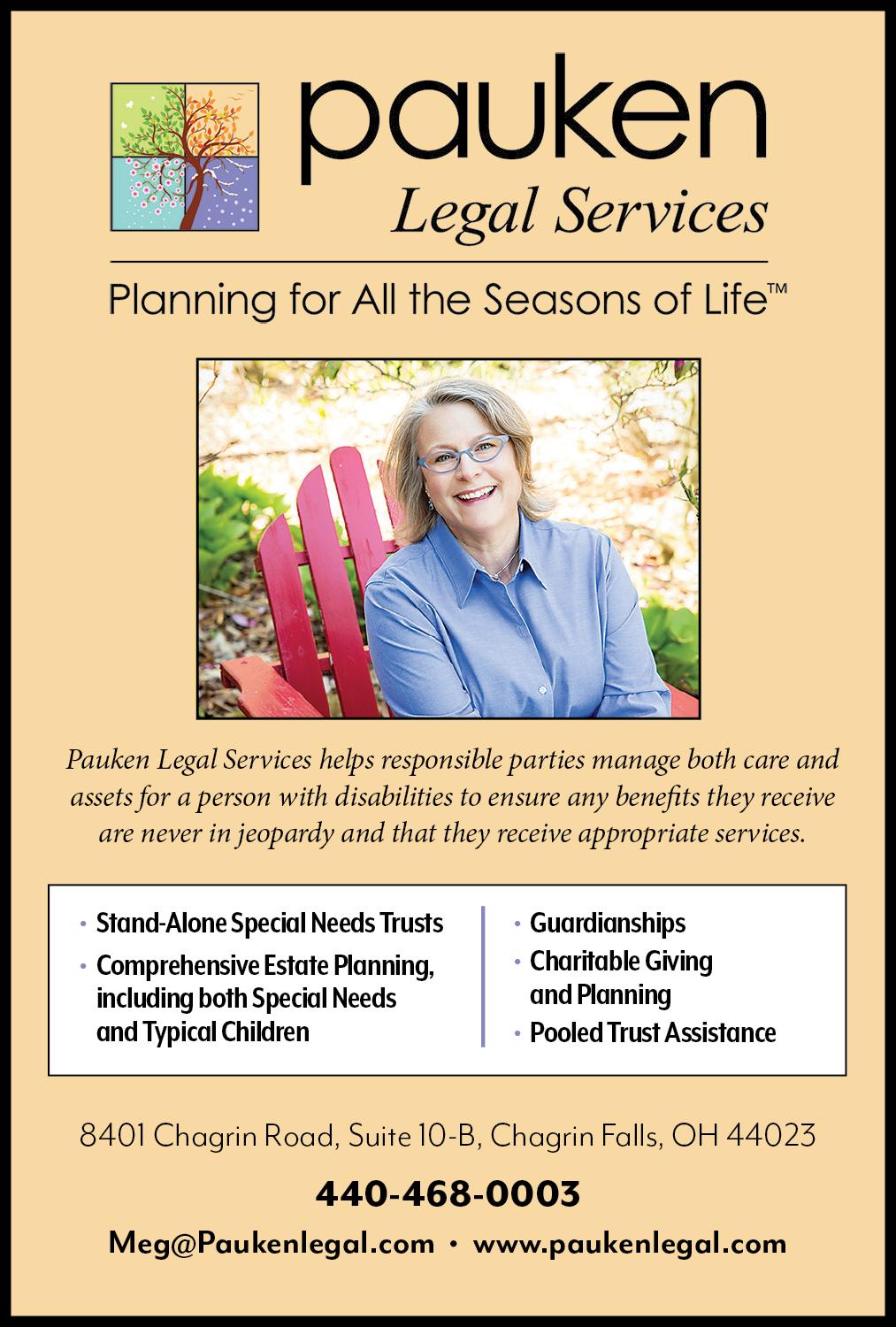
Friendship Circle of Cleveland 27900 Gates Mills Blvd. Pepper Pike, Ohio 44124

is a unique opportunity for exceptional children to enhance social skills and make friends. Children participate and gain positive experiences in group activities while receiving one-on-one attention with teen friends. Programs are offered for children ages 5 through young adult.
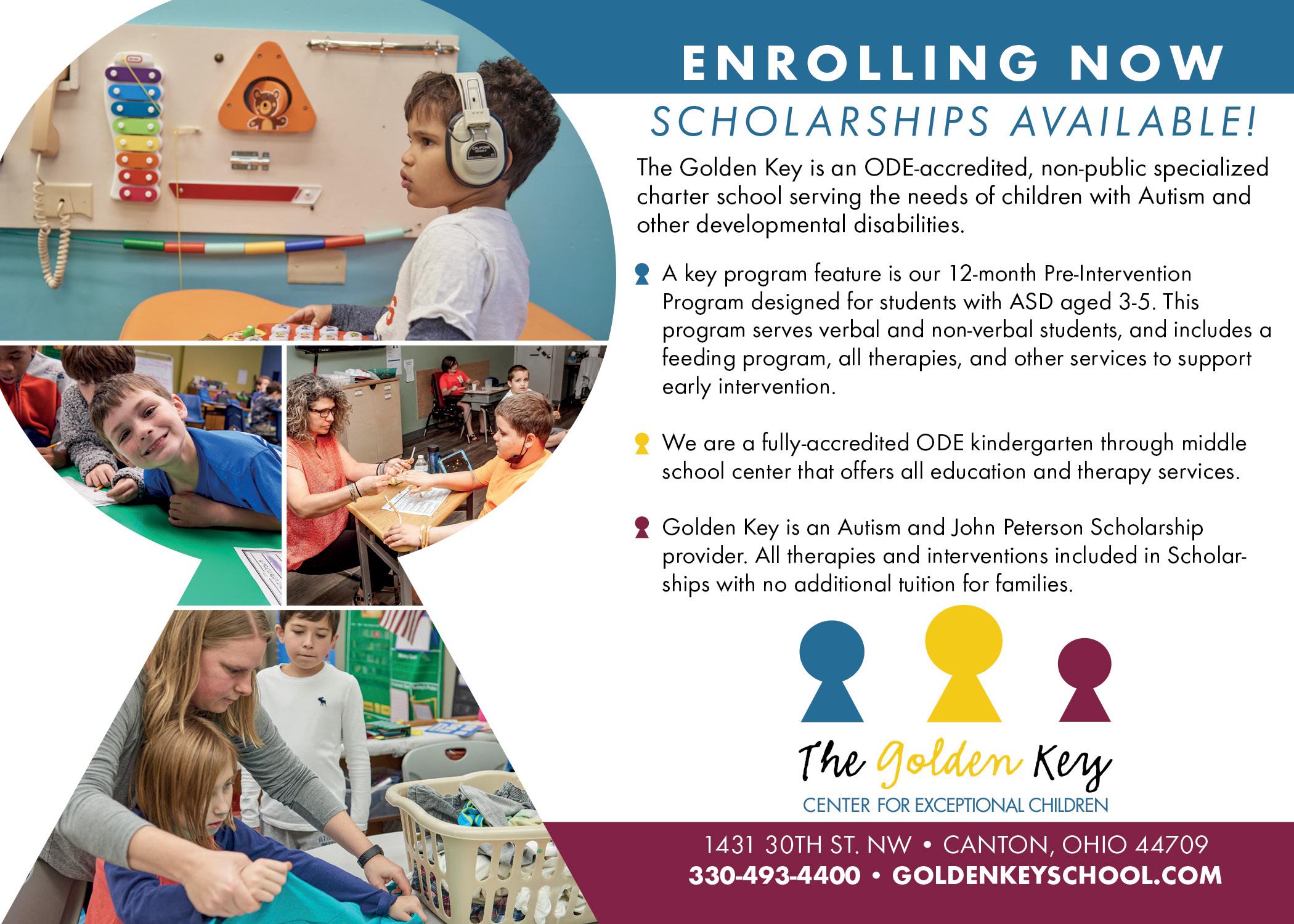
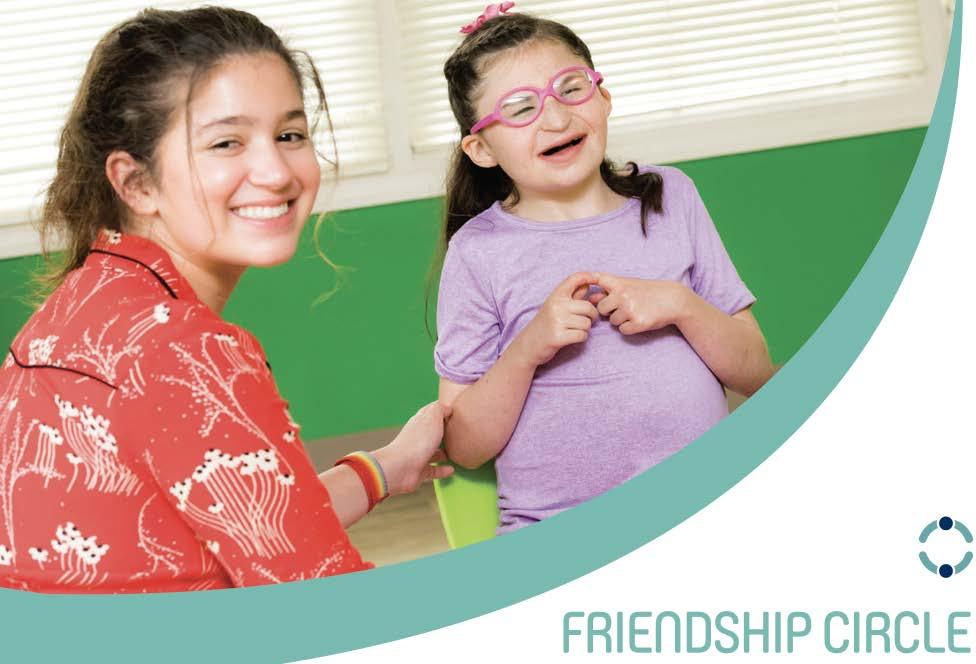
livespecial.com 2022-23 43 (:) FriendshipCircle Bs"d of Cleveland
For People & Planet
Meet two inspiring individuals enriching the lives of those with special needs. From the ground up, they have built organizations that prioritize healthy communities and environmental stewardship. Through hands-on therapy and work activities, they support personal and professional development while spreading joy to families across Northeast Ohio and beyond.
By Lindsey Geiss
Fostering Compassion and Connections on the Farm

Shawna Hodges is passionate about rescuing animals while enriching the lives of those with special needs. She is the director and founder of Downs on the Farm, a 501(c) (3) nonprofit agritourism farm experience that provides animal assisted activities and naturebased programming for children and adults with special needs. The organization makes homes for neglected animals and educates others on the importance of responsible agriculture and natural growing techniques for self-sustainability.
A mother of two sons, Mitchell, 19, and Grady, 14, Hodges was inspired to start the nonprofit organization after Grady came into the world with Down syndrome.
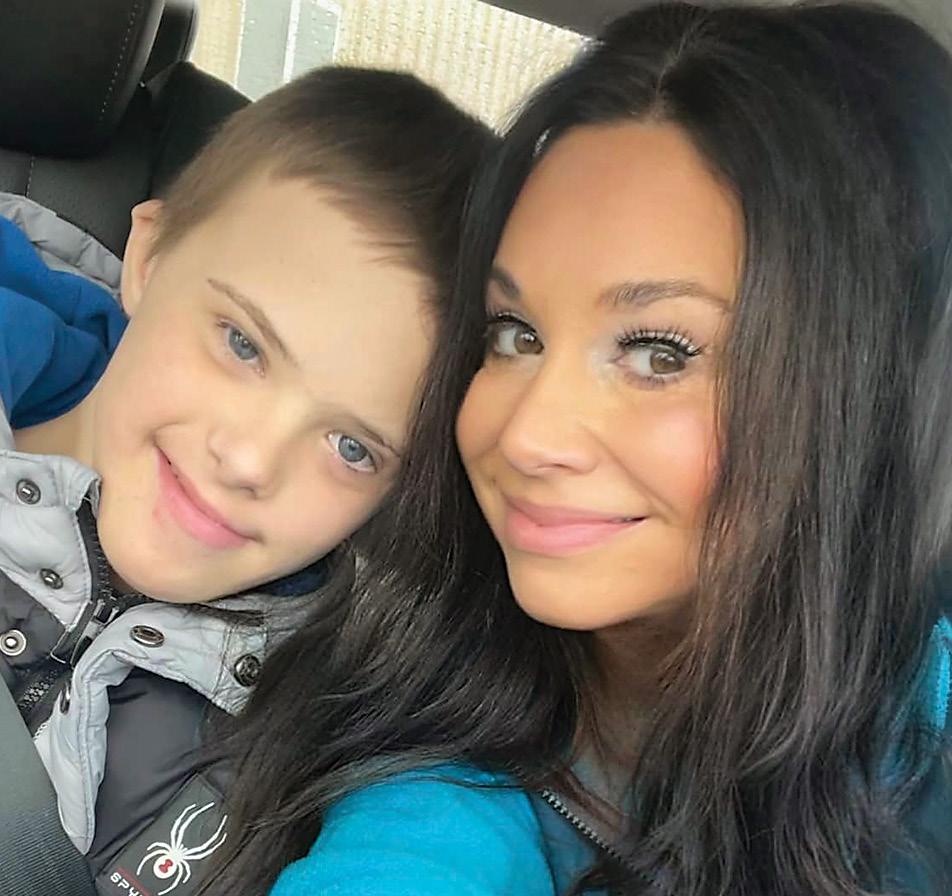
Previously located in Oberlin then Amherst, Downs on the Farm now
operates from Castalia Farms, a renowned former corporate retreat center located in Castalia, just south of Sandusky. As a realtor, Hodges has an eye for locations, and her vision for expanding the farm and its reach became reality when she purchased the property. The farm has become a sanctuary for animals and people alike. More than 50 rescue animals include goats, alpacas, cows, pigs, deer, bunnies, tortoises, chickens and horses. Families, camps and school field trips are welcome to visit and tour, interact with the animals,
and water and harvest produce.
Hodges says there are therapeutic benefits of the farm activities, from strengthening muscles and motor skills to joint attention, language and following directions — all while building confidence. She shares a couple examples: A child with limited arm strength and mobility may find combing the hair of a bunny on his or her lap more enjoyable than traditional exercises. Other children can use saddle equipment to practice following stepby-step instructions and build memory, or walk
the ponies through the obstacle course. Children also have fun spraying the alpacas with water from the hose to cool them off on hot days. Additional social skill-building activities on the farm include scavenger hunts centered around trails and the lake.
“I think all kids that come to the farm leave with more compassion for others,” Hodges observes. “They see rescue animals without all their limbs or that don’t see well and they start to understand differences. The animals need care and feeding,
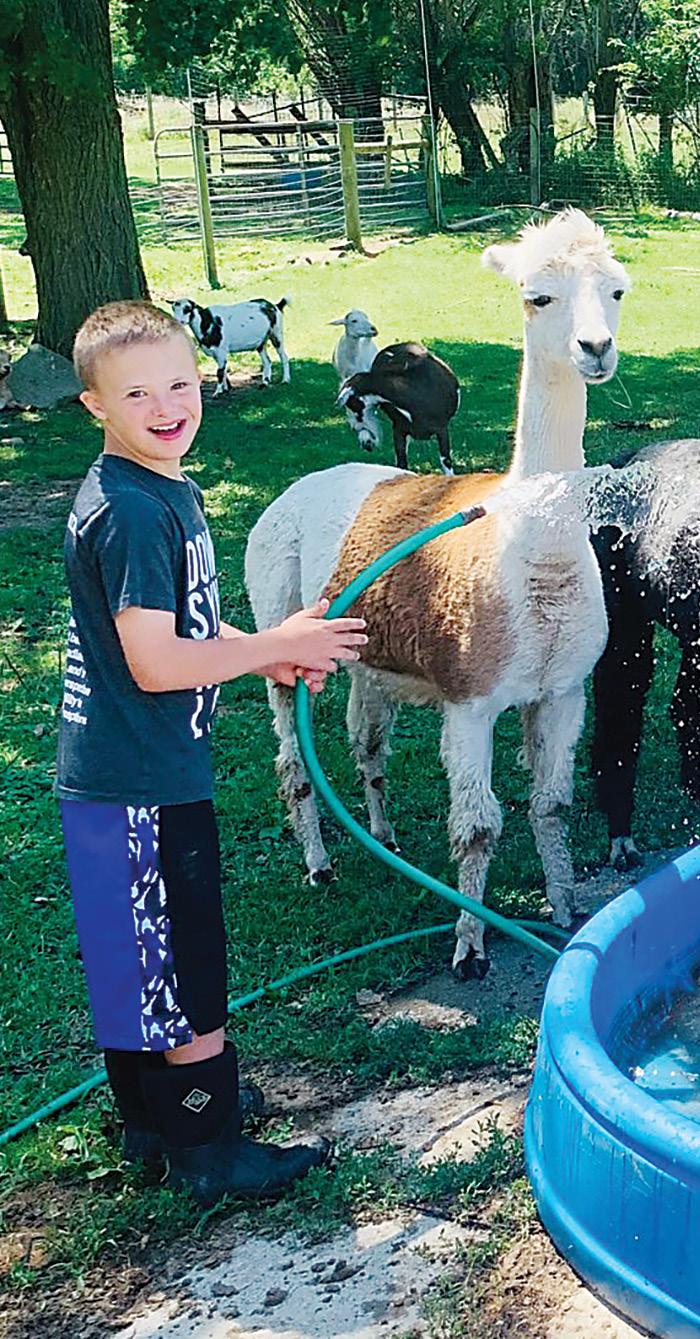
44 livespecial.com 2022-23 PEOPLE TO KNOW
Shawna and Grady Hodges.
PHOTOS COURTESY OFSHAWNA HODGES
brushing and exercise, so they start appreciating responsibility.”
Hodges oversees the entire operation of Downs on the Farm with one person on staff, and they rely heavily on volunteers and donations. Her sons also are extremely involved, with Mitchell’s latest project being fencing. In addition, events like family barnyard yoga are offered to support the nonprofit.
“I’ve taken an enormous leap of faith in purchasing this new property and hope we get the support needed to maintain it and continue
to do good around us,” Hodges says. “Handicap accessible pads lead around to the buildings, and we are working to create a fundraiser to install an accessible restroom.” She also hopes to fulfill the need to expand animal housing and fencing, as well as add a second septic system.
Children learn about nature and animals while enjoying the connections made with animals, adults and their peers on the farm. Animal assisted activities range from playing with and petting animals to grooming and feeding them.
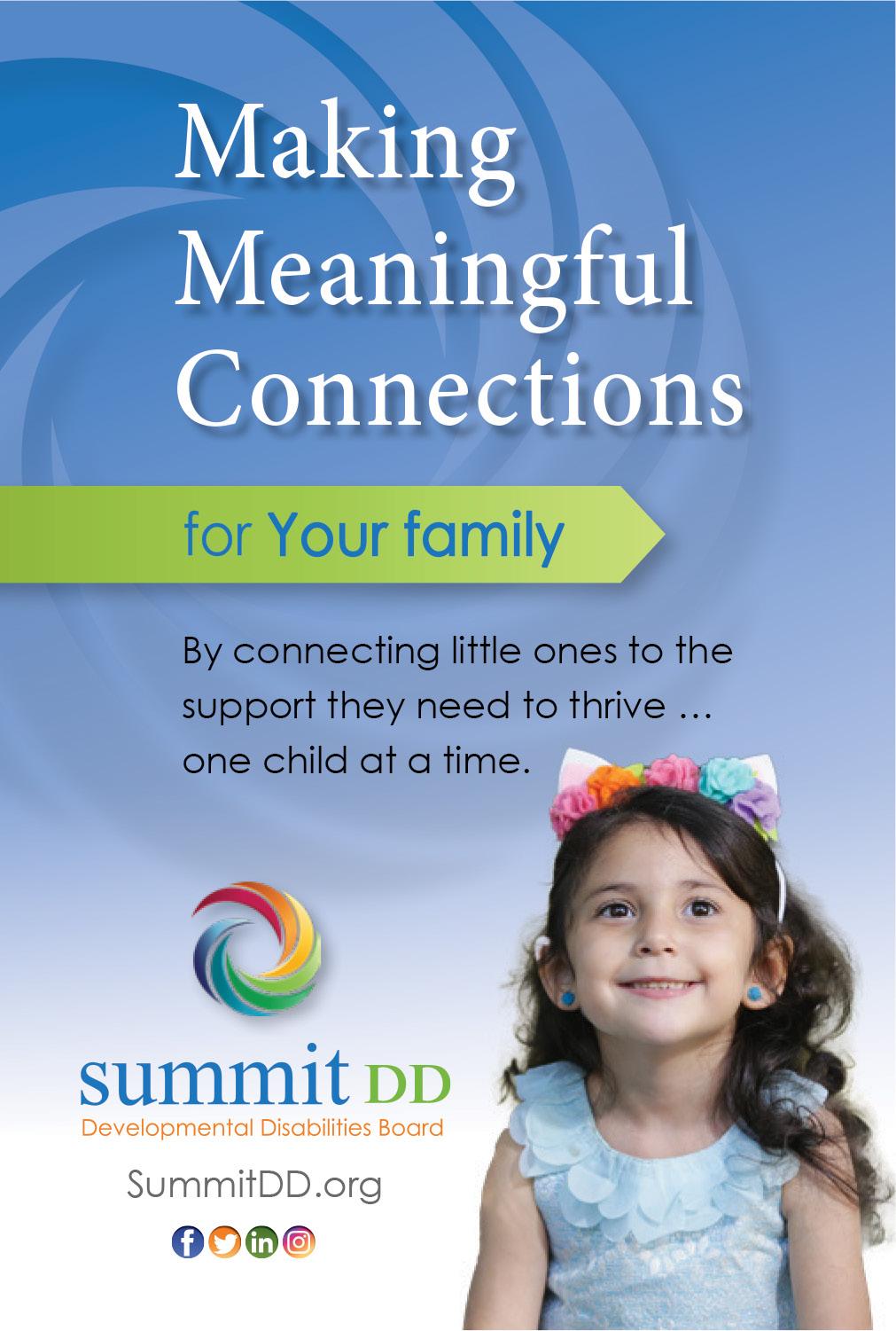
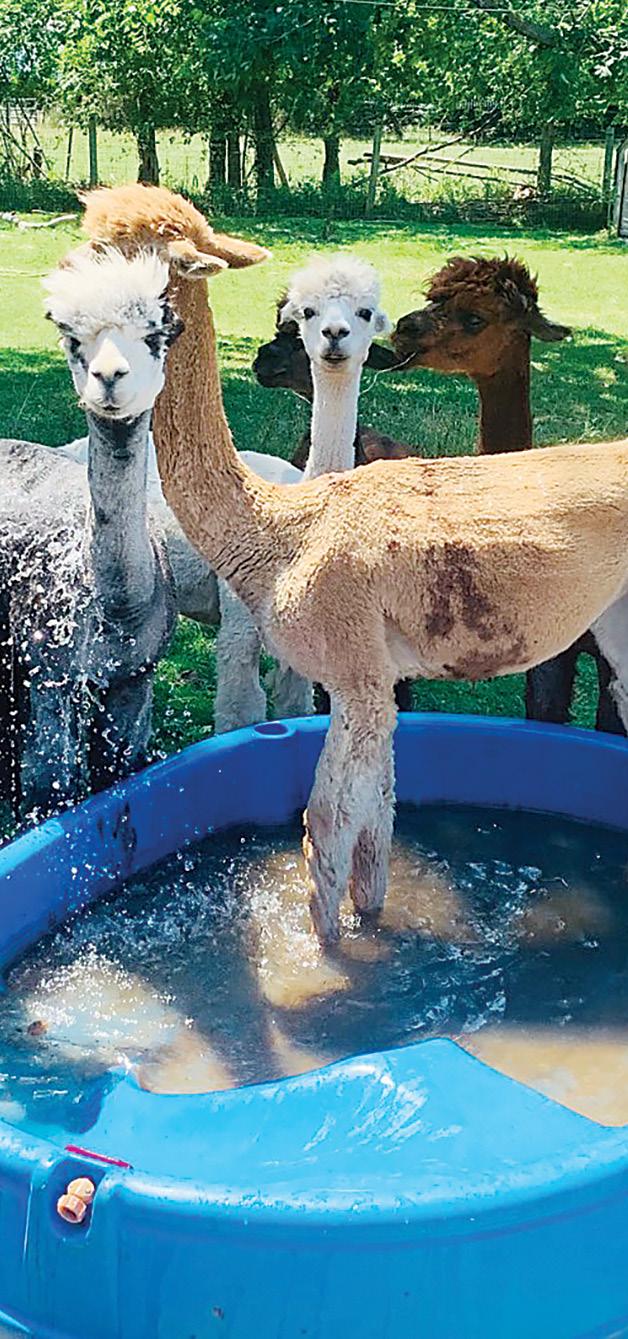
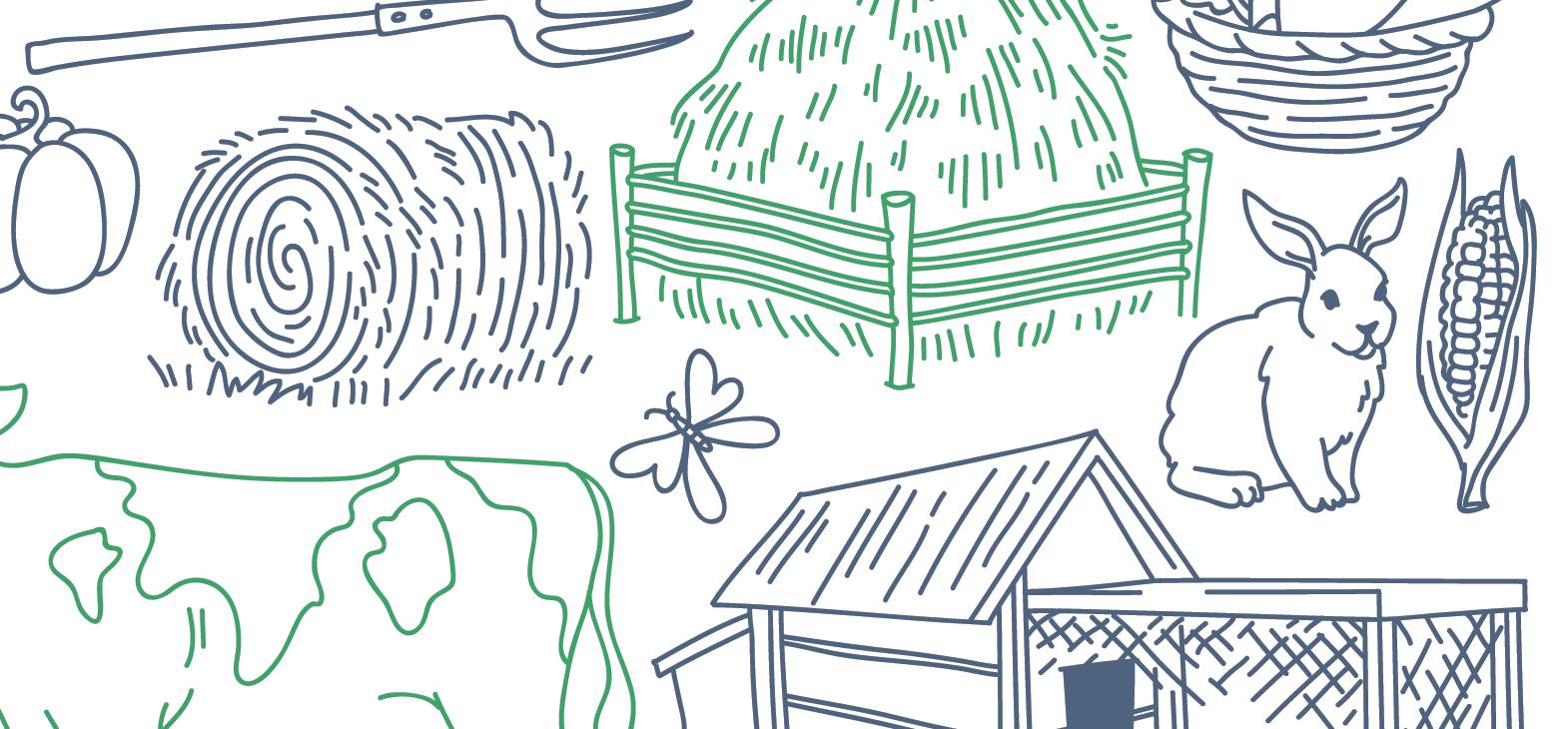
“Spending time with the animals is a great way to learn compassion and feel unconditional love from a furry friend,” Hodges emphasizes. “It is a special kind of connection that transcends any communication barriers.”
Downs on the Farm is located at 7101 Heywood Road in Castalia, Ohio. Volunteer opportunities exist to care for animals, staff events, serve on the board and more. To schedule a visit or event, sponsor an animal, donate or volunteer, email downsonthefarmohio@ gmail.com, or text or call Shawna Hodges at 970-397-2010. isit downsonthefarm.org or find them on Facebook and Instagram @ downsonthefarmohio and @castaliafarms.
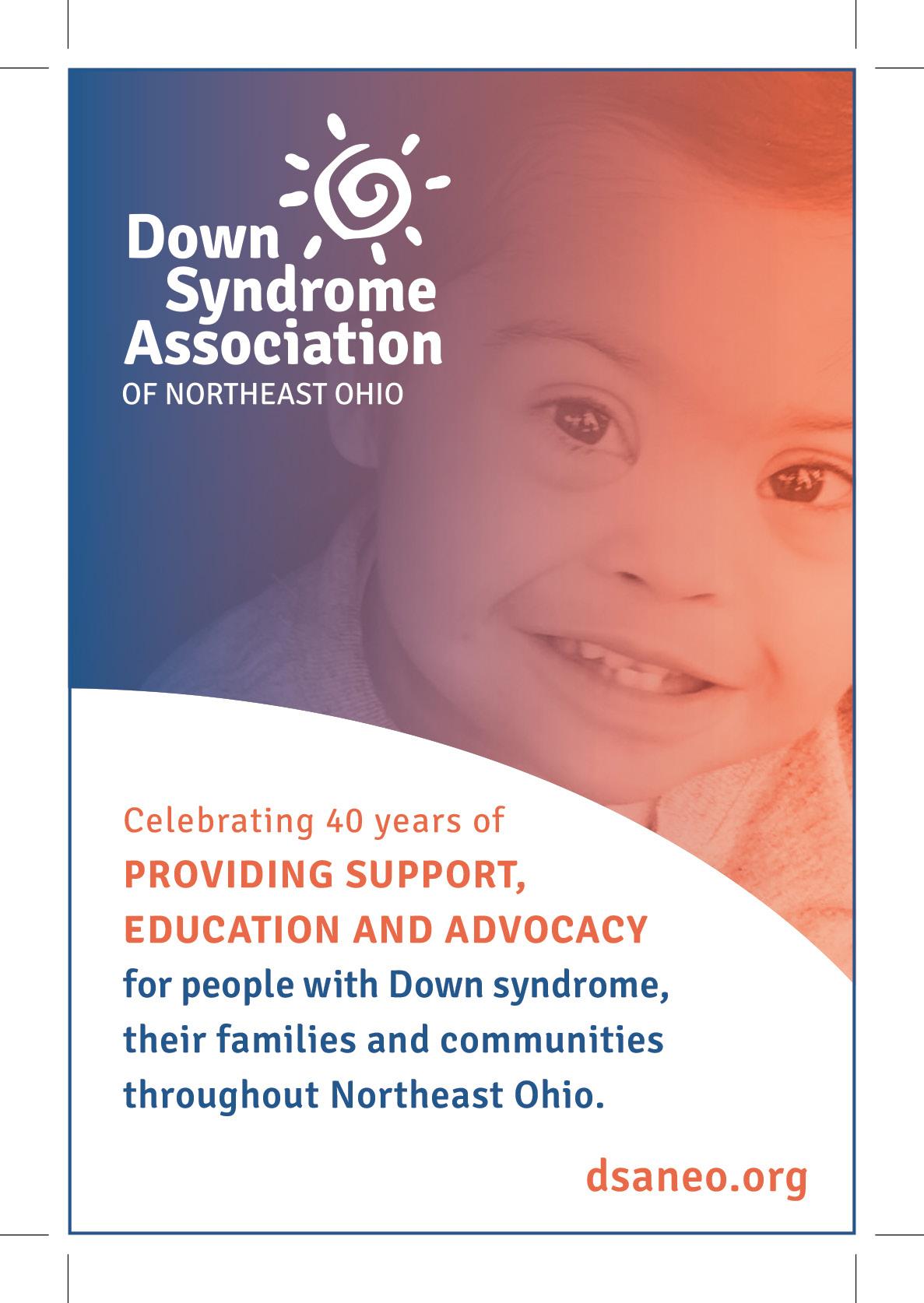
Making Better Candy and Work Opportunities
Peaceful Fruits Founder and CEO Evan Delahanty turns superfood into social good. From the Amazon Rainforest to a farmer’s market in Peninsula, and now Barberton, he has built the snack company on Peace Corps principles, community connections and purposeful employment of people with developmental and emotional differences.
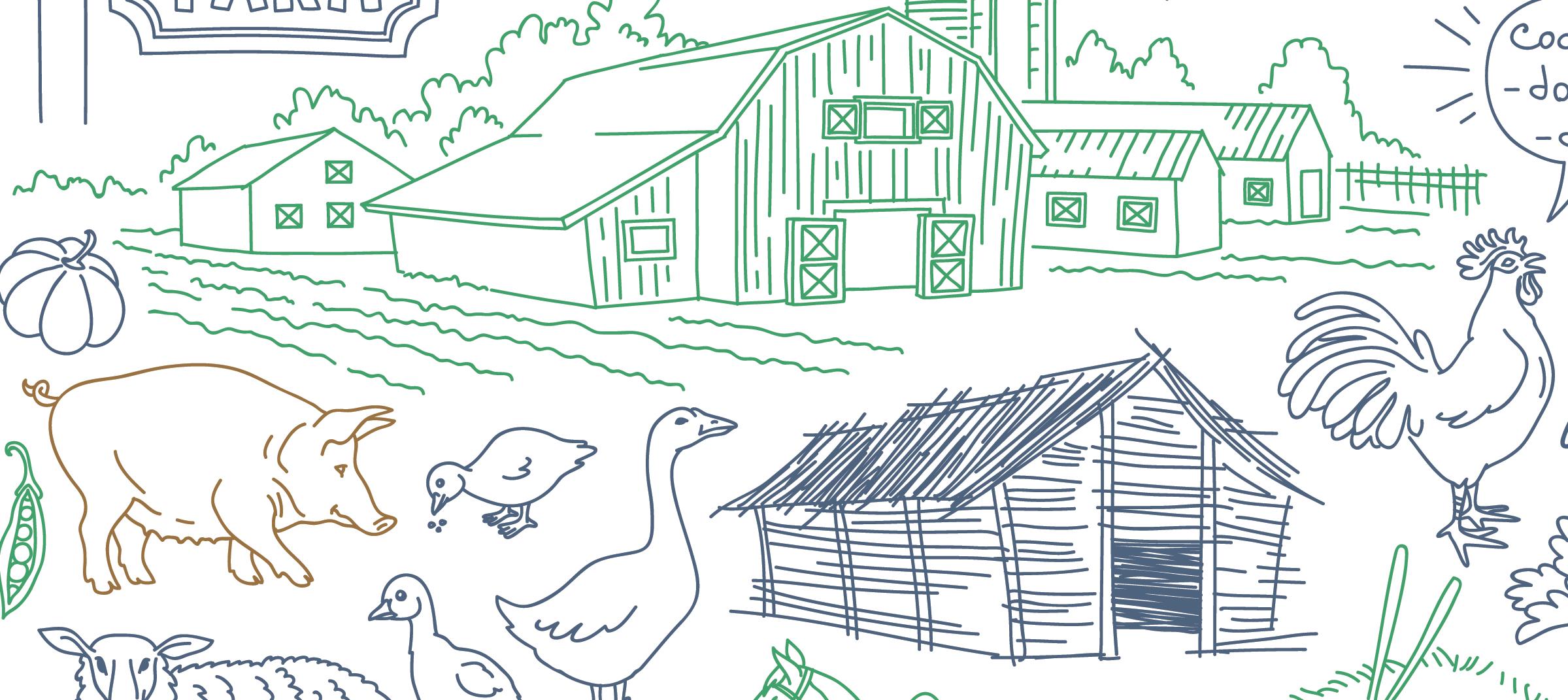
“When I met A.J., working with the special needs community became part of our mission,” Delahanty says. A.J., who has Down Syndrome, began applying sticker labels to fulfill initial orders. What started as a family affair working around the dining table once a week became an ongoing partnership with The Blick Center where A.J. has long been receiving services.

Product offerings are also expanding, and now range from the original fruit strips to re-imagined candy classics and fun new creations, including peel-n-eat stickers shaped
like unicorns and dogs as well as fruit tapes, dots, dips, laces, stacks, apple spirals and more, all made with 100% real fruit and no added sugars, non-nutritive sweeteners, additives or color dyes. All products are organic, non-GMO, vegan and gluten free. The snacks are made in allergy-friendly facilities that prevent cross contamination. (Those with nut allergies should, however, avoid snacks that are packaged with their selfcontained peanut butter dip.)
“Meaningful employment is a fundamental part of adulthood for people with and without disabilities,” says Eileen Love, occupational therapist (COTA) employed by The Blick Center, which provides comprehensive services to people with developmental disabilities. “It provides a sense of purpose, shaping who we are and how we fit into our community. It’s a part of building a healthy lifestyle as a contributing member of society. People with disabilities who want to work should be provided the opportunity and support to work competitively within the general workforce in their pursuit of happiness. Many of our clients have never been successful at a paid community job –either never had the support to work
competitively or have failed on multiple occasions when given the opportunity to work in the community.”
Love has been working with Peaceful Fruits via The Blick Center since February 2018 when the company moved to Barberton from Hattie Larlham’s (now closed) shared commercial kitchen space in Akron. However, the center has been involved with Peaceful Fruits since the very beginning.
Peaceful Fruits’ partnership with The Blick Center sets individuals up for success through a collaborative approach and onsite occupational therapy support. Love explains, “My job is to evaluate the work environment, the job tasks, and the client’s skills to identify the potential barriers and supports needed to succeed. I have been able to modify job tasks and match the right clients with the right tasks so that they can all be successful. With the constant flow of teachable moments, our clients have learned new skills and found strengths and talents that they weren’t aware of previously. You can tell by their smiles, they feel a real sense of accomplishment. Knowing that they’re making a difference, helping others and completing a full day’s work in an inclusive workplace has built up their confidence and sense of self-worth. Their faces light up instantly, it’s undeniable.”
The company has employed dozens of individuals over the years. While the number fluctuated during COVID
46 livespecial.com 2022-23
PEOPLE TO KNOW PHOTO COURTESY OF PEACEFUL FRUITS
Peaceful Fruits Founder and CEO (right) Evan Delahanty with first and long-standing production line employee A.J.(left).
and the move to Barberton, five are currently on the schedule working 9 a.m. to 2 or 3 p.m. daily.
“The Blick Center has been happy to support Peaceful Fruits in their growth because of the positive impact they have on our [Blick] clients, who have pride in earning a full-wage paycheck,” Love says. “However, I think, for a lot of our clients, it’s more about the therapeutic benefits of being on a team, being part of the ‘Peaceful Fruits’ family, than getting a paycheck. Our clients work really hard and will do anything to help Evan. He’s like their hero.”
Production line employee Kim Smith shared her experience in a video when Peaceful Fruits was named an eBay Everyday Hero in 2018. “When I walk in the door here it gives me a sense of pride and happiness…” she says. “[Evan] understands what it’s like working with people with disabilities. He’s accommodating. He’s flexible. This job at Peaceful Fruits has helped me learn that I am capable of anything.”
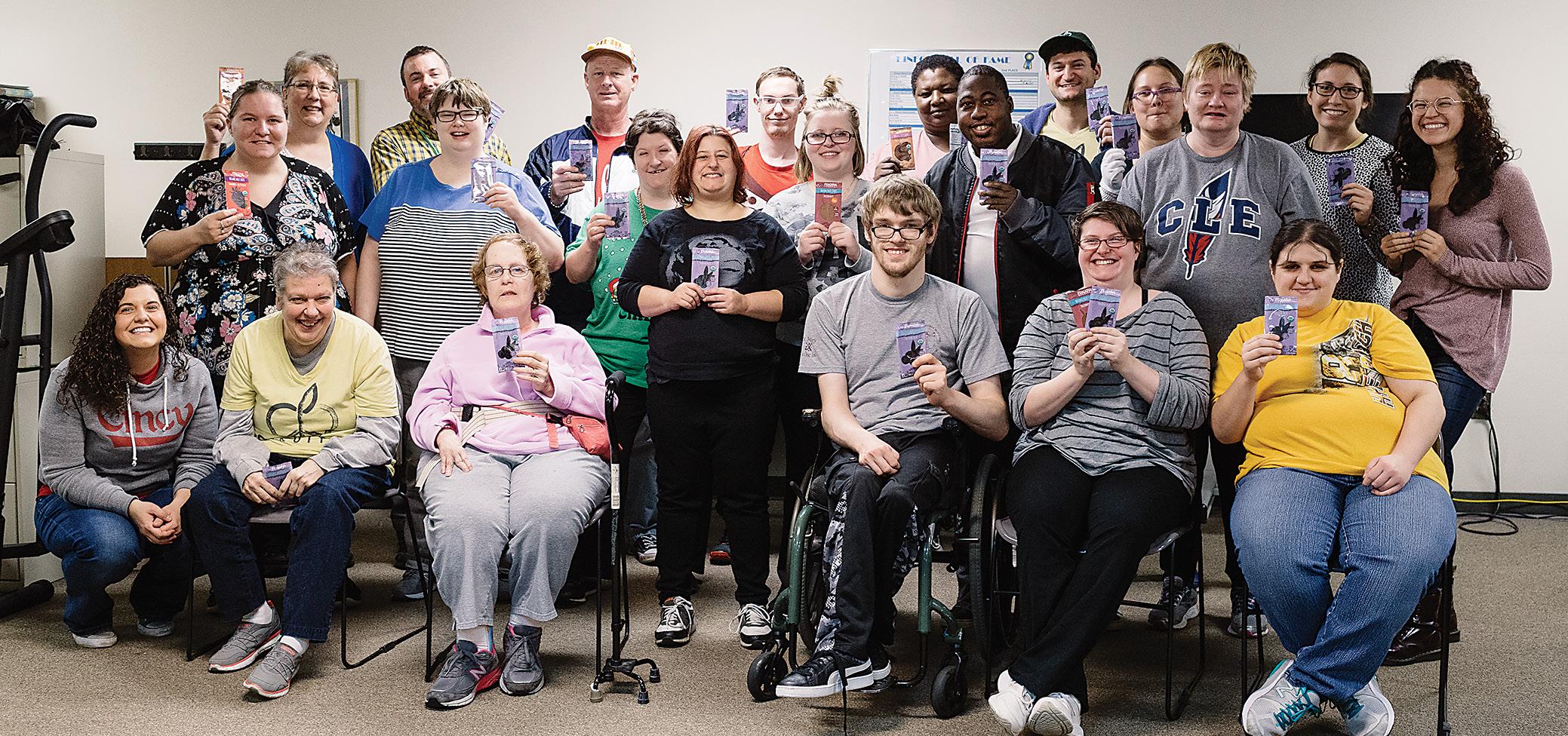
To A.J., Evan is also a friend who went with him to see Star Wars in the theater.
Evan says working with A.J., Kim and the whole team is “such an opportunity. They are so motivated
and add real value. They are there 100 percent, and it keeps me going 110 percent every day.”
Love adds, “To our [Blick] clients, Peaceful Fruits is more than a job, it’s a purpose – empowering them to achieve their goals and reach their full potential. They have all come so far, I’m extremely proud of them!”
To help make more peaceful lives and a more peaceful world, Delahanty is launching a foundation focused on mental health. “The Peaceful Fruits Foundation will work to address the soaring rate of stress, anxiety and depression,” he explains. “We’re creating education tools and programs to help even the youngest kids learn lifelong mental health skills. We pick up insights from scientists and psychologists and pass them along in fun and memorable ways, including product packaging, social media, and age- and situation-appropriate mindful emails for students pre-k to college, parents, educators and health professionals.”
Delahanty believes in “meeting people where they are, and making it easier to do the right thing and improve lives.” He says, “we’re not trying to replace candy but move it a generation forward. It’s more than just ingredients – it’s the whole package,
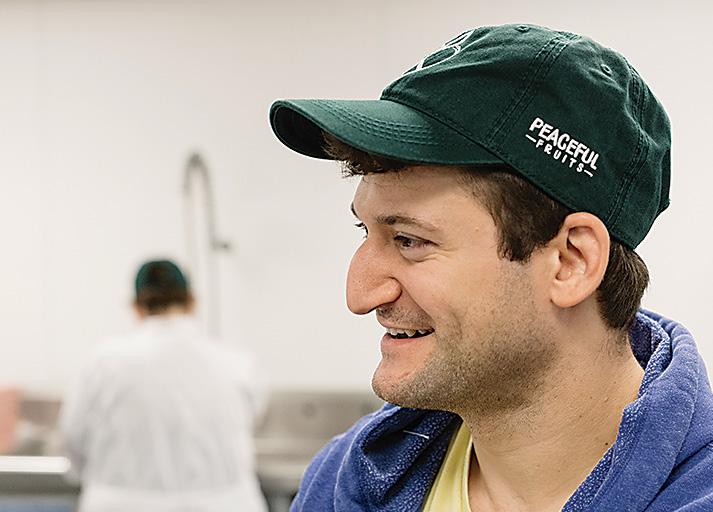
the values, starting and changing conversations.”
Peaceful Fruits is a Certified B Corporation held to the highest standards of environmental and social responsibility. The organic, free-trade snacks are made with vigorous regard for ethical sourcing, sustainability, employee welfare and community impact. Products are available for purchase at a growing number of regional and national retailers,
For more information on the Peaceful Fruits Foundation, visit .peacefulfruitsfoundation.org.
The Blick Center serves early childhood, school age and adult individuals with developmental, behavioral, physical and mental health conditions from locations in Akron, Fairlawn and North Canton. The nonprofit (formerly named Blick Clinic) has been helping individuals for over 50 years. For more information, visit blickcenter.org.
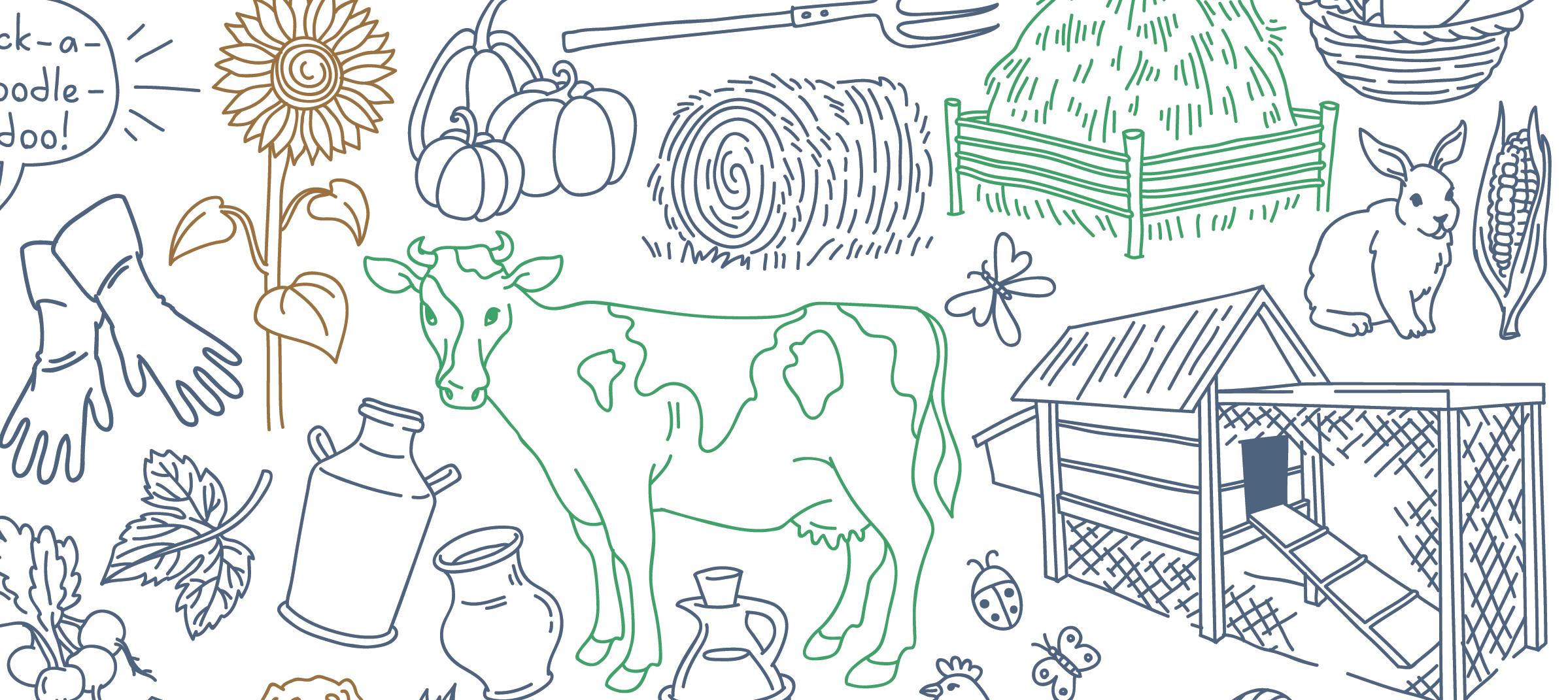
PHOTOS COURTESY OF PEACEFUL FRUITS livespecial.com 2021-22 47
The Peaceful Fruits employees, which the organization provides an opportunity for all abilities to work.
Beck Center for the Arts
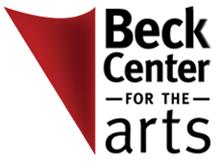
Each participant in Beck Center’s Creative Arts Therapies program receives attention that is individualized, with personallydesigned goals tailored to meet their needs. Staffed by board certified arts therapists and professional adapted instructors, Beck Center’s program is the first of its kind in the state of Ohio. 216-424-7634, beckcenter.org/education/creativearts-therapies
Cleveland Hearing & Speech Center

For 100 years, Cleveland Hearing & Speech Center has been the premier provider of programs and services to those who are deaf or hard of hearing, have difficulty speaking, or have other language or literacy delays and disorders. Its vision is a community where every individual communicates effectively. www.chsc.org
Cleveland Metroparks
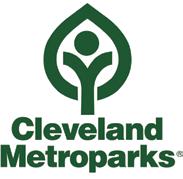
It’s time to explore Cleveland Metroparks. Discover trails to hike, bike, or run. Experience the wonder of the animal kingdom at Cleveland Metroparks Zoo. Play any of 8 scenic golf courses throughout greater Cleveland. Dine on the river at Merwin’s Wharf. See the city like never before from the shores of Lake Erie. Take time to explore clevelandmetroparks.com.
Connecting for Kids
It provides education and support to families in Cuyahoga, Lorain and surrounding counties who have concerns about their child. It serves all families, including children ages 12 and younger with and without formal diagnoses. CFK offers presentations by professionals and support groups. Its staff works one-on-one as part of the “Ask Us” program to provide local resources and connections to other families. Resources also are available on its website, its online service provider directory and at fairs. 440-570-5908, connectingforkids.org
Cuyahoga County Board of Developmental Disabilities


The Down Syndrome Association of Northeast Ohio
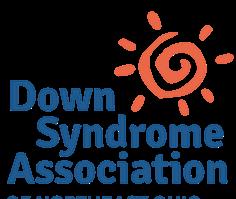
It provides support, education and advocacy for individuals with Down syndrome, their families and communities. DSANEO is the primary resource for families and communities regarding Down syndrome, where all people with Down syndrome are accepted, included and empowered. DSANEO supports individuals with Down syndrome through their lifetime with family support programs, education enrichment for toddlers to teens, life skills classes, social programs, medical outreach and advocacy. DSANEO supports more than 1,000 individuals with Down syndrome and their families throughout 16 Northeast Ohio counties. 216-447-8763, dsaneo.org
Education Alternatives
It provides special education services to hundreds of K-12 children in eight sites throughout Northeast Ohio. EA uses a trauma-informed approach to treat intensive behavioral challenges and incorporates the ACE scores of each child into their individualized plan. Children receive both group therapy and academics, and may also access individual counseling, behavior supports and psychiatry. REACH Behavioral Health provides the therapeutic services in each Education Alternatives. easchools.org
Eisner Gohn Group
A leading resource for risk protection strategies with life and disability insurance. Its team has the experience and expertise in these areas to craft and deliver cost effective and efficient solutions for clients. eisnergohngroup.com

Fine Arts Association
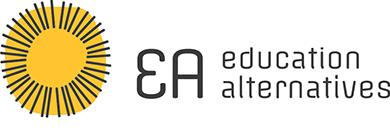

Guided by its values of equity, integrity, growth
Friendship Circle of Cleveland
It sparks friendship, connection and support for children of all abilities, their families, and teen volunteers. Children, teens and young adults with developmental disabilities are provided a unique opportunity to make friends and enhance their social skills through a variety of interactive programs alongside their peers. Teen volunteers are given a unique opportunity to experience joy and fulfillment from helping others, while also learning how they can help make the world more inclusive and accepting. Friendship Circle offers a safe place for these friendships to form organically, while also providing fun activities, field trips, community integration, holiday celebrations, family support, sensory stimulation, and so much more. Every child deserves a friend! Contact bree@friendscleveland. com, call 216-377-3000 ext. 1008, or visit friendscleveland.com.
GiGi’s Playhouse Cleveland
An achievement center located in Lakewood that changes lives through consistent delivery of almost 20 educational, therapeutic-based, and career development programs for individuals with Down syndrome, their families and the community. Through these free programs and through the Generation G Campaign for global acceptance, GiGi’s Playhouse and its network of 55 Playhouses across the U.S. and Mexico empower families by maximizing opportunities for daily achievement and lasting acceptance. To ensure lasting acceptance, they must show the world what individuals with Down syndrome are truly capable of achieving as students, co-workers, volunteers, friends and valued members of their communities. The program outcomes help advance this vital social impact goal. gigisplayhouse.org/cleveland
The Golden Key Center for Exceptional Children Inc.
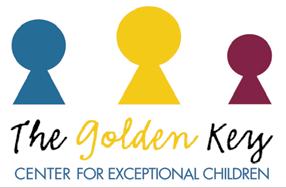
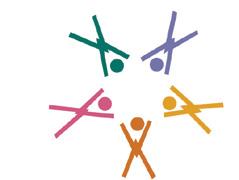
It proudly supports and empowers people with developmental disabilities of all ages to live, learn, work and play in the community. For more information on services and resources, call 216241-8230 or visit cuyahogabdd.org.

and community, it seeks to create and discover beauty to foster a community empowered by the arts. FAA offers arts education programming in dance, music, theatre, visual arts sand Creative Arts Therapies for all ages and ability levels. In addition to arts education, The FAA Performance Department creates opportunities for members of the community to be involved in every aspect of the theatrical experience. From family musicals to performances by professional musicians, the dynamic performance season has something for everyone. 440-951-7500, fineartsassociation.org
The Golden Key Center for Exceptional Children Inc. is a 501(c)3 organization. This specialized nonpublic charter school is ODE-accredited and its mission is to provide quality education and intervention services for children with autism and developmental disabilities. It hosts a school program for classes kindergarten through 8 th grade. Additionally, it offers a preschool program that provides early intervention to those on the autism spectrum ages 3-5 years old. The Golden Key is an approved provider of both the Autism
SPECIAL ADVERTISER LISTINGS 48 livespecial.com 2022-23
Scholarship and the Jon Peterson Scholarship. The Golden Key has no out-of-pocket expenses for its families for any education and therapies services. 330-493-4400, goldenkeyschool.com
Help Me Grow
A system of supports for pregnant women, caregivers with new babies, and families with young children who have developmental delays and disabilities. Call 216-930-3322, 440-389-3322 or 1-800755-GROW, or visit helpmegrow.org
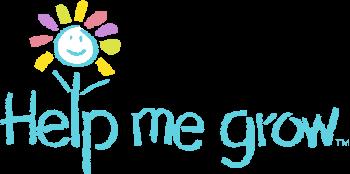
Julie Billiart Schools

With campuses in Akron, Lyndhurst and Westlake, this network of K-8 private, Catholic schools educates and empowers children with learning differences. Students with mild to moderate autism, ADHD, dyslexia, anxiety and other learning differences thrive with JB’s small class sizes, onsite therapies, and direct intervention. Visit the website to apply, register for an open house, or learn more about its curriculum. juliebilliartschool.org
Medicore Transport & Achievement Centers
a direct-care provider that services Cuyahoga county with two achievement centers, non-medical transportation, and residential care services. Its mission is to enhance its consumers’ lives through growth, development, and exploration that enables them to live an independent and fulfilling lifestyle. Contact Medicore in Cleveland or Parma Heights at 877-706-4407, contactus@ medicoretac.com
Medina County Board of Developmental Disabilities
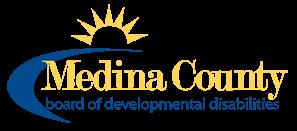
A community resource responsible for connecting, coordinating and funding services for individuals of all ages with developmental disabilities. It helps with everything from early intervention and education opportunities for children to employment and community inclusive living for adults so they can live, learn, work and socialize in the community. mcbdd.org
Milestones Autism Resources
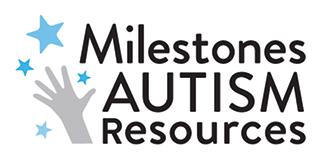
It improves the lives of autistic individuals, families, caregivers and professionals by educating, coaching and connecting them to resources. Providing an
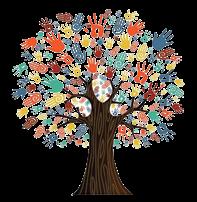
annual autism conference, a free helpdesk, consultations and training, and a website with more than 1,400 resources, Milestones is here to support individuals at every age, stage and ability. The groundbreaking new Milestones Autism Planning Tool walks you step-by-step through everyday life issues, from early childhood through adulthood. The MAP is truly your online guide for life with easy to navigate, practical strategies and skill-building tips. It will help you plan and prioritize and can be customized to any age, ability and interest. Check it out at milestones.org/map. For more information, visit milestones.org or call the Milestones free autism helpdesk at 216-4647600 ext. 200. To connect with a Spanish speaker, call 216-464-7600 ext. 5.
Pauken Legal Services, LLC
Planning for All the Seasons of Life® — They provide clients with wise, compassionate, and expert guidance to create appropriate estate plans and special needs trusts that provide for the care and security of your family, now and in the future. Their accessible office is located just off Route 422, and Zoom appointments are available. Call them today for a consultation, or book online. 440-4680003, paukenlegal.com.
SAW, Inc.
Started in 1969, the non-profit organization serves the needs of adults with developmental disabilities by offering vocational rehabilitation services, group employment, and adult day-service facilities in Northeast Ohio. sawinc.org
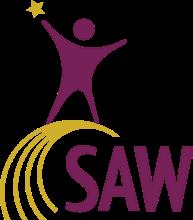
Stride Mobility
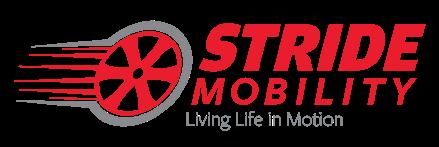
Summit County Developmental Disabilities Board (Summit DD)
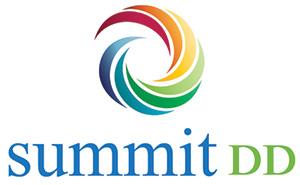
A resource that makes meaningful connections for more than 4,700 children and adults with developmental disabilities in Summit County. Our levy-funded Agency provides and coordinates essential services people rely on each day. Whether it's early intervention services for a newborn child or retirement services for a senior citizen, Summit DD provides a lifetime of support for those eligible for our services. Learn more about how we help set people up for success at SummitDD.org or by calling 330-634-8000.
Stark County Board of Developmental Disabilities (Stark DD)

It helps more than 3,700 Stark county children and adults with intellectual/developmental disabilities by “supporting choices and creating opportunities.” The services provided by Stark DD help children learn to reach their full potential. Help parents become more confident and support their child’s development. Help adults to live comfortable, independent lives. Stark DD’s services not only provide the assistance needed to improve a life when needed, they help provide support to last a lifetime. Stark DD provides help for good. For resources at all life stages, explore our Navigation Tool at starkddnav.org. 330-477-5200, starkdd.org
Thrive Through Tennis
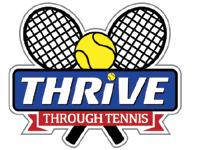
A custom rehab wheelchair and DME company, specializes in personalized seating and wheelchair assessments for all age groups throughout Ohio and surrounding states. They provide assistive technology to all ages with disabilities such as Cerebral Palsy, Spina Bifida, Muscular Dystrophy, Parkinson’s, ALS, Huntington’s, and neurologic and spinal cord injuries. From children to octogenarians, Stride Mobility personally delivers customized wheelchairs, strollers, and scooters to the individual’s home or residence, along with education and service. If you need equipment customized to your specific requirements, call the team and a certified Assistive Technology Professionals will come to you, 419-616-6017, stridemobility.net
A nonprofit organization that promotes participants to play Tennis to improve their Health. They see Results and get Inspiration to be their best! We Value individuals of all ages and abilities. We provide Education with physical, mental and psychosocial benefits. THRiVE runs Adaptive, Wheelchair and Homeschool Tennis programs at Center Court Tennis Club 1 Eagle Valley Court, Broadview Heights OH 44147. For more information call 440-838-5600 or visit our website Thrivetennis.org.
UCP of Greater Cleveland
The mission of UCP of Greater Cleveland is to empower children and adults with disabilities to advance their independence, productivity and inclusion in the community. UCP serves individuals with a broad range of disabilities through two Centers of Excellence: LeafBridge for children and OakLeaf for adults. Visit ucpcleveland.org or call 216-791-8363 to learn more.
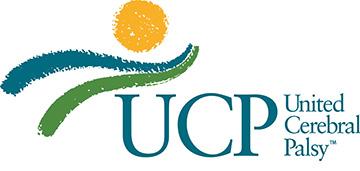
A PROJECT OF NC J W CLE STRONG WOMEN POWERFUL VOICES livespecial.com 2022-23 49
1,200 PLUS PROVIDERS AND RESOURCES IN NORTHEAST OHIO.
Assistive TECHNOLOGY Apps
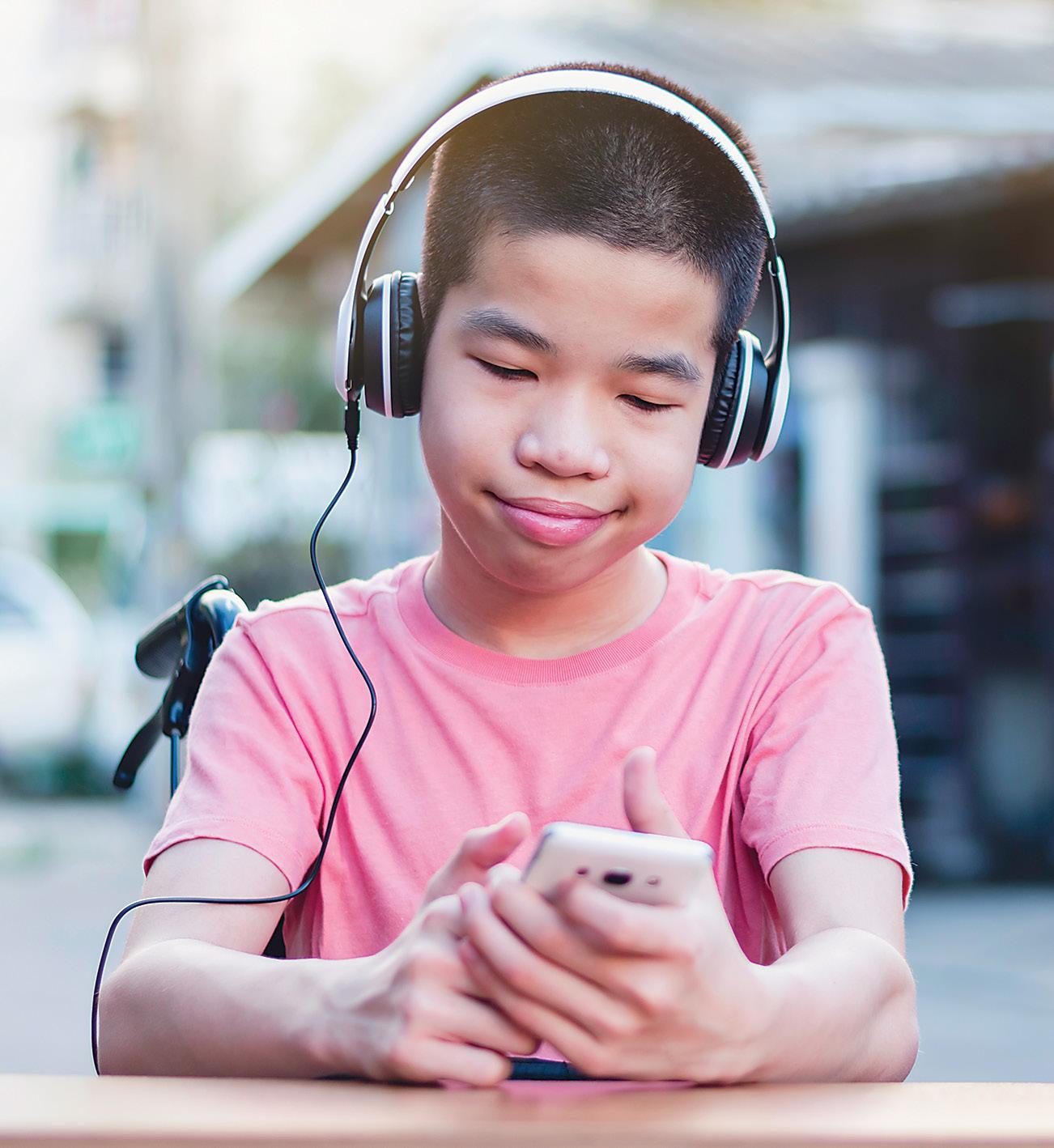 By Mike Daugherty
By Mike Daugherty
The digitally rich world in which we live today is filled with software and smartphone applications that enable people with disabilities to learn, communicate and perform activities that would otherwise be challenging. Software like this is referred to as assistive technology. Here are nine assistive technology applications for individuals with dyslexia, communication disorders, visual impairments, and other learning disabilities.
GHOTIT —
A comprehensive suite of applications designed to help those with dyslexia, dysgraphia and other learning disabilities. ghotit.com
PROLOQUO2GO

— This app helps nonverbal children communicate by touching symbols or text on the screen to produce a sentence that is read aloud. There is a text-only version available, as well. apps.apple.com/ us/app/proloquo2goaac/id308368164
CHOICEWORKS —
An app designed to help children who thrive on daily routines, as well as improving skills such as taking turns, not interrupting, and waiting. apps. apple.com/us/ app/choiceworks/ id486210964
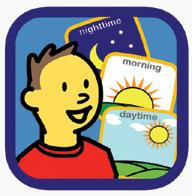
DRAGON — This app allows users to speak out loud and the software then expertly transcribes the audio into text. nuance.com/ dragon.html
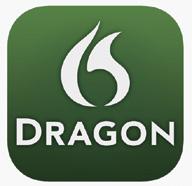
QUESTIONIT — This app helps children with autism improve language concepts. Students answer who, what, when, why and how questions using sorting and matching to understand concepts. apps.apple.com/us/app/ questionit/id458737797
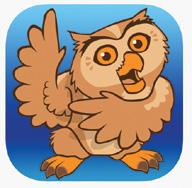

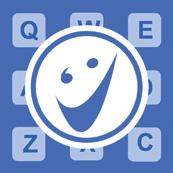
EQUATIO —
Part of the Read & Write family of textto-speech tools, Equatio helps users write equations through dictation. texthelp.com/ en-gb/products/ equatio
ARTICULATION STATION — This easy-to-use app helps with speaking and pronunciation with a targeted approach to the majority of language sounds. apps.apple.com/us/ app/id467415882
NATURALREADER —
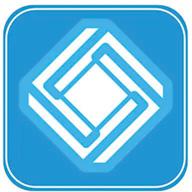
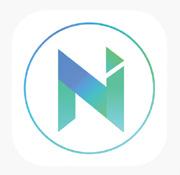
A text-to-speech tool that will read aloud the text from websites, PDFs, and even traditional books. The app is fantastic at reading in a way that is natural, not robotic. naturalreaders.com
TALKING CALCULATOR —
A full featured, user friendly, customizable calculator that reads aloud both the input and calculation results. apps. apple.com/us/app/ talking-calculator/ id424464284
livespecial.com 2022-23

50
Mike Daugherty is a husband, father of three young children, author, speaker and Google Innovator. He is a certified educational technology leader who has served in a variety of roles through his 18-year career in public education. Currently, Mike is the director of technology for Chagrin Falls Exempted Village Schools in Northeast Ohio.
TECH

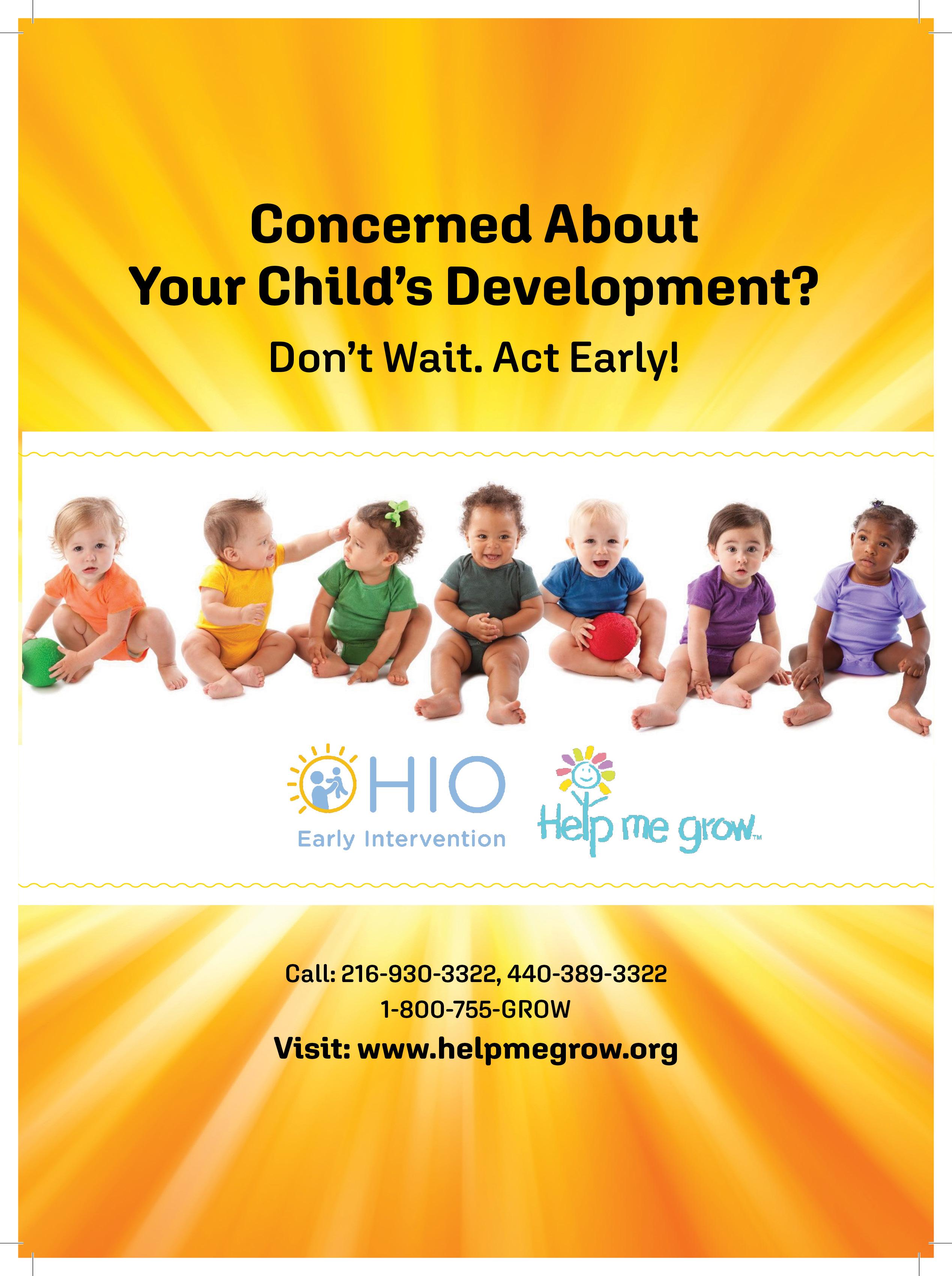





































 PHOTO COURTESY OF THE CITY OF WESTLAKE
PHOTO COURTESY OF THE CITY OF WESTLAKE


















































































 By Vince Guerrieri
By Vince Guerrieri



























































 By Mike Daugherty
By Mike Daugherty






















